Edwin O. Reischauer Institute of Japanese Studies
Harvard University
2016-18 Biennial Report
1
The Edwin O. Reischauer Institute of Japanese Studies at Harvard University supports research on Japan and provides a forum for related academic activities and the exchange of ideas, bringing together Harvard faculty and students, as well as scholars and visitors from other institutions, to create one of the world’s leading communities for the study of Japan.
Our Goals
• Cooperate with the Asia Center and other related programs at Harvard to increase the public’s understanding of Japan and Asia in the United States and abroad
• Expand and enrich research and teaching on Japan throughout the University
• Strengthen the ties between Harvard University and Japan
Edwin O. Reischauer Institute of Japanese Studies
Harvard University
Center for Government and International Studies, South Building 1730 Cambridge Street, Cambridge, Massachusetts 02138
Phone 617.495.3220
Fax 617.496.8083
Email rijs@fas.harvard.edu
Website http://rijs.fas.harvard.edu/
2
EALC
EAS
Fairbank
FAS
GSAS
of Arts and
School of Arts and
GSD Graduate School of Design
GSE Graduate School of Education
HAA History of Art and Architecture Department
HBS Harvard Business School
HEAL History and East Asian Languages (Ph.D. Concentration)
HKS
Kennedy School
HSPH Harvard School of Public Health
HYI Harvard-Yenching Institute
HYL Harvard-Yenching Library
KI Korea Institute
RI Reischauer Institute of Japanese Studies
RSEA Regional Studies-East Asia (M.A. Program)
SAI South Asia Institute
USJRP Program on U.S.-Japan Relations
VES Visual and Environmental Studies Department
WCFIA Weatherhead Center for International Affairs
Contents About the Institute Edwin O. Reischauer ................................................... 2 Home in CGIS 3 Director ........................................................................... 4 Committees of the Institute .................................... 4 Faculty Announcements 6 RIJS Website ................................................................... 8 Advancing Research in Japanese Studies Support for Faculty Research ............................... 10 Visiting Scholars ........................................................ 12 Graduate Student Associates-in-Residence 13 Postdoctoral Fellows ............................................... 14 Japan Forum .............................................................. 16 Other Seminars 19 Japan Disasters Digital Archive ........................... 22 Constitutional Revision .......................................... 23 Collaborative Study Projects 24 Conferences, Symposia, Workshops ..................... 25 Publications ................................................................ 31 Program on U.S.-Japan Relations 32 Harvard’s Libraries ................................................... 32 Art Exhibition: IRRESOLUTION ............................. 34 Supporting Harvard’s Educational Mission Opportunities for Harvard Undergraduates ... 36 Undergraduate Japan Experience 2016-18 .... 42 Support for Graduate Student Training ........... 44 Curriculum and Teaching ...................................... 46 Graduate Research and Training 2016-18 ....... 48 Courses on Japan at Harvard 2016-18 .............. 50 Ties to the Community Building Networks on Campus ............................ 54 Fostering Networks in the Community 55 Maintaining Ties Abroad ....................................... 56 Associates in Research............................................ 58 Administration Abbreviation Key
Asia Center CGIS Center for Government and International Studies Davis Davis Center for Russian and Eurasian Studies DRCLAS David Rockefeller Center for Latin American Studies
AC
East Asian Languages and Civilizations
East Asian Studies (Undergraduate Concentration)
Fairbank Center
Chinese
for
Studies
Faculty
Sciences
Graduate
Sciences
Harvard
About the Institute
Established in 1973 as the Japan Institute, the Reischauer Institute of Japanese Studies (RIJS) was renamed in 1985 to commemorate the retirement of Edwin O. Reischauer. The Institute is one of Harvard’s international and regional centers, all of which operate under a mandate to contribute to the university as a whole. Administratively, the Institute reports to the FAS Dean. Since 1997, the Institute has been part of the Harvard University Asia Center (AC) and has coordinated closely with AC and other associated units. Members of the RIJS Executive Committee also serve on the AC Executive Committee and Steering Committee.
Edwin O. Reischauer
October 1910-September 1990
Edwin Oldfather Reischauer was born and raised in Tokyo, the son of Presbyterian educational missionaries. At sixteen, he left Japan for Oberlin College, later taking up graduate work at Harvard where he studied East Asian history, including a five-year world study tour to Paris, Tokyo, Kyoto, and Beijing. He returned to Harvard with his wife Adrienne in 1938, received his Ph.D. in 1939, and taught in the Department of Far Eastern Languages until 1941, when the State Department and the Army recruited him to serve variously as a research analyst, organizer of Japanese language programs for the military, and translator of intercepted military intelligence. After his return to Harvard in 1946, Reischauer guided the development of a new curriculum in East Asian Studies and began his career as a prolific writer.
An article written by Reischauer in 1960 analyzing current tensions between the US and Japan caught the attention of US President John F. Kennedy, who appointed Reischauer as ambassador to Japan (1961-1966). Key to Reischauer’s ambassadorial outlook was the notion of “equal partnership” between the US and Japan. He and his second wife, Haru Matsukata, whom he had married after Adrienne’s death in 1955, gave priority to their ties with ordinary Japanese citizens and were enthusiastically received.
From his return to Harvard in 1996 until his retirement in 1981, Reischauer continued to teach, write, and initiate a myriad of projects to enhance US-Japan relations, deepening American consciousness of Japan and the outside world. All of these contributions continue today to guide the Institute that gratefully carries his name.
 Edwin O. Reischauer, pictured here with his wife, Haru.
Edwin O. Reischauer, pictured here with his wife, Haru.
2
Home in CGIS
Since 2005, the Reischauer Institute of Japanese Studies has been housed in the Center for Government and International Studies (CGIS), a complex designed to promote the crossing of boundaries and the forming of connections. RIJS shares the second floor of the CGIS South Building with the Korea Institute (KI) and the David Rockefeller Center for Latin American Studies (DRCLAS), and the Asia Center and many other Asiarelated programs are located nearby. Through CGIS, faculty, students, postdoctoral fellows, visiting scholars, and staff are seamlessly integrated into the dynamic international studies community at Harvard.
The spaces in CGIS South provided to graduate student associates-in-residence (GSAs), postdoctoral fellows, and visiting scholars promote interdisciplinary and cross-regional interaction. Each floor of the four-story building contains space with carrels assigned to graduate students affiliated with a regional studies institute and/or department. GSAs from different centers are mixed together, allowing for exciting academic exchange. RIJS postdoctoral fellows share office space with “postdocs” from other centers who have similar research interests. The postdocs enjoy a broader intellectual environment, and those who study more than one Asian country greatly benefit from proximity to other programs. Occupying a shared space, RIJS visiting scholars also have the opportunity to exchange ideas on various research topics, from political science to visual arts, literary studies to technology.

Art at the Institute
The CGIS South building also regularly features contemporary and traditional art exhibitions on the Japan Friends of Harvard Concourse. Listed below are those hosted by the Reischauer Institute. For more information on the most recent exhibition, Irresolution: The Paintings of Yoshiaki Shimizu, please refer to Advancing Research.
Irresolution: The Paintings of Yoshiaki Shimizu
7 September – 31 October 2017
From Artistry to Ethnography
2 July – 27 September 2015
The Thinking Hand: Tools and Traditions of the Japanese Carpenter
17 January – 25 March 2014
Tomokazu Matsuyama | Palimpsest
1 September – 1 November 2013
Mizue Sawano | Eternal Return
1 September – 31 October 2011
1 March – 21 May 2012
Mitsuko Asakura | Tapestry in Architecture: Creating Human Spaces
15 September – 14 November 2008
3
Photo by Andy Ryan
Director
Theodore C. Bestor, Reischauer Institute Professor of Social Anthropology and Japanese Studies, serves as Reischauer Institute faculty director. He is a specialist on contemporary Japanese society and culture, and he has written widely on urban culture and history, local neighborhood society and identity, markets and economic organization, and food culture as defining aspects of urban Japanese life.
Professor Bestor's major works include Neighborhood Tokyo (1989, Stanford University Press) and Tsukiji: The Fish Market at the Center of the World (2004, University of California Press). He was also a consultant for the documentary “Tsukiji Wonderland” (directed by Endo Naotaro, Shochiku 2016). His current research also focuses on Japanese food culture and, in particular, on the globalization of Japanese cuisine and its intense popularity throughout the world, as exemplified by UNESCO’s recognition of Japan’s traditional cuisine (washoku) as an item of Global Intangible Cultural Heritage.
He is the Past President of the Association for Asian Studies (2012-13) and the founding president of the Society for East Asian Anthropology. In June 2013, Bestor received the Commissioner’s Award for the Promotion of Japanese Culture from the Agency for Cultural Affairs of the Japanese government (文 化庁長官表彰 文化発信部門). In 2017, Professor Bestor received the Order of the Rising Sun, Gold Rays with Neck Ribbon from the Japanese government. The same year, he also was presented with a “Lifetime Achievement Award” by the American Anthropological Association’s Society of Urban, National, and Transnational Anthropology.
Professor Bestor received his Ph.D. and M.A. from Stanford University and his B.A. from Fairhaven College of Western Washington University. He began his professional career as Program Director for Japanese and Korean Studies at the Social Science Research Council. After teaching at Columbia and Cornell universities, he joined the Harvard faculty in 2001.
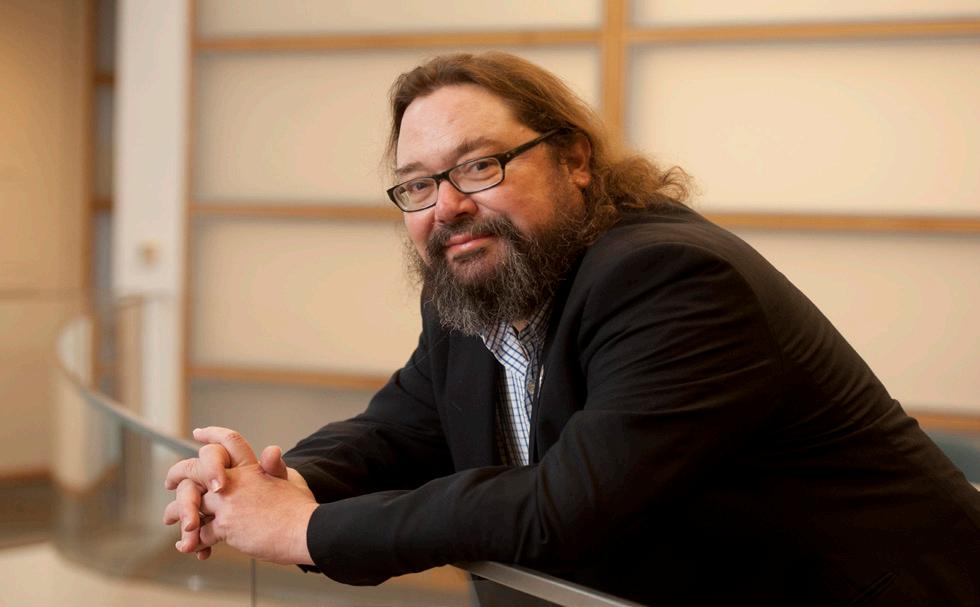
Committees of the Institute
The Full Committee (FC) carries out the core mission of RIJS. The FC is composed of tenured professors, junior faculty, and emeritus faculty from across the University whose research and teaching relate to Japan, as well as Japanese language faculty and librarians for the Japanese collections. The committee meets at least once annually, and its members participate actively in RIJS activities and subcommittees.
The Executive Committee (EC), the governing body of the Institute, is composed of 16 tenured faculty appointed from the FC by the FAS Dean. Membership recommendations for this committee are submitted annually to the Dean for approval. The EC meets four to six times per year to consider new initiatives, approve the annual budget, make formal and informal appointments, award fellowships and grants, and establish Institute policies and procedures.
4
The RIJS Full Committee 2016-18
The names of Full Committee members appear throughout this report. An asterisk (*) indicates members of the Executive Committee.
Ryūichi Abé, EALC* Reischauer Institute Professor of Japanese Religions
David C. Atherton, EALC Assistant Professor of East Asian Languages and Civilizations
Theodore C. Bestor, Anthropology* Reischauer Institute Professor of Social Anthropology and Japanese Studies; Director of RIJS
Mary C. Brinton, Sociology* Reischauer Institute Professor of Sociology
Albert M. Craig, EALC Harvard-Yenching Professor of History Emeritus
Edwin A. Cranston, EALC* Professor of Japanese Literature
John M. Doyle, Physics Professor of Physics
Naoya Enomoto, EALC Drill Instructor in Japanese (2016-17)
Theodore J. Gilman, WCFIA Executive Director of WCFIA
Andrew D. Gordon, History* Lee and Juliet Folger Fund Professor of History
Helen Hardacre, EALC* Reischauer Institute Professor of Japanese Religions and Society
Takuro Hashimoto, EALC Preceptor in Japanese (2017-18)
Takao K. Hensch, Molecular and Cellular Biology Professor of Molecular and Cellular Biology; Professor of Neurology, Children’s Hospital
Howard S. Hibbett, EALC Victor S. Thomas Professor of Japanese Literature Emeritus
David L. Howell, EALC* Professor of Japanese History
Akira Iriye, History Charles Warren Professor of American History Emeritus
Takuya Ito, EALC Drill Instructor in Japanese (2017-18)
Wesley M. Jacobsen, EALC*
Professor of the Practice of the Japanese Language; Director of the Japanese Language Program
Geoffrey G. Jones, HBS Isidor Straus Professor of Business History
Yuko Kageyama-Hunt, EALC Senior Preceptor in Japanese
Rie Kamimura, EALC Drill Instructor in Japanese (2017-18)
Ichiro Kawachi, HMS / HSPH Professor of Social Epidemiology
Susumu Kuno, Linguistics Professor of Linguistics Emeritus
Shigehisa Kuriyama, EALC* Reischauer Institute Professor of Cultural History; Harvard College Professor
Yukio Lippit, HAA* Professor of History of Art and Architecture
Wakana Maekawa, EALC Preceptor in Japanese (2016-17)
Yasuko Matsumoto, EALC Preceptor in Japanese
Melissa McCormick, EALC* Professor of Japanese Art and Culture; Harvard College Professor
Kuniko McVey, HYL Librarian for the Japanese Collection
Ian J. Miller, History* Professor of History
Masaru Mito, EALC Drill Instructor in Japanese
Takuma Miura, EALC Drill Instructor in Japanese
Miki Miyagawa, EALC Drill Instructor in Japanese
Toshiko Mori, GSD
Robert P. Hubbard Professor in the Practice of Architecture
Mark Mulligan, GSD Associate Professor in the Practice of Architecture
Maiko Nakatani, EALC Drill Instructor in Japanese (2017-18)
David R. Odo, Harvard Art Museums Director of Student Programs; Research Curator of University Collections Initiatives
Susan J. Pharr, Government*
Edwin O. Reischauer Professor of Japanese Politics; Director of USJRP, WCFIA
J. Mark Ramseyer, HLS* Mitsubishi Professor of Japanese Legal Studies
Michael R. Reich, HSPH
Taro Takemi Professor of International Health Policy
James Robson, EALC Professor of East Asian Languages and Civilizations
Henry Rosovsky, Economics
Lewis P. and Linda L. Geyser University Professor Emeritus
Jay Rubin, EALC
Takashima Research Professor of Japanese Humanities Emeritus
Victor Seow, History of Science
Assistant Professor of the History of Science
Ikue Shingu, EALC Preceptor in Japanese
Daniel M. Smith, Government Associate Professor of Government
Hirotaka Takeuchi, HBS Professor of Management Practice
Karen L. Thornber, Comparative Literature* Professor of Comparative Literature and East Asian Languages and Civilizations; Victor and William Fung Director, Asia Center
Ezra F. Vogel, Sociology
Henry Ford II Professor of the Social Sciences Emeritus
Tomiko Yoda, EALC*
Takashima Professor of Japanese Humanities
Michael Y. Yoshino, HBS
Herman C. Krannert Professor of Business Administration Emeritus
Alexander Zahlten, EALC
Associate Professor of East Asian Languages and Civilizations
5
Faculty Announcements
Theodore C. Bestor featured in US and Japanese media for contributions to Tsukiji Wonderland
Following the East Coast premiere at Harvard of Naotaro Endo’s Tsukiji Wonderland in October 2016, Theodore C. Bestor was featured in various US and Japanese media for his prominent role in the documentary, including a profile in Asahi Shimbun (http://rijs.fas.harvard.edu/pdfs/Asahi102116.pdf) and an interview for The Monocle on his views on Tsukiji Market as a global food community (http:// monocle.com/radio/shows/the-menu/food-neighbourhoods-4/).
Susan J. Pharr receives Japan Foundation Award
In October 2016, Susan J. Pharr was presented the Japan Foundation Award by Japan’s Foreign Minister in a ceremony in Tokyo. This award was given “in recognition of her notable contributions over many decades to promoting international mutual understanding, particularly between Japan and the US.
Toshiko Mori inducted into American Academy of Arts and Sciences
On 8 October 2016, Toshiko Mori was inducted into the American Academy of Arts and Sciences in a ceremony held in Cambridge. The American Academy is not only one of the nation’s most prestigious honorary societies, but also a leading center for research among academic, business, and governmental fields.
Helen Hardacre completes new monograph, Shinto: A History
In December 2016, Helen Hardacre published a new monograph, Shinto: A History, with Oxford University Press. This work offers the first comprehensive history of Shinto in any language, tracing the tradition's ancient origins through to modern day practice.
Alexander Zahlten completes new publication, Media Theory in Japan
Edited by Alexander Zahlten and Marc Steinberg (Film Studies, Concordia), Media Theory in Japan was published by Duke University Press in February 2017. This interdisciplinary collection of essays introduces Japanese media theory since the 1910s and expands media theory to encompass fields such as philosophy, feminist critique, literary theory, marketing discourse, and art. In February 2018, Professor Zahlten also received Honorable Mention for his essay “1980s Nyū Aka: (Non)Media Theory as Romantic Performance” in this co-edited volume.
Helen Hardacre is named Walter Channing Cabot Fellow
In April 2017, Helen Hardacre was named a Walter Channing Cabot Fellow by Dean Michael Smith. This fellowship is given annually to select distinguished faculty “in recognition of their achievements and scholarly eminence in the fields of literature, history, or art.” Professor Hardacre was recognized for her many contributions to the field of Japanese religions and religious history.
Theodore C. Bestor receives SUNTA Senior Scholar/Lifetime Award and Order of the Rising Sun, Gold Rays with Neck Ribbon
In October 2017, Theodore C. Bestor received the inaugural Senior Scholar/Lifetime Award from the Society for Urban, National, and Transnational Anthropology (SUNTA) committee of the American Anthropological Association. Naming him “one of the most important and accomplished anthropologists of his generation,” this award recognizes his contributions to understanding of urban daily life and its transformation over time.
On 3 November 2017, Professor Bestor also received the Order of the Rising Sun, Gold Rays with Neck Ribbon, from the Japanese government in honor of his extensive contributions to the study of Japan and to the promotion of scholarly and educational exchange between the US and Japan. The Order of the Rising Sun is one of Japan’s oldest and highest national decorations.
6
Andrew D. Gordon receives ISS-OUP Prize for article in Social Science Japan Journal
The article “New and Enduring Dual Structures of Employment in Japan: The Rise of Non-Regular Labor, 1980s-2010s” was awarded the ISS-OUP Prize as the most outstanding article of 2017 in the Social Science Japan Journal. This journal is published by the Institute of Social Science (University of Tokyo) and Oxford University Press.
Jay Rubin featured in Asahi Shimbun and Japan Times for translation work
In 2017 and 2018, Jay Rubin was featured in major Japanese newspapers Asahi Shimbun (https://bit. ly/2JdtTaW) and Japan Times (https://bit.ly/2qOHRIN) for his translated noh play, “A Reflection of Noh: The Feather Mantle.”
New Faculty
In fall 2017, RIJS welcomed two new faculty members.
David C. Atherton
Professor Atherton joined the Department of EALC at Harvard after teaching for four years at the University of Colorado, Boulder. He received his Ph.D. in Japanese literature from Columbia University (2013), following an M.A. in classical Thai literature from the University of Wisconsin-Madison (2006) and B.A. in Chinese literature and film from Harvard (2000). He specializes in the study of Japanese literature and culture of the early modern (Edo or Tokugawa) period, with an emphasis on popular fiction and literature, and is particularly interested in the ways popular literature and drama interacted with and impacted larger discourses of identity, community, emotion, and morality.
Victor Seow
Professor Seow is an historian of technology, industry, and the environment who specializes in China and Japan in the twentieth century. His work is primarily concerned with the social and economic dimensions of technological development and environmental management in the rise and recession of East Asian industrial orders. Holding a Ph.D. in History and East Asian Languages from Harvard (2014) and B.A. in History and Political Science from McGill University (2006), he taught for three years at Cornell University prior to joining the Department of the History of Science at Harvard.
In Memoriam
During these two academic years, RIJS was saddened by the losses of Toshiyuki Aoki and Yori Oda.
Toshiyuki Aoki
Toshiyuki Aoki, former Librarian for the Japanese Collection at the Harvard-Yenching Library, passed away on 19 October 2016; he was 84. Joining the Library in 1968, he served numerous faculty members, students, and visiting scholars in Japanese Studies until his retirement in 1999.
Born in Niigata, Japan, Mr. Aoki moved to the United States in 1956 to study at Columbia University, where he received a Bachelor of Science in geography in 1959 and a Master of Library Science in 1962. He remained at Columbia until 1964, working as a research assistant and bibliographer in the Department of Chinese and Japanese, after which he joined the East Asian Collection of Yale University Library as a Japanese cataloguer and then bibliographer until 1968. He also received an M.A. in political science from Northeastern University in 1983.
7
During his time at Harvard, he contributed to many publications, including the Current Japanese-language Serials in the Social Sciences and Humanities at Harvard-Yenching Library (1979) and, with Professor Masashiko Oka of the National Institute of Japanese Literature in Tokyo, the Early Japanese Books at Harvard-Yenching Library (1994). Throughout these years, Mr. Aoki also introduced new Japanese reference works and periodicals in the Occasional Reference Notes published by the Library. His post-librarian projects included translating classic mysteries such as Arthur Conan Doyle’s Sherlock Holmes series into Japanese.
Yori Oda
Long-time Japanese language instructor Yori Oda passed away on 5 February 2018 at age 82. After arriving at Harvard in 1966 as an economics student in the Regional Studies-East Asia Program, she spent 35 years teaching Japanese in the Department of East Asian Languages in Civilizations. Born in Tokyo and raised in Shanghai during her childhood, Ms. Oda traveled to England to complete her B.A. at the University of Manchester. During her time at Harvard, she connected with students beyond the classroom as a lifelong Senior Common Room Member of Leverett House and with the greater community as a member of the board of directors of the Japan Society of Boston and as a member of the JET Programme selection committee for the Consulate General of Japan in Boston.
Among many acknowledgements and awards, in 2004 Yori Oda was awarded a special Minister of Foreign Affairs Commendation from the Japanese government in recognition of her significant contribution to the promotion of cultural exchange between Japan and the United States. And in 2013, she was honored to receive the Order of the Sacred Treasure, Gold and Silver Rays, from the Emperor of Japan in recognition of her significant lifelong contributions.
However, of her many accomplishments in promoting knowledge of Japan and its culture in Boston, her most lasting legacy will be her tireless dedication to the Boston Children’s Museum. Serving as an interpreter for the Mayor of Kyoto during a sister city visit to Boston, Yori Oda was instrumental in bringing the traditional Japanese House (Kyo-no-Machiya) as a gift to the Boston Children’s Museum in 1979. As an Honorary Trustee of the Boston Children’s Museum, she continued to work toward educating people about Japanese culture. Each year, almost half-a-million visitors can experience and learn about Japan and Japanese life while visiting the Boston Children’s Museum.
RIJS Website
Established in 2005, the RI website provides an overview of the Institute’s faculty, scholars, and students; events and activities; grants and fellowships; and publications.
Visit the RIJS website at: http://rijs.fas.harvard.edu.
10
8
119
Advancing Research in Japanese Studies Advancing Research
Since its founding in 1973, the Reischauer Institute has sought to promote and support research on Japan in all fields and disciplines across the University.
In addition to supporting Harvard faculty, RIJS creates professorships to bring in faculty from new or underrepresented fields. The research community built at Harvard includes not only faculty and students, but also leading visiting scholars, postdoctoral fellows, and, since 2005, graduate student associates-in-residence. RIJS organizes and/or sponsors seminars, conferences, colloquia, collaborative projects, and other activities that contribute to the exchange of ideas, while also supporting the WCFIA Program on US-Japan Relations, which fosters social science research that bears on Japan’s role in the world as an advanced industrial society. Finally, RIJS maintains a dynamic publications program that has produced a number of prize-winning books, provides major support to the Japanese language collection in the Harvard Libraries, and undertakes numerous initiatives including the newly established Japan Digital Research Center.
Support for Faculty Research
Professorships
Over the past two decades, the Institute has played a prominent role in building Harvard’s intellectual infrastructure for the study of Japan through creating professorships in the Faculty of Arts and Sciences (FAS). No other Japanese studies program in the world has done more to create or support new faculty positions. These positions are intended to be incremental and are normally funded through the Institute’s endowment. Thus, the Institute owes much gratitude to its many friends in Japan who provided the original endowment funding in support of building Japanese studies at Harvard.
The current RIJS faculty appointments are as follows:
›› Edwin O. Reischauer Professor of Japanese Politics: Susan J. Pharr
›› Reischauer Institute Professor of Cultural History: Shigehisa Kuriyama
›› Reischauer Institute Professor of Japanese Religions: Ryūichi Abé
›› Reischauer Institute Professor of Japanese Religions and Society: Helen Hardacre
›› Reischauer Institute Professor of Social Anthropology and Japanese Studies: Theodore C. Bestor
›› Reischauer Institute Professor of Sociology: Mary C. Brinton
›› Associate Professor of East Asian Languages and Civilizations: Alexander Zahlten
›› Associate Professor of Government: Daniel M. Smith
10
Edwin O. Reischauer Professorship in Japanese Studies
The terms of the Institute’s endowment also provide for a professorship, named for Edwin O. Reischauer following his retirement in 1980. Intended to contribute directly to faculty research and to the educational mission of the University, the professorship allows FAS senior faculty in Japanese studies to devote up to one academic year to full-time research at some point during their tenure at Harvard. Normally, in alternating years, the Institute offers appointment as a visiting professor to a leading scholar in Japanese studies. Visiting professors divide their time between research and teaching, offering two courses over the academic year, including at least one lecture course at the undergraduate level.
In 2016-18, the following scholars served as EOR Professors:
2016-17
Thomas Keirstead, Associate Professor of East Asian Studies (University of Toronto)
2017-18
Shunya Yoshimi, Professor of Sociolgy, Cultural Studies, and Media Studies (University of Tokyo)
Other Support for Faculty Research
Like many other international and regional centers at Harvard, the Institute makes small research grants available to junior and senior faculty. In addition, the Institute provides one semester’s paid research leave to junior faculty. These grants have contributed to a number of publications and courses by Harvard faculty members.
In 2016-18, the following faculty received RIJS support for their research:
Christie McDonald, Comparative Literature Strategies for 18th-century Women Writers: Freedoms, Equalities, and Dilemmas
Part of ongoing collaboration with Japanese scholars of French literature, Prof McDonald traveled to Kyoto University to present a lecture on French women writers from the Middle Ages to the 21st century, as well as to conduct research on the work of Hisayasu Nakagawa, a prominent scholar of French literature.
Carol Oja, Music
Marian Anderson’s 1953 Concert Tour of Japan: A Transnational History
In collaboration with Misako Ohta (Kobe University) and graduate students Makiko Kimoto (Kobe) and Katherine Callam (Harvard), this project focused on the Japanese concert tour of the celebrated African American contralto Marian Anderson in 1953, the year after the American Occupation ended. The resulting article was published in American Music, University of Illinois Press.
11
Visiting Scholars
Visiting scholars are a vital part of the Japanese studies research community at Harvard. Their appointments vary widely from a few months to two years, with most staying for one year. During their stay, visiting scholars collaborate with faculty or contribute directly to ongoing RIJS research endeavors; advise students and provide contacts for Harvard undergraduate and graduate students preparing to conduct research abroad; give lectures and/or speak in classes; and participate in seminars and other research activities.
In 2016-18, the visiting scholars, along with their institutions and research topics, were as follows:
2016-17
Kiichiro Arai, Tokyo Metropolitan University
Political Values and Polarization in Japan
Ryusuke Hamaguchi, Independent Filmmaker
Film Project on the Experience of Corporeality
Jaehyang Han, Hokkaido University
Ethnic Minority Business History in Japan
Seiji Hanzawa, Meiji Gakuin University
Expansion of Japanese Creative Industries to the US
Wakana Kamei, University of Shiga Prefecture
Japanese Medieval Narrative Picture Scroll and the Tosa School of Painting
Megumi Matsuyama Kawamoto, Meiji University
Urban History of Edo-Tokyo from a Global Perspective
Shima Nagano, Meiji University
Environmental Strategies and Management Control Systems for Japanese Electrical Manufacturers in the US
Fumiko Nishino Nato, Hitotsubashi University
Growth of Non-regular Workers and Transformation of the Japanese Employment System
Isao Okada, Mainichi Shimbun
Sports Business: How Does Sports Administration Work in the US?
Sachiya Takeda, Kokugakuin University
Study of State Shinto in Japan
Yukiko Yano Okimoto, Aoyama Gakuin University
Comparative Research of Performance Arts
Hidenori Watanave, Tokyo Metropolitan University
Comparative Study of East Asian Industries from a Global Perspective
2017-18
Shawn Bender, Dickinson College Robotics in Japan's Aging Society
Masaya Chiba, Ritsumeikan University
Global Re-contextualization of Japanese Thought
Millie Creighton, University of British Columbia Japanese Department Stores, Tourism, and Gender in Japan
Akira Kaneko, Tokyo Metropolitan University
Japanese Economy and Society under PAX America
Junichi Matsumoto, Kahoku Shimpō
Business Strategies of US Newsprint Publishers and Media Companies
Noboru Matsuura, Tokyo University of the Arts
Survey of Japanese Shadow Methods in Ukiyo-e of the 18th and 19th Centuries
Keiko Mochizuki, Tokyo University of Foreign Studies
Typological Study of Compound Verbs in Japanese from Comparative Perspectives in English, Chinese, and Korean
Noriko Murai, Sophia University
Okakura Kakuzo and the University of Art
Hiromi Ochi, Hitotsubashi University
Promotion of American Literary Studies in Postwar Japan
12
Student Host Program for Visiting Scholars
The Institute seeks to integrate RI visiting scholars fully into the research community at Harvard and ensure that Harvard students who share their research interests have an opportunity to benefit from their stay. The Institute’s Student Host Program pairs students and visiting scholars based on these common interests.
In 2016-18, the student hosts were as follows:
Keung Yoon (Becky) Bae, Ph.D. candidate, EALC
Fabienne Helfenberger, Ph.D. candidate, HAA
Leah Justin-Jinich, Ph.D. candidate, EALC
Sara Klingenstein, Ph.D. candidate, Religion
Yusung Kim, Ph.D. candidate, EALC
Bradford (Reed) Knappe, Ph.D. candidate, History
Anthony Kuno-Lewis, Harvard College ‘19, ESPP
Shiro Kuriwaki, Ph.D. candidate, Government
Jesse LeFebvre, Ph.D. candidate, EALC
Lingling Ma, Ph.D. candidate, EALC
Ryo Morimoto, RIJS Postdoctoral Fellow, JDA
Kimberlee Sanders, Ph.D. candidate, EALC
Jesus Solis, Ph.D. candidate, History
Michael Thornton, Ph.D. candidate, History
Catherine Tsai, Ph.D. candidate, EALC/HEAL
Hirokazu Yoshie, Ph.D. candidate, EALC/HEAL
Graduate Student Associates-in-Residence
RIJS is surrounded by an extensive community of scholars that prominently includes graduate students enrolled in a number of departments and programs. Space in the CGIS building makes it possible for RIJS and other Asia-related centers to provide carrels or other space to a small number of Harvard doctoral candidate students completing their dissertations. These students are designated as graduate student associatesin-residence (GSAs). GSAs are encouraged to attend RIJS-hosted forums and other events of interest, and they are invited to various RIJS functions. This development offers an important way of bringing advanced graduate students into the Japanese Studies research community.
In 2016-18, a total of 10 students in Japanese Studies were designated as graduate student associates-inresidence, as follows:
2016-17
Katherine Brooks, HAA
Julia Cross, EALC
Esra-Gokçe Sahin, Anthropology
Eric Swanson, EALC
Maria Joelle Tapas, EALC
Hirokazu Yoshie, EALC/HEAL
2017-18
Ryan Glasnovich, EALC/HEAL
Yusung Kim, EALC
Jonas Rüegg, EALC/HEAL
Kimberlee Sanders, EALC
Eric Swanson, EALC
Rebecca Voelcker, VES
13
Postdoctoral Fellows
The RIJS Postdoctoral Fellowship Program, which provides funding to 4-5 junior scholars in Japanese studies each year, is one of the oldest and most prestigious programs of its kind in the US. Former RIJS Postdoctoral Fellows occupy leading positions in Japanese studies in universities all over the world.
Each year, the competition is open to a large pool of candidates in all fields and disciplines. Applicants must be within five years of the doctorate to be considered, and most devote their year at Harvard to producing publishable work from their dissertations. The fellows participate in the Japanese Studies research community at Harvard, serve as a resource for Harvard faculty and students, and, at some point during their stay, present their research in the Japan Forum lecture series. RIJS also provides support to each fellow to host an author’s workshop and participate in other research activities such as conferences and travel.
In 2016-18, the postdoctoral fellows, along with their Ph.D. institutions, fields, degree years, and research topics, were as follows:
2016-17
Kimberly Icreverzi
University of California, Irvine, Comparative Literature, 2015 Reproduction without End: The Gendered Labor of Japanese High Growth Cinema
Sachiko Kawai
University of Southern California, Premodern Japanese History, 2015
Power of the Purse: Estates and Religio-Political Influence of Japanese Royal Women – 1100-1300
Ryo Morimoto
Brandeis University, Anthropology, 2016
Under Control: Alterity at the Edge of Nuclear Contamination and Containment in Post-Fallout Coastal Fukushima Volume I of II
Stephen Poland
Yale University, Modern Japanese Literature and Film, 2016 Manchukuo as Method: Problematizing Nationality in Literature, 1906-1945
Yurika Wakamatsu
Harvard University, Japanese Art History, 2016
Painting in Between: Gender and Modernity in the Japanese Literati Art of Okuhara Seiko (1837-1913)
2017-18
Matthieu Felt
Columbia University, Premodern Japanese Literature, 2017
Rewriting the Past: Textual Structure and Commercial Legerdemain in Japan's First Official History
Colin Jones
Columbia University, Modern Japanese History, 2017
Living Law in Japan: Law and Society from One Postwar to the Next
Adam Lyons
Harvard University, Religion, 2017
Karma and Punishment: Prison Chaplaincy in Japan
Ryo Morimoto
Brandeis University, Anthropology, 2016
Under Control: Alterity at the Edge of Nuclear Contamination and Containment in Post-Fallout Coastal Fukushima Volume I of II
Amanda Robinson
University of Pittsburgh, Anthropology, 2017
Producing Intimacy, Consuming Sociality: Affect in the Japanese Animal Café
16
14

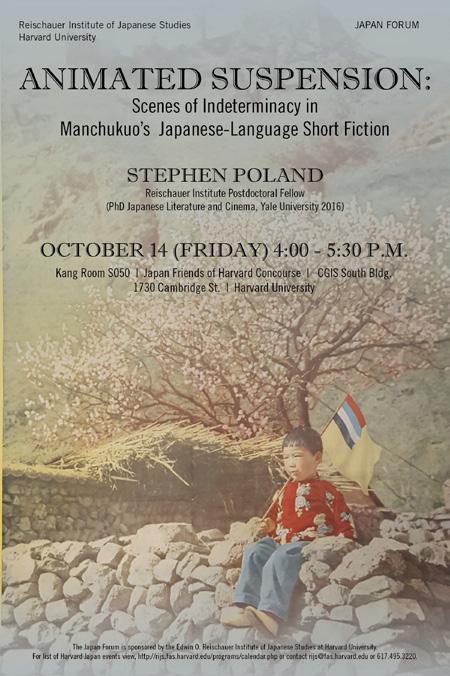
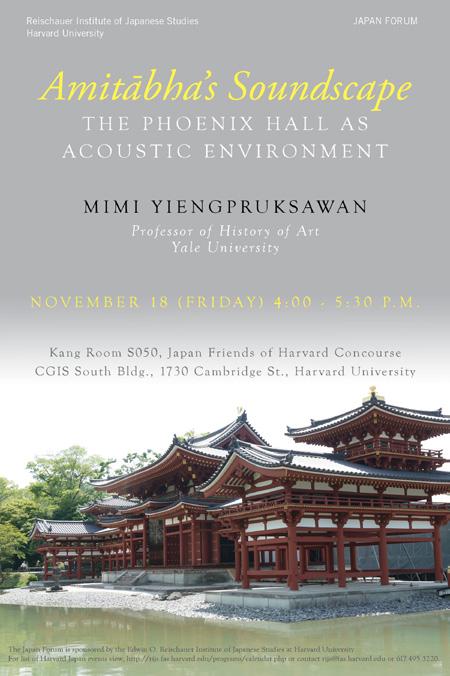



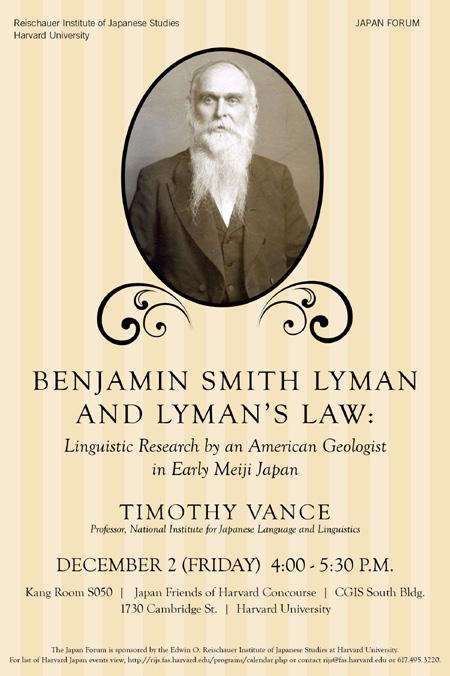
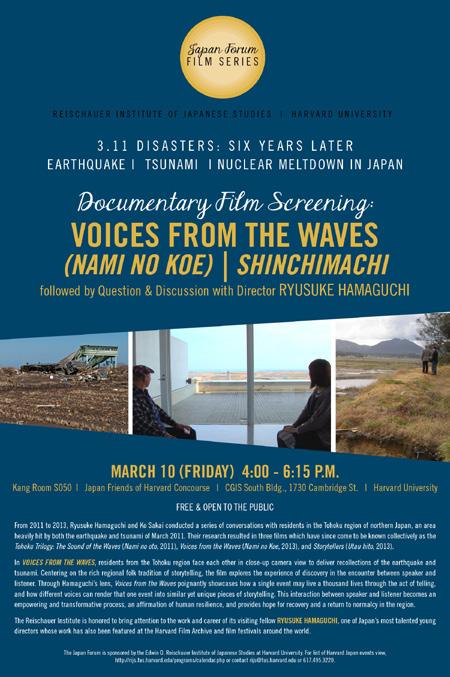

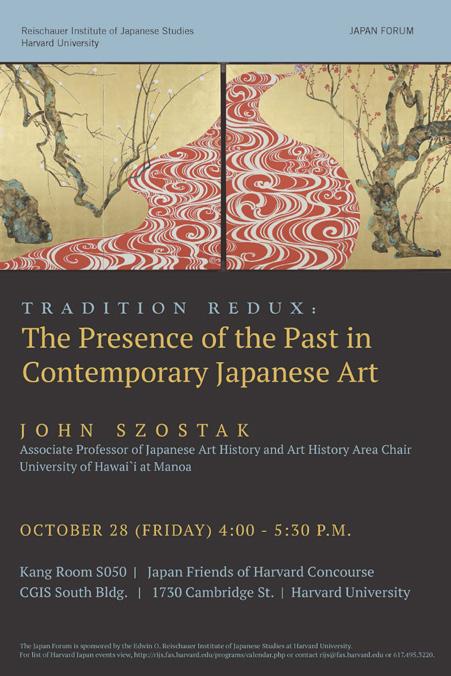

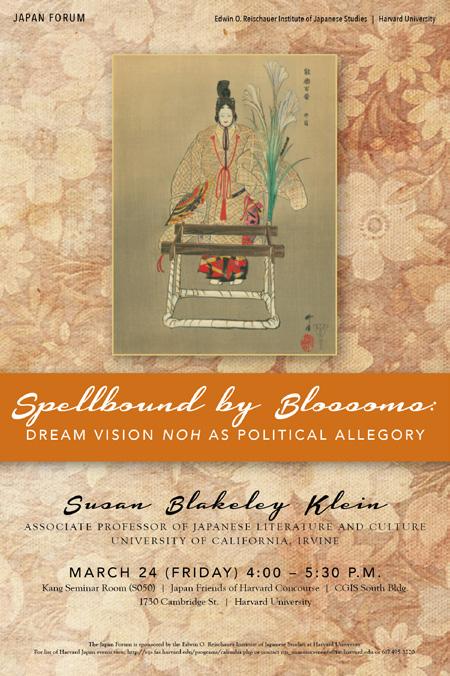
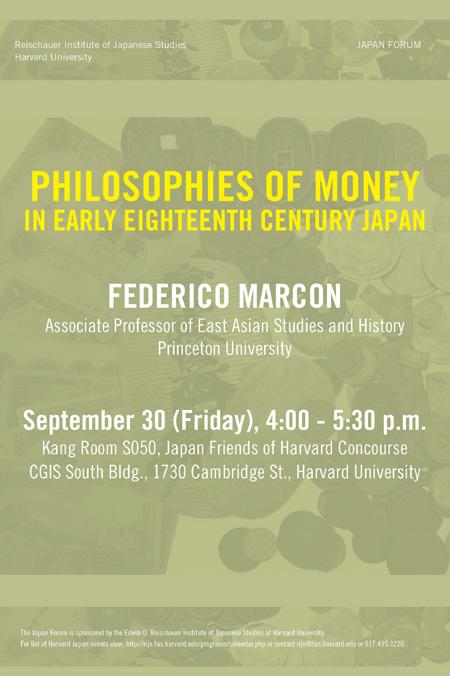

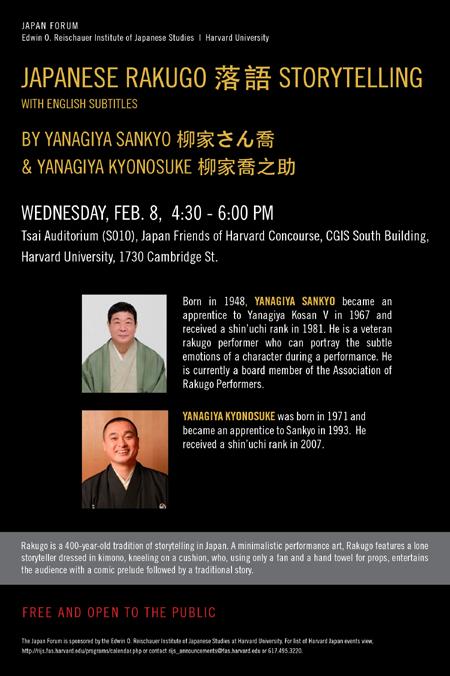
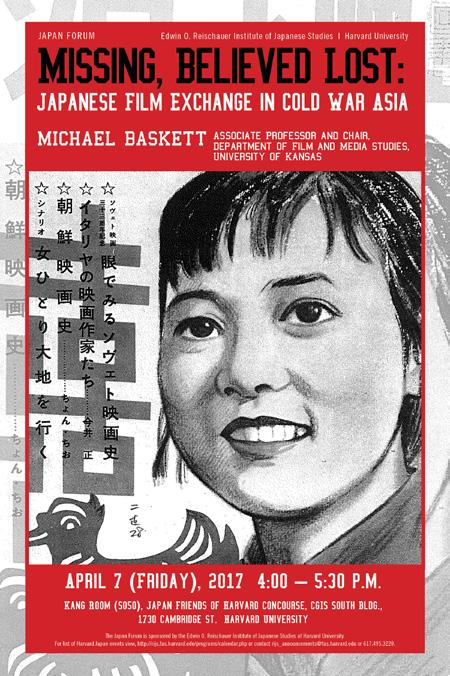
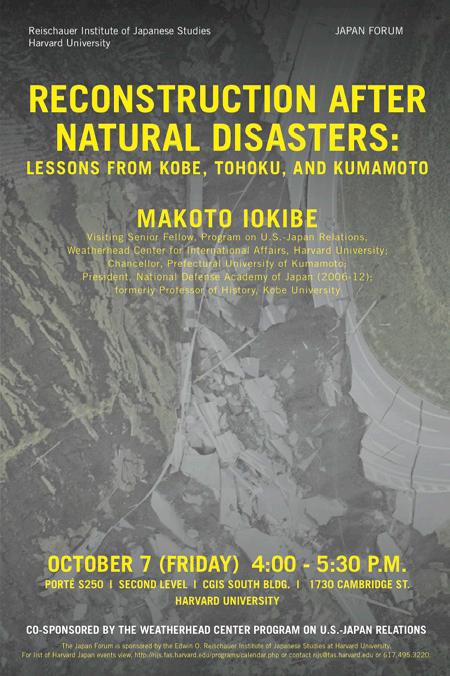
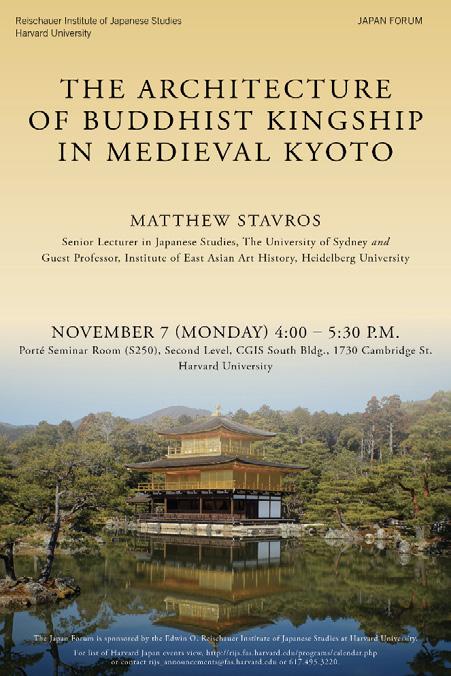

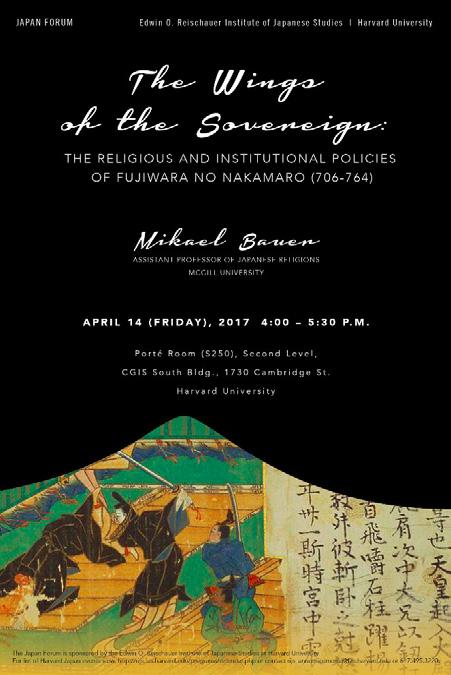
17 15
Japan Forum
Established in 1974 in response to growing interest in Japanese Studies at Harvard, the Japan Forum lecture series provides scholars from a variety of fields and disciplines with an opportunity to present their research before a diverse audience that includes faculty, students, fellow scholars, and the general public. Assembling each Friday afternoon throughout the academic year, each forum is hosted by a Harvard faculty member and is followed by a reception at which attendees have an opportunity to interact with the speaker and with each other. After the reception, a smaller number of interested Harvard faculty, students, and other guests share dinner with the speaker. In addition, since 2010, RIJS has hosted informal lunch gatherings with graduate students, depending on the speaker’s availability.
Since 1974, RIJS has sponsored more than 750 Japan Forum talks. In chronological order, the 2016-18 presenters are listed along with their affiliations and topics below:
2016-17
Thomas Keirstead, RIJS Visiting Professor
How Do We Know It’s Medieval? Historiography and Fantasy
Faculty host: David Howell
Kimberly Icreverzi, RIJS Postdoctoral Fellow
Yakuza Film and the Sexual Division of Labor in Postwar Japan
Faculty host: Alexander Zahlten
Eiji Oguma, Keio
Documentary Film Screening: Tell the Prime Minister
Faculty host: Andrew Gordon
Federico Marcon, Princeton
Philosophies of Money in Early Eighteenth-Century Japan
Faculty host: Shigehisa Kuriyama
Makoto Iokibe, USJRP Visiting Senior Fellow; Chancellor, Pref. Univ. of Kumamoto
Reconstruction after Natural Disasters: Lessons from Kobe, Tohoku, and Kumamoto
Faculty host: Susan Pharr
(co-sponsored by USJRP and RIJS Special Series on Japan’s 2011 Disasters)
Stephen Poland, RIJS Postdoctoral Fellow
Animated Suspension: Scenes of Indeterminacy in Manchukuo’s Japanese-Language Short Fiction
Faculty host: Tomiko Yoda
Naotaro Endo, Director
Maiko Teshima and Kazuha Okuda, Producers
Documentary Film Screening: Tsukiji Wonderland
Faculty host: Theodore Bestor
John Szostak, Univ. of Hawaii at Manoa
Tradition Redux: The Presence of the Past in Japanese Contemporary Art
Faculty host: Yukio Lippit
John Junkerman, Documentary Filmmaker
Documentary Film Screening: Okinawa: The Afterburn
Faculty host: Alexander Zahlten
Matthew Stavros, Univ. of Sydney
The Architecture of Buddhist Kingship in Medieval Kyoto
Faculty host: David Howell
Mimi Yiengpruksawan, Yale
Amitābha’s Soundscape: The Phoenix Hall as Acoustic Environment
Faculty host: David Howell
Timothy Vance, Nat'l. Inst. for Japanese Language and Linguistics
Benjamin Smith Lyman and Lyman’s Law: Linguistic Research by an American Geologist in Early Meiji Japan
Faculty host: Wesley Jacobsen
David Howell, Harvard
How Green Was My Night Soil: Thinking with Excrement about Nineteenth-Century Japan
Faculty host: Andrew Gordon
Sankyo Yanagiya and Kyonosuke Yanagiya, Rakugo Performers
Japanese Rakugo Storytelling at Harvard Faculty host: Wesley Jacobsen
Yurika Wakamatsu, RIJS Postdoctoral Fellow
In Pursuit of Reclusion: Okuhara Seiko (1837–1913) and the Gendering of Literati Art in Nineteenth-Century Japan
Faculty host: Melissa McCormick
Akiko Takenaka, Univ. of Kentucky
Gender and Postwar Relief: Support for War-Widowed Mothers in Occupied Japan (1945-52)
Faculty host: Helen Hardacre
Ryusuke Hamaguchi, RIJS Visiting Fellow
Film Screening and Discussion of 3/11 Documentaries with Film Director and Reischauer Institute Visiting Fellow Ryusuke Hamaguchi
Faculty host: Alexander Zahlten (RIJS Special Series on Japan’s 2011 Disasters)
Susan Klein, UC Irvine
Spellbound by Blossoms: Dream Vision Noh as Political Allegory
Faculty host: Melissa McCormick
Michael Baskett, Univ. of Kansas
Missing, Believed Lost: Japanese Film Exchange in Cold War Asia
Faculty hosts: Tomiko Yoda, Alexander Zahlten
16
Mikael Bauer, McGill
The Wings of the Sovereign: The Religious and Institutional Policies of Fujiwarano Nakamaro (706-764)
Faculty host: Ryūichi Abé
T.J. Pempel, UC Berkeley
Dismantling Developmentalism in Japan
Faculty host: Daniel Smith (co-sponsored by USJRP)
Sachiko Kawai, RIJS Postdoctoral Fellow
Senile Mother or Lying Daughters?: Female Inheritance Rights and Gender Roles in Medieval Japan
Faculty host: David Howell
2017-18
Karen Thornber, Harvard
“I’d Rather Be Dead”: Conflicts of Care at the End of Life
Faculty host: Theodore Bestor (co-sponsored by Asia Center, Fairbank Center, and KI)
Christopher Reed, Penn State
But Is It Art? The Reception of Post-War Japanese Prints
Faculty host: Melissa McCormick
Hiromu Nagahara, MIT
Performing Cosmopolitanism: A Japanese Diplomat, an English Suffragette, and their Literary Collaboration in Interwar London
Faculty host: Andrew Gordon
David Fedman, UC Irvine
The Ondol Problem and Politics of Conservation in Colonial Korea
Faculty host: Ian Miller (co-sponsored by KI)
Amanda Robinson, RIJS Postdoctoral Fellow
Animal Socialities: Healing and Affect in Japanese Animal Cafes
Faculty host: Theodore Bestor
Adam Lyons, RIJS Postdoctoral Fellow
The Dilemma of Bad Karma: Prison Chaplains in the Japanese Correctional System
Faculty host: Helen Hardacre
Aaron Rio, Minneapolis Institute of Art
Muromachi Ink Painters Lost and Imagined
Faculty host: Yukio Lippit
Anne Walthall, UC Irvine
Antiquity, Anachronism, and Gender: Thoughts on Spear-Fighting in Mid-Nineteenth Century Japan
Faculty host: David Howell
Colin Jones, RIJS Postdoctoral Fellow
Searching for a Social Order: The Sociology and Afterlives of Law in Japanese-Occupied China
Faculty host: Andrew Gordon (co-sponsored by East Asian Legal Studies Program and USJRP)
Matthieu Felt, RIJS Postdoctoral Fellow
Myth for a New World: Language and Philology in Eighteenth-Century Japan
Faculty host: David Howell
Shunya Yoshimi, RIJS Visiting Professor
Scales of History: Japan in the 500 Years of Global History
Faculty host: Andrew Gordon (co-sponsored by USJRP)
Brian Ruppert, Bates
Thinking with Scriptures and Their Uses: Great Notes (Maka shō), Raishin’s Notes (Rainin shō), and the Dissemination of Ritual Scripture (Shōgyō) in Early Medieval Japan
Faculty host: Ryūichi Abé
Japan Forum Workshop on Tokyo Urban History
Megumi Matsuyama, RIJS Visiting Scholar
Meiji, Edo/Tokyo and Meiji Revolution
Jordan Sand, Georgetown Approaches to the History of the Modern Japanese City Faculty host: David Howell
Matthew Marr, Florida International Neighborhoods of Refuge: Supportive Housing, Gentrification, and Ontological Security in Tokyo’s San’ya and Osaka’s Kamagasaki
Faculty host: Mary Brinton (co-sponsored by USJRP)
Sari Kawana, UMass Boston
Literary Ambulation: Tourism, Author Worship, and Hunting for the Past in Contemporary Japan
Faculty host: Karen Thornber
Shawn Bender, RIJS Visiting Scholar
Old Robots, Second Lives, and More-than-Human Care for Aging Japanese
Faculty host: Theodore Bestor
Edward Kamens, Yale Tekagami and the Poetics of Fragments
Faculty host: David Atherton
17
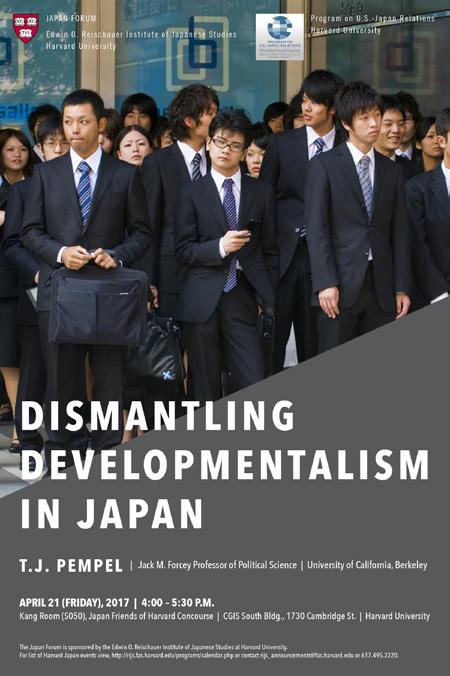


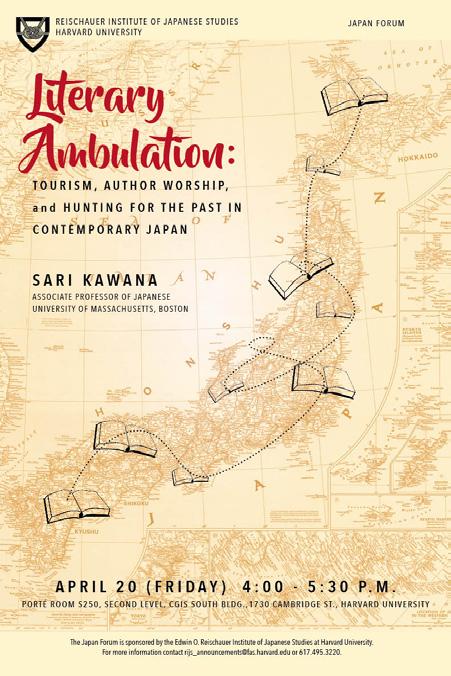
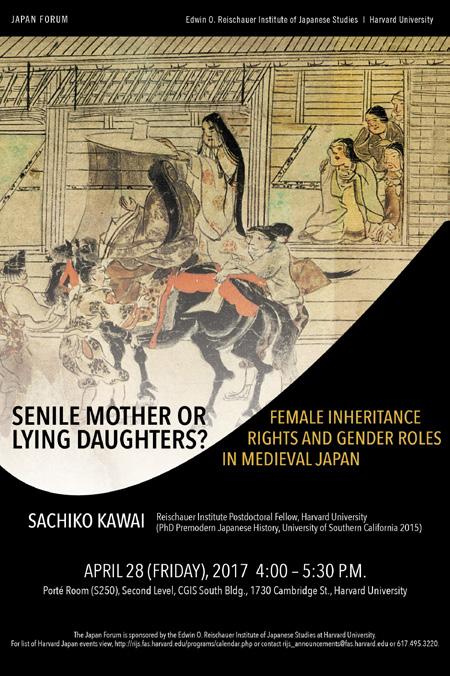
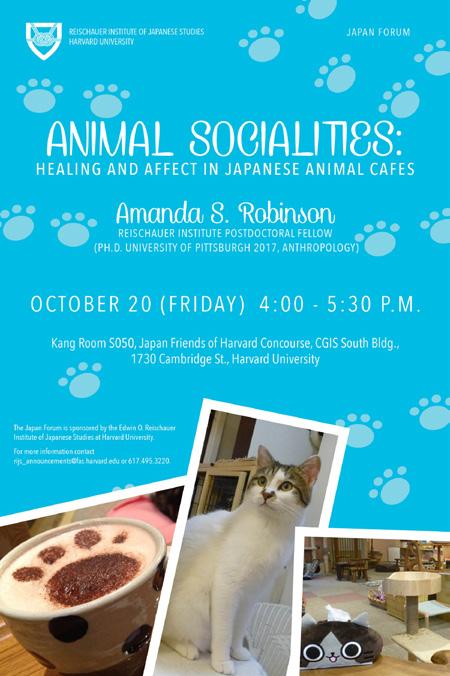
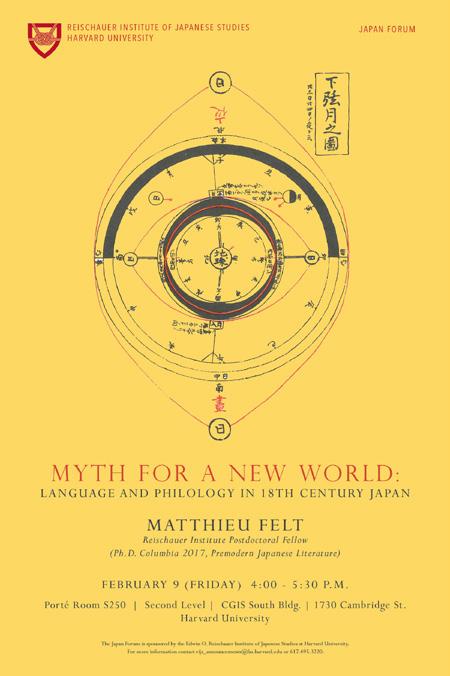


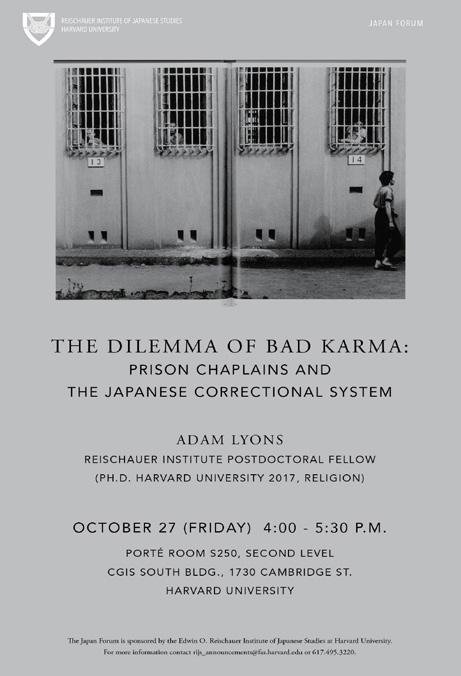

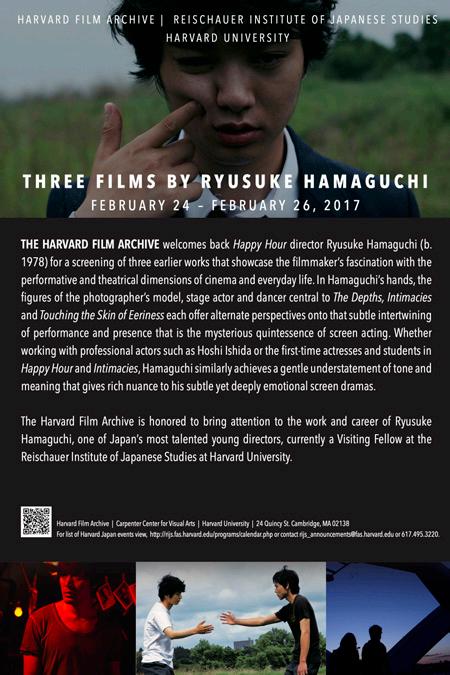
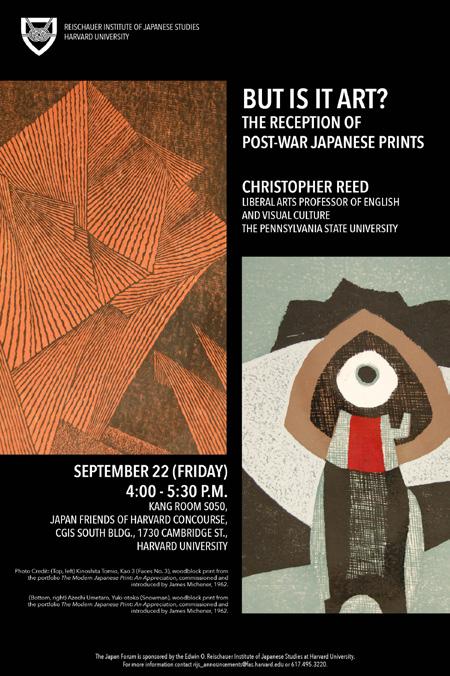
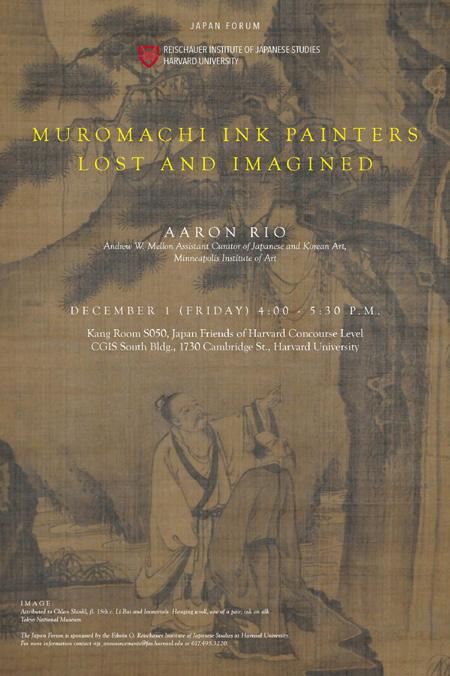
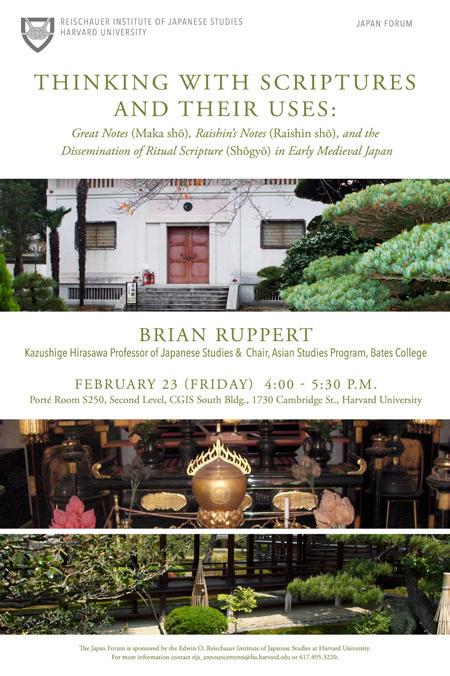
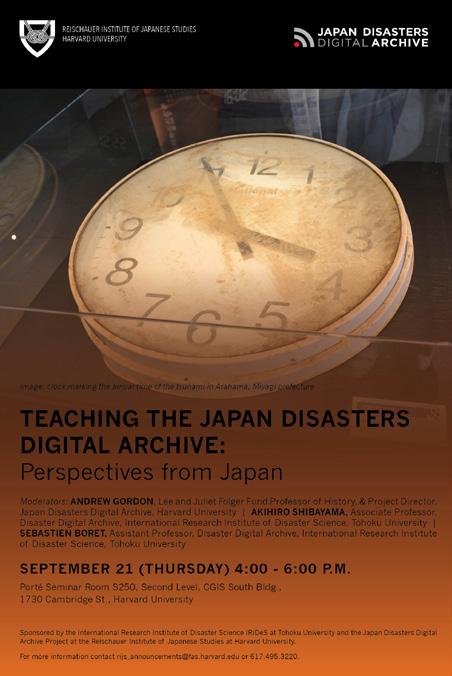
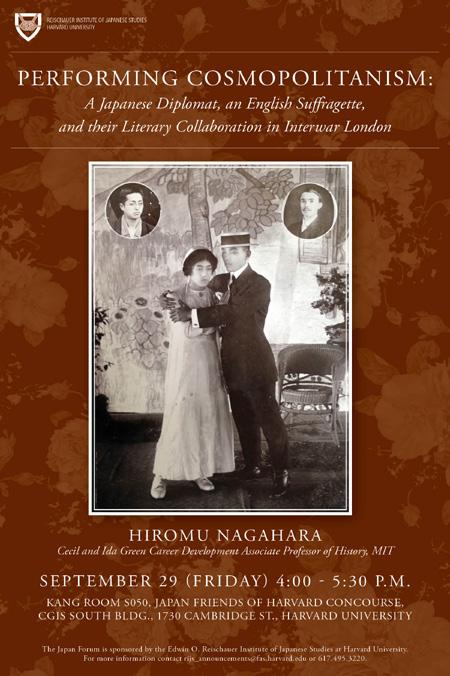
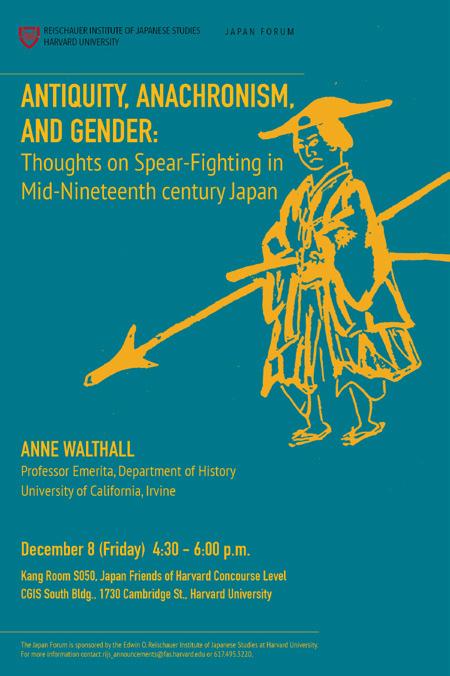


18
Other Seminars
Each year the Institute organizes and/or sponsors a variety of seminars and lectures on topics related to Japan. A number of these events are co-sponsored with other departments and centers, as indicated below.
2016-17
Keiji Yano, Ritsumeikan
Historical GIS and Digital Humanities Based on Virtual Kyoto (Center for Geographic Analysis presentation co-sponsored by RIJS)
He Wenkai, Hong Kong Univ. of Sci. and Tech. (HYI Visiting Scholar)
Legitimating State Power and Social Policies: A Comparative Study of Early Modern England, Tokugawa Japan, and Qing China
Faculty host: Daniel Ziblatt (HYI presentation co-sponsored by FC and RIJS)
Herbert Bix, Binghamton
Hirohito, the Remaking of Modern Japan, and US-Asia Policy: A Reassessment
Faculty host: Andrew Gordon (USJRP presentation co-sponsored by RIJS)
Ryosuke Kobayashi, Toyo Bunko (HYI Visiting Scholar)
The Exile and Diplomacy of the 13th Dalai Lama (1904-1912): Tibet’s Encounters with the US and Japan
Faculty host: Leonard van der Kuijp (HYI presentation co-sponsored by AC, FC, and RIJS)
Toshiko Mori, Harvard GSD
Joanne Cheung, GSD (MArch)
Scarlet Ziwei Song, GSD (MArch)
Jenny Zhan, GSD (MArch)
The Future of Urban Innovations: Harvard GSD Students Present Their Ideas for Fukushima
Faculty host: Susan Pharr (USJRP presentation co-sponsored by RIJS)
Lynn Kuok, EALS Visiting Scholar
Sung-Yoon Lee, Tufts
Joseph Nye, HKS
Ezra Vogel, Harvard
What’s Next: Trump and Asia
Faculty host: Susan Pharr (Panel co-sponsored by AC, EALS, FC, KI, HKS, HLS, SAI, USJRP, and RIJS)
Ryūichi Abé, Harvard
The Buddha and the Dragon Princess in the Lotus Sutra –for deciphering the Devadatta frontispiece in the Heike Nokyo set (Harvard Buddhist Studies Forum co-sponsored by AC, CSR, FC, HAA, HDS, IAAS, MHC, SAI, RIJS)
Seiji Hanzawa, Meiji Gakuin
Jaehyang Han, Hokkaido
Fumiko Nishino Nato, Hitotsubashi
Wakana Kamei, Univ. of Shiga Pref.
Reexamining Japanese Society and Culture: Four Case Studies (RIJS Visiting Scholar research presentations)
Susan Napier, Tufts
Miyazakiworld: Popular Culture and the Uses of Enchantment
Faculty host: Susan Pharr (USJRP presentation co-sponsored by RIJS)
Kenichiro Hirano, Tokyo/Waseda Hyungji Park, Yonsei
Hui Wang, Tsinghua (HYI Visiting Professor)
Longxi Zhang, City Univ. of Hong Kong
Asian Studies in Asia
Faculty host: Elizabeth Perry (HYI presentation co-sponsored by AC, FC, KI, and RIJS)
Roland Kelts, author
Kyoungtae Kim, news editor, MBC
Subina Shrestha, filmmaker
Explaining Asia: Three Professional Journalists and 2017 Nieman Fellows at Harvard on Reporting and Telling Stories about Their Richly Divergent Cultures – Japan, Nepal, and South Korea
Faculty host: Andrew Gordon (AC presentation co-sponsored by KI, Nieman Foundation, and RIJS)
William Kirby, HBS
Mireya Solis, Brookings Institution Mark Wu, HLS
Trump and Asia: Business as Usual?
Discussant: Tarun Khanna
Moderator: Andrew Gordon (Panel co-sponsored by AC, FC, KI, SAI, and RIJS)
Kensuke Chikamoto, Nagoya Univ. (HYI Visiting Scholar)
Tracing the Prophetic Narratives of a Buddhist Prince: The Construction of Myths and Legends of Shōtoku Taishi in Eleventh- to Thirteenth-century Japan
Faculty host: Ryūichi Abé (HYI presentation co-sponsored by RIJS)
Michaela Mross, Stanford
Just Singing: Kōshiki in Contemporary Sōtō Zen (Harvard Buddhist Studies Forum co-sponsored by AC, CSR, FC, HAA, HDS, IAAS, MHC, SAI, RIJS)
Yoshiyuki Ishizaki, TEPCO
Daniel Aldrich, Northeastern Fukushima Revitalization: TEPCO’s Responsibility and Local Community Development
Faculty host: Ian Miller (USJRP presentation co-sponsored by RIJS Special Series on Japan’s 2011 Disasters)
19
2017-18
Potsawat Boonjaipetch, Jialing Ni, Akira Seino, Hiroshi Tetsuka, Graduate students, IRIDeS, Tohoku Univ. Teaching the Japan Disasters Digital Archive in the Classroom
Moderators: Andrew Gordon; Akihiro Shibayama and Sebastien Boret, IRIDeS, Tohoku Univ. (RIJS Special Series on Japan’s 2011 Disasters)
Mark Ramseyer, HLS
Identity Politics and Organized Crime (EALS presentation co-sponsored by USJRP and RIJS)
Caleb Carter, JHU Postdoctoral Fellow
Inventing a History for a Young Tradition: Early Modern Shugendō at Mount Togakushi
Faculty host: Ryūichi Abé (Harvard Buddhist Studies Forum co-sponsored by AC, CSR, FC, HDS, SAI, and RIJS)
Merry White, BU
Why the Fishhead Faces Left and Other Tales: Learning from Food Workers in Japan
Faculty host: Theodore Bestor (USJRP presentation co-sponsored by RIJS)
Kenneth Ruoff, Portland State
Japan’s Imperial Household and Abdication: The Contemporary Controversy in Historical Perspective
Discussant: Andrew Gordon
Moderator: Susan Pharr (USJRP presentation co-sponsored by RIJS)
Junko Habu, UC Berkeley
Jomon Food Diversity, Climate Change, and Long-term Sustainability: Lessons from Prehistoric Japan
Faculty host: Theodore Bestor (Harvard Archaeology Seminar Series co-sponsored by RIJS)
Junko Habu, UC Berkeley
Long-term Sustainability through Place-Based, Small-Scale Economies: Approaches from Historical Ecology Small-Scale Economies Project
Faculty host: Theodore Bestor
(Harvard Buddhist Studies Forum co-sponsored by (RIJS special presentation co-sponsored by Anthropology Department)
Mari Miura, Sophia
Advancing Women in Japanese Politics: Breaking Through the Barriers
Faculty host: Susan Pharr
(USJRP presentation co-sponsored by HKS and RIJS)
Hui-lin Hsu, National Taiwan Univ. (HYI Visiting Scholar)
Building a National Literature: A Comparative Reading of Tsuga Teishō’s
“The Courtesan of Eguchi”
Faculty host: Karen Thornber
(HYI presentation co-sponsored by AC and RIJS)
Yoko Tanaka, Univ. of Tsukuba (HYI Visiting Scholar)
Growing Service Economy with More Precarious Work?
Convergence and Divergence in International Comparison
Faculty host: Andrew Gordon
(HYI presentation co-sponsored by RIJS)
Yoichi Suzuki, Ambassador to Kansai, Ambassador for International Economic Affairs, Japan (USJRP Visiting Fellow)
Japan’s Trade Strategy in an Age of Rising Protectionism
Discussant: Christina Davis
Moderator: Susan Pharr
(USJRP presentation co-sponsored by RIJS)
Curtis Milhaupt, Columbia Law School
Evaluating Abe’s Third Arrow: How Significant Are Japan’s Recent Corporate Governance Reforms?
(EALS presentation co-sponsored by USJRP and RIJS)
Junko Yamamoto, Kyoto Gakuen Globalism of the Tale of Genji
Faculty host: Melissa McCormick (RIJS special presentation co-sponsored by AC)
Daisy Yan Du, Hong Kong Univ. of Sci. and Tech. (HYI Visiting Scholar)
Plasmatic Empire: Animated Filmmaking in the Manchukuo Film Association, 1937-1945
Faculty host: Jie Li
(HYI presentation co-sponsored by FC and RIJS)
Atsushi Seike, Keio
The Impact of Adaptive Technologies on Employment: Implications for an Aging Japan
Discussant: Mary Brinton
Moderator: Mark Ramseyer (USJRP presentation co-sponsored by RIJS)
Bryan Lowe, Vanderbilt
Preaching to the Periphery: Buddhism in Provincial Villages in Ninth-Century Japan
Faculty host: Ryūichi Abé (Harvard Buddhist Studies Forum co-sponsored by AC, CSR, FC, HDS, SAI, and RIJS)
Andrew Littlejohn, USJRP Postdoctoral Fellow
Recovering Agency: The Politics of Reconstruction in Post-Tsunami Tohoku
Discussant: Daniel Aldrich, Northeastern
Moderator: Susan Pharr
(USJRP presentation co-sponsored by RIJS Special Series on Japan’s 2011 Disasters)
Franziska Seraphim, BC
Geographies of Justice: Japan, Germany, and the Allied War Crimes Program
Faculty host: Susan Pharr (USJRP presentation co-sponsored by RIJS)
Daisy Yan Du, Hong Kong Univ. of Sci. and Tech. (HYI Visiting Scholar)
An Animated Wartime Encounter: Princess Iron Fan and the Chinese Connection in Early Japanese Animation Chair: Susan Napier, Tufts (AC presentation co-sponsored by FC and RIJS)
Louise Young, Univ. of Wisconsin-Madison
The Idea of Class in Modern Japan
Faculty host: Andrew Gordon (USJRP presentation co-sponsored by RIJS)
20
Hyun Kyong Hannah Chang, Yale Postdoctoral Associate
Making a Musical Vernacular in Christian Pyongyang: Annie L. Baird’s Changgajip (1915) in Japan-Colonized Korea
Faculty host: Nicholas Harkness (KI presentation co-sponsored by RIJS)
Judith Froelich, Univ. of Zurich
A Cultural History of Opiates in Japan, 1700s-1930s
Commentators: Andrew Gordon, Jesus Solis (Ph.D. Candidate, Harvard) (WCFIA presentation co-sponsored by RIJS)
Haejoang Cho, Yonsei
Hiroshi Ishida, Tokyo
Teresa Kuan, Chinese Univ. of Hong Kong
Yifei Shen, Fudan
Asia’s Growing Generation Gap: Causes and Consequences
Faculty host: Elizabeth Perry (HYI presentation co-sponsored by AC, FC, KI, and RIJS)
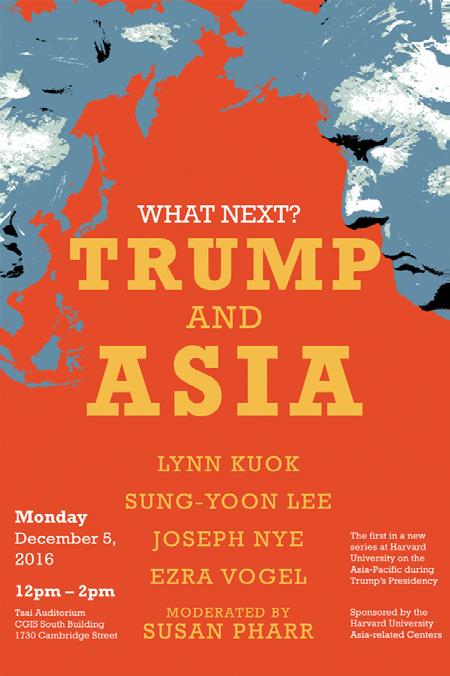

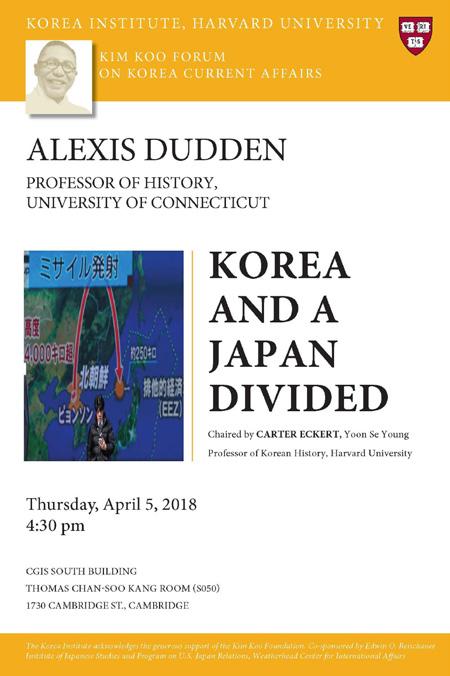


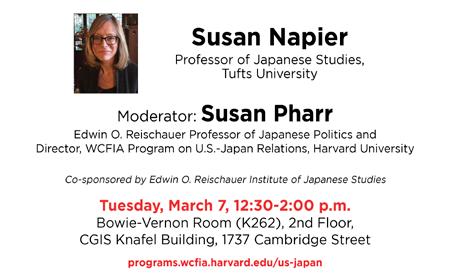
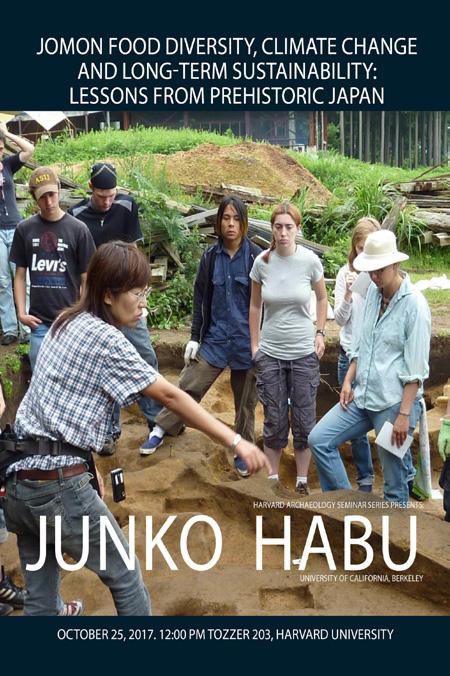

Wenjiang Yang, Nankai (HYI Visiting Scholar) Evidentiality in Japanese Faculty hosts: C.-T. James Huang, Susumu Kuno (HYI presentation co-sponsored by RIJS)
Alexis Dudden, Univ. of Connecticut Korea and a Japan Divided Faculty host: Carter Eckert (KI presentation co-sponsored by RIJS)
Rajyashree Pandey, Univ. of London
Rethinking Gender and Agency in the Tale of Genji
Faculty host: Melissa McCormick (RIJS special presentation co-sponsored by EALC)
Noriko Murai, RIJS Visiting Scholar “Periodization Is Like Luggage”: Japanese Art History in Transcultural Perspective in the Early Twentieth Century (RIJS special presentation)
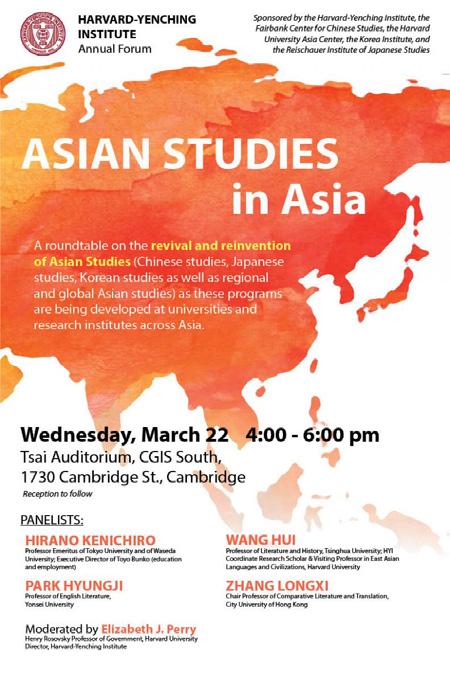
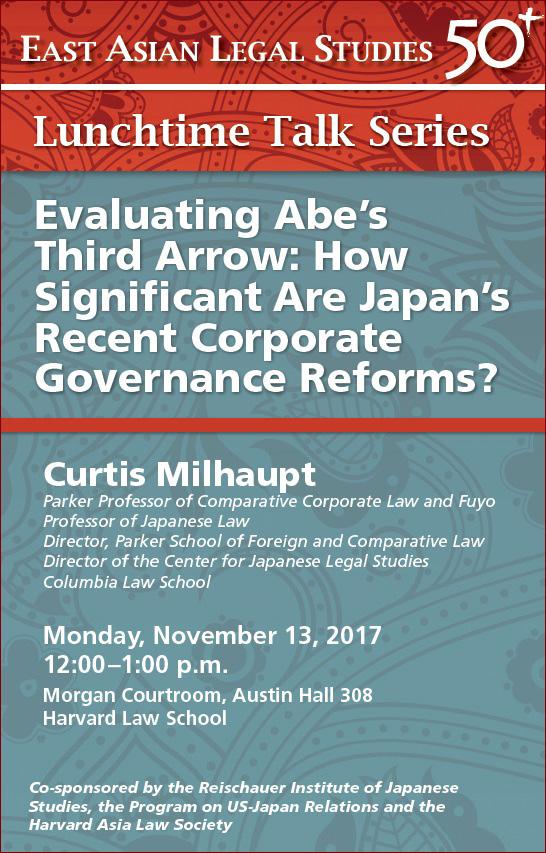



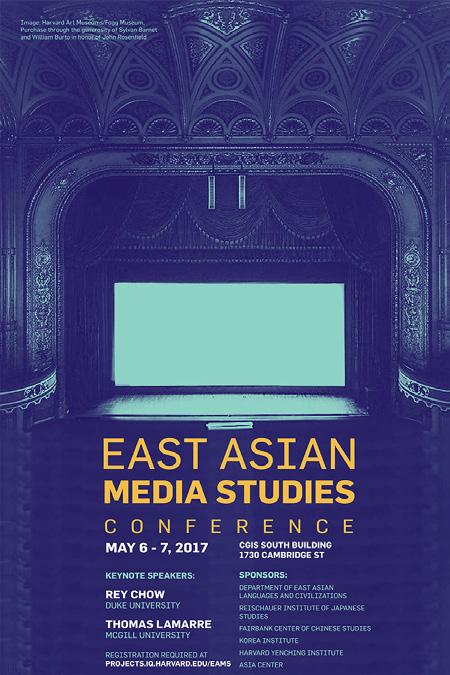

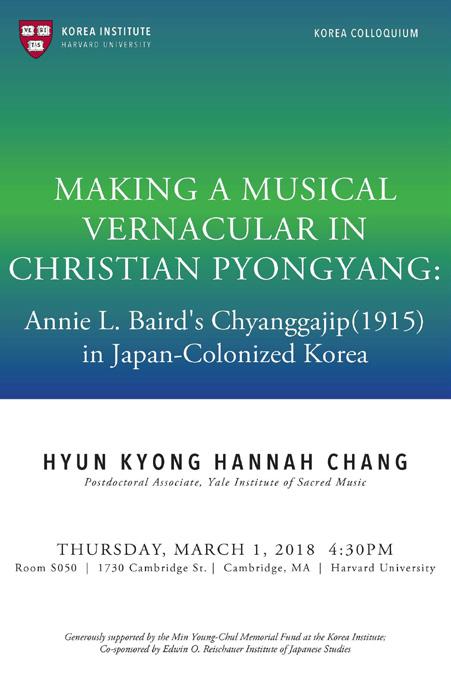
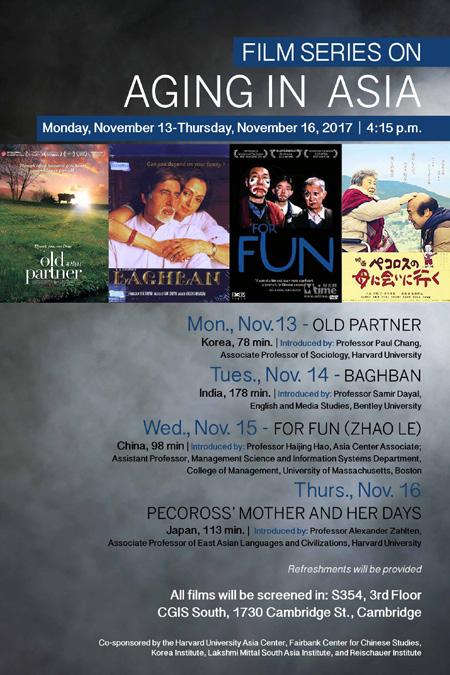
Japan Disasters Digital Archive
Launched in July of 2012, the Japan Disasters Digital Archive (JDA; http://jdarchive.org) is an advanced search engine for materials from around the globe, building digital repositories about the Great East Japan Earthquake in 2011. With the support of metaLAB and the Center for Geographic Analysis at Harvard, the project seeks to collect, preserve, and make broadly accessible many forms of first-hand information and primary documentation of the events of 11 March 2011 and their aftermath. Through the archive, the project aims to provide a public space of information exchange, to establish innovative means of organization, access, and integration of materials, and to contribute to teaching, research, and policy analysis both now and in the future. But most of all, JDA hopes that the archive will serve as a site of shared memories and reflection for those most affected by these events and concerned about their consequences.
JDA actively encourages user submissions of resources such as websites, videos, and photographs, as well as user testimonials about personal experiences of the disasters and their aftermath. Its innovative map feature provides a visualization of all materials that are tagged with geographic information in real time. And with the nature of sharing and exchanging collections and presentations, JDA fosters new connections, both between items and among users. This network of users is ever-expanding, from a major organization that submits thousands of location- and direction-tagged photographs, to fellow citizens who share their family’s experiences, to historians who seek to understand the interaction of public and private actors in the relief effort. Thus, the archive is an interactive space that promotes and, indeed, thrives on user participation. Its video introduction can be found here: http://www.jdarchive.org/en/about/about-archive. For a complete list of team members, please visit the JDA website.
Special Presentations on the 3.11 Disasters and Post-Disaster Japan
Every academic year, RIJS supports activities related to the March 11 events, disaster relief programs, and the JDA, for the purpose of promoting discussion of disaster relief and prevention and connecting with scholars globally to increase awareness of the ongoing relevance of these issues.
The following events were held in 2016-18:
Special Japan Forum Presentation
7 OCTOBER 2016
Makoto Iokibe, USJRP Visiting Senior Fellow; Chancellor, Pref. Univ. of Kumamoto Reconstruction after Natural Disasters: Lessons from Kobe, Tohoku, and Kumamoto
Faculty Host: Susan Pharr
(Special Series on Post-Disaster Japan sponsored by USJRP and RIJS)
Special Japan Forum Presentation
10 MARCH 2017
Ryusuke Hamaguchi, RIJS Visiting Fellow Film Screening and Discussion of 3/11 Documentaries with Film Director and Reischauer Institute Fellow Ryusuke Hamaguchi
Faculty Host: Alexander Zahlten
(Special Series on Post-Disaster Japan sponsored by USJRP and RIJS)
Seminar
2 MAY 2017
Yoshiyuki Ishizaki, TEPCO Daniel Aldrich, Northeastern Fukushima Revitalization: TEPCO’s Responsibility and Local Community Development
Faculty Host: Ian Miller
(USJRP presentation co-sponsored by RIJS)
Seminar
21 SEPTEMBER 2017
Potsawat Boonjaipetch, Jialing Ni, Akira Seino, Hiroshi Tetsuka, Graduate students, IRIDeS, Tohoku Univ. Teaching the Japan Disasters Digital Archive in the Classroom
Moderators: Andrew Gordon; Akihiro Shibayama, Sebastien Boret, IRIDeS, Tohoku Univ. (Special Series on Post-Disaster Japan sponsored by RIJS)
Seminar
13 FEBRUARY 2018
Andrew Littlejohn, USJRP Postdoctoral Fellow
Recovering Agency: The Politics of Reconstruction in Post-Tsunami Tohoku
Discussant: Daniel Aldrich, Northeastern
Moderator: Susan Pharr
(USJRP presentation co-sponsored by RIJS)
22
Constitutional Revision in Japan Research Project
Founded by Helen Hardacre in 2005, the Constitutional Revision in Japan Research Project meets to discuss, analyze, and document the process and debate surrounding the revision of Japan’s 1947 postwar constitution. In addition, the project seeks to situate the contemporary process of constitutional revision in the longer historical context of constitutionalism in Japan, as well as examine the role and perspectives of the political parties, the media, the political, labor, and business associations, women’s groups, religious groups, and many civil society groups in the constitutional revision debate. Related topics include Japan’s defense and security; imperial succession; rights and duties of citizens; the status of women; and the relationship between religion and state.
A central aim of the project is to collect and preserve original data and documents generated in the course of debate. With assistance from the Library Digital Initiative (LDI) in early 2006, the project began monthly “web-harvesting,” archiving material from a target set of 77 related Japanese websites. By 2007, the project launched its website, which features links to these Japanese websites both current and archived, a chronology of events relevant to the current debate, and a bibliography with over 1000 references to academic research and political analysis of the Meiji Constitution, postwar constitution, and ongoing discussion of constitutional revision.
Leadership of the project was formalized through the creation of an Advisory Council, which currently includes Alexis Dudden (History, University of Connecticut), Timothy George (History, University of Rhode Island), Helen Hardacre (EALC, Harvard), Keigo Komamura (Law, Keio University), and Franziska Seraphim (History, Boston College). This group convenes to set directions for the project and plan future activities.
Research on constitutional revision connects RIJS and other branches of Asian and international studies, including the social sciences, humanities, and beyond. The project engages not only students and faculty at Harvard and the New England region, but also faculty, diplomats, researchers, and students from Japan and around the world.
On 3 November 2017, the project organized an international symposium titled Debating Japan’s Constitution: On the Streets, In Parliament, and In the Region – the third and culminating event for joint research on constitutional revision with the Faculty of Law at Keio University. Following two conferences held at Keio in 2015 and 2016, this event was hosted at Harvard on the seventieth anniversary of the promulgation of the Constitution of Japan (November 3, 1947), supported by Harvard University Asia Center, Harvard-Yenching Institute, and WCFIA Program on US-Japan Relations. The goal of this symposium was to assemble a group of participants who could address the constitutional revision debate in three distinct but overlapping perspectives: as a focus of Japanese civic activism, as a legislative goal of the administration of Prime Minister Abe, and as an issue of Japan’s foreign relations with neighboring Asian nations. Details of the symposium can be found under “Conferences, Symposia, Workshops, and Events,” on page 28.
In May of 2018, project co-directors Helen Hardacre and Keigo Komamura signed a Memorandum of Agreement for a new three-year period of joint research, an extension to the three-year collaborative research project established with the Faculty of Law at Keio University in May 2015, titled The “Constitution” of Postwar Japan. Over the next three years, the project aims to publish a volume on contemporary civic activism surrounding the issue of constitutional revision in Japan, based on a series of workshops and conferences previously held by the project at Harvard University and Keio University, as well as current research endeavors.
23
Collaborative Study Projects
RIJS currently sponsors three ongoing study groups to support the research of Harvard faculty and graduate students. These groups bring together members of the Harvard scholarly community, including faculty, graduate students, postdoctoral fellows, visiting scholars and, in many cases, leading scholars from area institutions, to explore specific research themes that relate to Japan.
The study group program is open to a variety of formats and objectives. Many groups feature seminar series in which participants share their research findings, while others hold meetings aimed at engaging in common academic interests and developing major projects.
cinEncounters
Established in 2012, cinEncounters seeks to create a forum for critical engagement with lesser-known masterpieces of Japanese cinema from the 1960s, 1970s, and beyond. From the Japanese “New Wave” to pink films, from anime to documentary, monthly film screenings emphasize a collective encounter with the unexpected, the uncharted, and the unusual in Japanese film. Monthly showings offer an opportunity to gather, discuss, and enjoy new encounters with films, filmmakers, and the histories and stories behind them, and, when possible, the study group invites noted critics, filmmakers, and scholars with expertise on specific films to join the discussion either in person or via Skype. All films are shown with English subtitles and no prior knowledge of Japanese is required. In 2016-17, the series below was organized by Professor Alexander Zahlten and RIJS Postdoctoral Fellows Kimberly Icreverzi and Stephen Poland, with the assistance of Keung Yoon Becky Bae (Ph.D. candidate, EALC). In 2017-18, the series was inactive.
Screened films are as follows:
Asia is One (Nihon Documentarist Union, 1973)
International Gangs of Kobe (Noboru Tanaka, 1975)
Contemporary Japanese Politics
A Wife Confesses (Yasuzo Masumura, 1961)
Like Someone in Love (Abbas Kiarostami, 2012)
Established in 1999, this group was created with the goals of better understanding key trends in politics and foreign policy in Japan and focusing a scholarly eye on major issues. This group enables advanced Ph.D. students to circulate their works-in-progress (conference papers, draft dissertation chapters, etc.) and receive feedback, as well as faculty and postdoctoral fellows to present their research.
Chaired by Susan Pharr and Daniel Smith of the Department of Government and co-sponsored by RIJS and USJRP, the group includes over fifty faculty, graduate students, and other scholars, both at Harvard and across the greater Boston and New England region.
In 2016-18, the group organized the following activities:
Yoshikuni Ono, Tohoku
Do Voters Prefer Gender Stereotypic Candidates?
Evidence from a Conjoint Survey Experiment in Japan
Mark Ramseyer, HLS
Identity Politics and Organized Crime in Japan: The Impact of Special Subsidies on Burakumin Communities
Azusa Katagiri, USJRP Postdoctoral Fellow
Analyzing Parliamentary Discourse: Security Risks in Asymmetric Alliance
Justin Reeves, USJRP Postdoctoral Fellow
Daniel Smith, Harvard
Getting to Know Her: Information and Gender Bias in Preferential Voting Systems
Frances Rosenbluth, Yale
Forged through Fire: Military Conflict and the Democratic Bargain
Yusaku Horiuchi, Dartmouth
Source Cues or Policy Considerations: What Influences Foreign Public Opinion?
Kiichiro Arai, RIJS Visiting Scholar
Voters Punish Local Governments for Natural Disasters: Evidence from the 2015 Kinu River Flood in Japan
Rieko Kage, USJRP Visiting Senior Fellow
Positive and Negative Attitudes toward Immigrants: Evidence from Survey Experiments in Japan
24
Conferences, Symposia, Workshops & Events
2016-17
Film Screening
12 NOVEMBER 2016
Happy Hour
Ryusuke Hamaguchi, RIJS Visiting Fellow, with Haden Guest, Harvard
Directed by Ryusuke Hamaguchi (b. 1978), Happy Hour is a critically acclaimed film that chronicles the experiences of four thirtysomething women in Kobe as they navigate life, love, and friendship. With a running time over five hours, the film explores the development of its characters while also capturing the intimate details of daily life and relationships. Hosted by the Harvard Film Archive, the screening was followed by a discussion with Director Ryusuke Hamaguchi in person, moderated by Haden Guest. (HFA Film Event co-presented with RIJS)
Conference
24-25 FEBRUARY 2017
Harvard East Asia Society 20th Annual Conference: Roads Through Asia
This conference was organized by the Harvard East Asia Society, composed of students in the Regional Studies-East Asia program. Every year, graduate students from institutions across the US and around the world gather at Harvard to present their research in East Asian Studies to peers and to renowned scholars in the field. The 2017 conference, titled “Roads Through Asia,” focused on a number of topics related to China, Korea, and Japan, both historical and contemporary. Speakers, panel titles, and discussants are listed below.
Day 1
Opening Remarks: Xiaofei Tian, Harvard
Keynote: Michael Puett, Harvard
Day 2
Panel A: Modern Japan David Howell, Harvard
Panel B: Modern Sinophone Literature: Re-Imagination of Identity and Modernity David Wang, Harvard
Panel C: Chinese Philosophy Michael Puett, Harvard
Panel D: Memory and Legacies of Contemporary Korea
Katharine Moon, Wellesley
Panel E: Literature, State, and Political Imagination
Xiaofei Tian, Harvard
Panel F: Geopolitics of Development in East Asia
William Kirby, Harvard
Panel G: Art History, Architecture, Media
Maya Stiller, KI Postdoctoral Fellow
Panel H: Roads Through Premodern Korea
Sun Joo Kim, Harvard
Panel I: Chinese Historiography Wai-yee Li, Harvard
Panel J: Representations of Gender in East Asia
Alexander Zahlten, Harvard
Panel K: History of Medicine in Japan
Shigehisa Kuriyama, Harvard
Panel L: Japan and its Encounters Andrew Gordon, Harvard
Keynote: Theodore Bestor, Harvard
Closing Remarks: Alexander Zahlten, Harvard
(Co-sponsored by RSEA, AC, FC, KI, WCFIA, and RIJS)
Film Screening
24-26 FEBRUARY 2017
Three Films by Ryusuke Hamaguchi
Ryusuke Hamaguchi, RIJS Visiting Fellow, with Alexander Zahlten, Harvard
The second screening of works by Ryusuke Hamaguchi (b. 1978), this retrospective showcased the filmmaker’s fascination with the performative and theatrical dimensions of cinema and everyday life. The screenings of Touching the Skin of Eeriness and Intimacies were each followed by a discussion with Director Ryusuke Hamaguchi in conversation with Alexander Zahlten.
Touching the Skin of Eeriness
(Bukimina mono no hada ni sawaru) (2013)
Intimacies (Shinmitsusa) (2012)
The Depths (2010)
(HFA Film Event co-presented with RIJS)
Film Screening & Workshop
3-4 MARCH 2017
Three Radical Japanese Filmmakers
Curated by Go Hirasawa, Meiji Gakuin, with Alexander Zahlten, Harvard
Led by researcher and curator Go Hirasawa, this screening introduced a series of Japanese experimental films from the 1960s, including those characterized as zen’ei eiga (avantgarde film), undāguraundo eiga (underground film), jikken eiga (experiment film), and others. Though influential at their time of creation, the films had only recently been digitally restored for audience viewing. This screening was followed by a free workshop at the Harvard Film Archive on the preservation and circulation of noncorporate film and with the Hachimiri Madness! program.
Gewaltopia Trailer (Motoharu Jonouchi, 1969)
Shinjuku Station (Motoharu Jonouchi, 1974)
Great Society (Masanori Oe and Marvin Fishman, 1967)
Phenomenology of Zeitgeist (Rikuro Miyai, 1967)
Shifting of Materialities of Film: Projection, Preservation, and Research
Ann Adachi (Collaborative Cataloging Japan Initiative), Haden Guest (Harvard), Go Hirasawa (Meiji Gakuin), Alexander Zahlten (Harvard)
The workshop addressed the shifts taking place in the way moving images from Japan are preserved and presented, while exploring their consequences on film as an art and as an object of research. Presented by four central figures involved in Japanese film studies, the workshop addressed questions such as the preservation and accessibility of film from Japan, as well as the role and challenges of experimental film within the Japanese film industry.
(HFA Film Series co-presented with RIJS)
25
Film Screening
10 MARCH 2017
The Art of the Benshi, A Performance by Ichiro Kataoka Ichiro Kataoka, with Jeff Rapsis, piano
During the silent era in Japan, films were brought to life by the performances of katsudo benshi, who infused the action onscreen with their own narration, dialogue, and expressive interpretation. In this screening, renowned benshi Ichiro Kataoka narrated three silent films set to live music by piano accompanist Jeff Rapsis.
Taro's Train (Taro-san no kisha) (Yasuji Murata, 1969)
Blood's Up in Takadanobaba (Chikemuri Takadanobaba) (Daisuke Ito, 1928)
Shoes (Lois Weber, 1916) (HFA Film Event co-presented with RIJS)
Symposium
24-25 MARCH 2017
Asian Borderlands: The First Annual Symposium
This symposium was the first meeting of an annual research network consisting of history graduate students from Harvard, UChicago, Columbia, and Cornell. Focusing on South Asian, Southeast Asian, Indian Ocean, and East Asian history, students gathered to share their research on topics about border-making and border-crossing in early modern and modern Asia. In addition to a public conference, a series of paper workshops and roundtable discussions was held with faculty experts.
Day 1
Workshop 1: Trajectories of Script Flow: Writing and Genre in Early Modern Northeast India
Ann Blair, Harvard
Lei Lin, Harvard
Roundtable 1: Frontiers and the Transition to Colonialism
Thomas Barfield, BU
Rishad Choudhury, Harvard
Mark Elliott, Harvard
Beatrice Manz, Tufts
Moderator: Usama Rafi, Univ. of Chicago
Workshop 2: Sovereignty, Self-Government, and the Problem of Political Freedom: Toward a Conceptual History of Swaraj
Sugata Bose, Harvard
Aniket De, Harvard
Roundtable 2: Borders from Empire to Nation-State
Sunil Amrith, Harvard
Sugata Bose, Harvard
Maya Jasanoff, Harvard
Charles Maier, Harvard
Moderator: Aniket De, Harvard
Day 2
Coffee and Administrative Meeting
Roundtable 3: Religious Networks and Social Boundaries
John Comaroff, Harvard
Ayesha Irani, UMass Boston
Brian Hatcher, Tufts
Moderator: Rukmini Chakraborty, Cornell
Conference Welcome Remarks
Panel 1: Space and Sovereignty
Rukmini Chakraborty, Cornell
Thomas Newbold, Univ. of Chicago
Jonas Rüegg, Harvard
Discussants: Rishad Choudhury, Harvard
Samyak Ghosh, Columbia
Panel 2: Edges of Empire Lei Lin, Harvard
Aniket De, Harvard
Discussant: Catherine Warner, Harvard
Panel 3: The Nation and its Frontiers
Kirk McLeod, Harvard
Divya Chandramouli, Harvard
Discussant: Usama Rafi, Univ. of Chicago
Concluding Discussion: Is “Asian Borderlands” a Meaningful Historical Analytic?
Sugata Bose, Harvard
(Co-sponsored by Department of History, AC, FC, SAI, WCFIA, and RIJS)
Film Screening
21 April – 22 MAY 2017
Hachimiri Madness!
Japanese Independents from the Punk Years
Presenting a collection of Japanese 8-mm films from 19771990, this film series introduced a new kind of film of that time period known as jishu eiga (“autonomous film”), which gave rise to some of the most well-known filmmakers in Japan today. Although experimental filmmakers originally sought to diverge from the mainstream industry, jishu films made a lasting impact both as an alternative genre and as a commercial success, attracting wide audiences and inspiring numerous films. The following works were screened as part of this series:
The Adventure of Denchu-Kozo (Denchu Kozo no bōken) (Shinya Tsukamoto, 1988)
I am Sion Sono! (Ore wa Sono Shion da!) (Sion Sono, 1984)
Isolation of 1/880000 (1/880000 no kodoku) (Sogo Ishii, 1977)
Tokyo Cabbageman K (Tokyo hakusai kan-K-sha) (Akira Ogata, 1980)
Hanasareru Gang (Nobuhiro Suwa, 1984)
Happiness Avenue (Ai no machikado 2-chome 3-banchi) (Katsuyuki Hirano, 1986)
Saint Terrorism (Sei terorizumu) (Masashi Yamamoto, 1980)
The Rain Women (Ame onna) (Shinobu Yaguchi, 1990)
UNK (Macoto Tezka, 1979)
(HFA Film Series co-presented with RIJS)
Conference
6-7 MAY 2017
The East Asian Media Studies Conference
In response to the popularization of digital technology, this conference aimed to expand the temporal, spatial, and material scope of the field of media studies, explore the relationship between the innovations of new media and their older developments, and question the role that area plays in media. Discussing issues relevant to a variety of aspects of media studies, panel presentations encouraged audience engagement and active reflection on the evolution of the field.
28 26
Day 1
Keynote: Thomas Lamarre, McGill
Panel 1: Meditation, Affect, and Body
Larissa Hjorth, Royal Melbourne Inst. of Tech.
Olivia Khoo, Monash
David Kim, SUNY Purchase
Xiao Lu, McGill
Moderator: Ying Qian, Columbia
Panel 2: Sound and Listening
Tom Looser, NYU
Nikki Lee, Nottingham Trent
Julian Stringer, Nottingham
Junting Huang, Cornell
Moderator: Paul Roquet, MIT
Panel 3: Traveling Media, Traveling Forms
Andy Rodekohr, Wake Forest
Feng-Mei Heberer, MIT
Xinyu Dong, Univ. of Chicago
Moderator: Hiromu Nagahara, MIT
Day 2
Keynote: Rey Chow, Duke
Panel 4: Ecology and/or Infrastructure
Yuriko Furuhata, McGill
Xin Zhou, Hong Kong Polytechnic
Jinying Li, Univ. of Pittsburgh
Moderator: Erin Huang, Princeton
Panel 5: Design, Form, and Mediascape
Bao Weihong, UC Berkeley
Sharon Hayashi, York
Seungham Paek, Yonsei
Moderator: Steven Chung, Princeton
Panel 6: Newness and Pastness
Aaron Gerow, Yale
Takeshi Kadobayashi, Kansai Univ.
Kyoung-Lae Kang, Korea Univ.
Moderator: Marc Steinberg, Concordia
Closing Remarks
(Organized by Jie Li, Tomiko Yoda, and Alexander Zahlten; co-sponsored by EALC, HYI, AC, FC, KI, and RIJS)
Conference
21 MAY 2017
31st Annual Conference of the Japanese Language Teachers’ Association of New England (JLTANE)
This conference commemorated the 30th anniversary of the inauguration of JLTANE at Harvard University. Sponsored by RIJS and the Consulate General of Japan in Boston, the conference featured presentations on a variety of topics concerning Japanese language education, including a keynote address by Seiichi Makino, Professor Emeritus at Princeton University, about the benefits of exploring literary style in language education. This event was concluded with a reception at the Official Residence of Consul General Rokuichirō Michii.
Session 1
Opening Remarks: Shigehisa Kuriyama, Harvard
Designing Diversity-Focused Activities in the Japanese Classroom
Yasuko Shiomi, UMass Amherst
Revitalization of Grammar Teaching in the Digital Age:
Grammar Pedagogy
Takako Aikawa, MIT
Teaching Speaking in Upper-Intermediate Courses: from Sentences to Paragraphs
Itsuko Nishikawa, Univ. of Washington
Cross-Sectional Japanese Learner Corpus Study on the Adverbial Usage of the No-adjective “futsū” in Spoken Language
Mamoru Hatakeyama, Williams
What Does the “Genki Can-do List” Bring to Elementary Japanese Courses? Research on Learner’s Perception toward Self-Assessment
Takami Taylor, Univ. of West Florida
Yoko Sakurai, Japan Foundation
Helping Students Internalize Genki Textbook Methods
Tamae Prindle, Colby
Students’ Opinions and Perspectives on Homework and Pop Quizzes in the Japanese Classroom
Yukie Aida, Univ. of Texas at Austin
Local Inquiry in Japanese Language Education
Kazuo Tsuda, UN Int’l Sch.
Session 2
Keynote: “What Kind of Style is Haruki Murakami Using When He Writes Novels?”
Seiichi Makino, Princeton
Critical Content-Based Instruction (CCBI) in a Tutorial Format
Kasumi Yamamoto, Williams
Practical Guide to Teaching Japanese Honorific Expressions
Implemented in “Reading” and “Writing” Materials
Chieko Yamazaki, Eckerd
Critical Content-Based Instruction (CCBI) through Social Networking Approach
Yuko Kageyama-Hunt, Harvard
Why Hold a Speech Contest? Developing Communication and Communities in an Intermediate Japanese Course
Sachiko Hiramatsu, Brown
Language Instruction Using Distance Education in a Virtual Classroom
Mayumi Ishida, Dartmouth
Providing Students with Face-to-Face Japanese Practice Opportunities Outside the Classroom
Yasuo Uotate, Univ. of Florida
Improving Accent and Intonation in Elementary- and Advanced-Level Japanese Learners
Hiroyo Nishimura, Yale
Discussing Japan Week from the Perspectives of Community Development, PBL, and Collaborative Work
Hiroshi Tajima, Brown
Why do Chinese Students Take Japanese Classes in the US? Mariko Itoh Henstock, BU
Closing Remarks: Yasuko Matsumoto, Harvard Reception
(Organized by the Harvard Japanese Language Program; co-sponsored by the Consulate General of Japan in Boston and RIJS)
27
2017-18
Art Exhibition
1 SEPTEMBER – 31 OCTOBER 2017
IRRESOLUTION: The Paintings of Yoshiaki Shimizu “Irresolution” was the first retrospective of the artistic career of Yoshiaki Shimizu (b. 1936), a Japanese-born, Harvardtrained painter and later historian of Japanese art. Exploring a multitude of styles inspired by Shimizu’s cross-cultural experiences, these works chronicled his navigation through the different art worlds across the US, Germany, and Japan during the postwar era.
Coinciding with the Program on US Japan Relations–Reischauer Institute Fall Reception, the exhibition opened on 27 September 2017 with a gallery tour with artist Yosihaki Shimizu and a presentation by curator Yukio Lippit, in conversation with the artist.
Details and photos from the exhibition are on page 34.
(Curated by Yukio Lippit, with Stacie Matsumoto; organized by RIJS)
Symposium
3 NOVEMBER 2017
Debating Japan’s Constitution: On the Streets, In Parliament, and In the Region
This was the third and culminating conference for joint research on constitutional revision with the Faculty of Law at Keio University. Led by Helen Hardacre and Keigo Komamura, this conference addressed the constitutional revision debate in the context of civic activism, government legislation, and foreign relations.
Panel 1: Regional Perspectives on Japan’s Constitutional Debates
Constitutional Revision and Article Nine: Implications for Japan’s Security Policy and Foreign Relations
Yoshihide Soeya, Keio
Moderator: Franziska Seraphim, BC
Discussant: Sheila Smith, Council on Foreign Relations
Panel 2: Popular Sovereignty and Civic Activism
The Fate of Article 9 – Political Strategy, Civic Activism, and the Promise of Constitutionalism
Keigo Komamura, Keio
Crisis of Constitutional Democracy and the New Civil Society Activism in Japan: From SEALDS to Civil Alliance
Kōichi Nakano, Sophia
Good Government and Constitutional Jurisprudence in South Korea: The Recent Case of the President’s Impeachment
Sungmoon Kim, City Univ. of Hong Kong
Moderator: Alexis Dudden, Univ. of Connecticut
Discussant: Ingu Hwang, BC
Panel 3: Legality and Legitimacy in East Asian Constitutionalism
Authoritarian Legality and Its Transition in Asia
Weitseng Chen, Nat’l Univ. of Singapore
The Amendment Debate through Public Eyes
Christian Winkler, Hokkaido
Moderator: Timothy George, Univ. of Rhode Island
Discussant: Mari Miura, Sophia
Closing Remarks: Keigo Komamura, Keio Helen Hardacre, Harvard Reception
(Organized by Helen Hardacre and Keigo Komamura; co-sponsored by Keio University, HYI, AC, USJRP, and RIJS.)
Film Screening
13-16 NOVEMBER 2017
Aging in Asia
Hosted by the Asia Center, this series presented a selection of films about senior citizens from different countries in Asia. Representing various genres, from documentary to drama to comedy, the films explored themes such as family, tradition, and life. Each film was introduced by a Harvard faculty member or a guest speaker.
Old Partner (South Korea, Chung-ryoul Lee, 2008)
Introduced by Paul Chang, Harvard
Baghban (India, Ravi Chopra, 2003)
Introduced by Samir Dayal, Bentley
For Fun (China, Ying Ning, 1993)
Introduced by Haijing Hao, AC Associate, UMass Boston
Pecoross’ Mother and Her Days (Japan, Azuma Morisaki, 2013)
Introduced by Alexander Zahlten, Harvard (AC Film Event co-sponsored by FC, KI, SAI, and RIJS)
Film Screening
13-16 NOVEMBER 2017
Shuji Terayama, Emperor of the Underground
Curated by Go Hirasawa and Julian Ross, with Haden Guest, Harvard
In partnership with the Anthology Film Archives, National Film Archive of Japan, and George Eastman Museum with support from the Kinoshita Group, Tokyo Broadcasting System, and RIJS, the Harvard Film Archive presented a retrospective of the works of Shuji Terayama (b. 1935), a pioneer filmmaker of the postwar Japanese avant-garde. Also a poet, playwright, and photographer, Terayama was known for his rich cinematic expression and innovative usage of different media. This film screening presented twenty-two films, both short films and feature films, including Emperor Tomato Ketchup (1971/1966), Throw Away Your Books, Rally in the Streets (1971), Shadow Film (1977), Laura (1974), and The Trial (1974), introduced and enacted by film expert Henrikku Morisaki.
(HFA Film Series co-presented with RIJS)
Exhibition
13 NOVEMBER – 21 DECEMBER 2017
Landscape: Fabric of Details
Toru Mitani, Design Critic in Landscape Architecture
Showcasing a selection of projects by Toru Mitani and his practice Studio on Site, this exhibition demonstrated how small things have a significant, perceptual impact on diffuse landscapes. Displayed in the Druker Design Gallery of the Graduate School of Design, the exhibition featured a total of fourteen projects, including Mitani’s work on Okutama Forest Therapy, Shimane Museum of Ancient Izumo, and Machida City Hall.
(Organized by GSD, with support from RIJS)
28
Symposium
17 NOVEMBER 2017
Is Demography Destiny? Japan in Comparative Perspective
In this symposium, speakers from Harvard and other universities came together to share current research and varying perspectives on the demography of Japan in comparison with other Asian populations including Taiwan and South Korea, looking at many aspects and influences of demographics, such as familial relationships, fertility and marriage, gender roles, and the workforce.
Japan’s Demographic Dilemma: A Comparative Perspective
Mary Brinton, Harvard
How Changes in the Japanese Labor Market Shape Marriage and Fertility Decisions
Yoshio Higuchi, Keio
International Marriages and Families in East Asia: Lessons from a Survey of Filipina Wives in Tokyo, Seoul, and Taipei
Margarita Estévez-Abe, USJRP Visiting Sr. Fellow, Syracuse
Alternative Solutions to the Demographic Crisis: The Case of South Korea
Paul Chang, Harvard
Moderator: Susan Pharr, Harvard
(USJRP Symposium co-sponsored by the Minda de Gunzburg Center for European Studies, Japan Society of Boston, KI, and RIJS)
Symposium
18 NOVEMBER 2017
The Japan-US Science Forum in Boston
“Food Science for the Future: Health, Supply, and Culture”
Created in 2016, the Japan-US Science (JSPS) Forum held its 2nd annual symposium at Harvard. With the objective of “Changing the World through Japan’s Scientific Endeavors,” this forum allowed scholars to discuss the impact of scientific fields and technology on current social issues. This year’s lectures and poster sessions focused on the theme of “Food,” addressing challenges and potential solutions related to sustainable food supply, food safety, and culinary culture.
Opening Remarks
Kohji Hirata, Director, JSPS Washington Office
Rokuichirō Michii, Consul General of Japan in Boston
Takao Hensch, Harvard
Mark Elliott, Harvard
Policy Recommendations for Food Security and Sustainable Agriculture
Kazuhito Yamashita, Canon Inst. for Global Studies
Plant Diversity and Physiology for Efficient and Sustainable
Agricultural Production: USA, Japan, and Global Perspectives
Anowar Islam, Univ. of Wyoming
Poster Session 1
Chemical Safety in Today’s Global Market
Motoko Mukai, Cornell
Food Science for Healthcare and Public Health
Laurent Adamowicz, Founder and President, EChO
Washoku: Traditional Japanese Cuisine and Culinary Heritage from the Perspective of a Healthy Diet
Theodore Bestor, Harvard
Panel Discussion: Policy Challenge in Food
Lauren Abda (Branchfood), Paul Berkman (Tufts), Hauke Kite-Powell (Woods Hole), Preston Estep II (Veritas Genetics). Hiroshi Ishii (MIT Media Lab), Rokuichirō Michii (Consulate General of Japan in Boston)
Poster Session 2
(Sponsored by JSPS with support from Consulate General of Japan in Boston, United Japanese Researchers Around the World, and RIJS)
Film Screening
18 NOVEMBER 2017
Alone in Fukushima
Mayu Nakamura, Independent Filmmaker, Tokyo
Host: Barbara Ambros, UNC
Panelists: Levi McLaughlin, North Carolina State Christopher Ives, Stonehill
Screened as part of the 2017 American Academy of Religion Annual Meeting, Nakamura Mayu’s Alone in Fukushima documents a year in the life of fifty-five-year-old Matsumura Naoto, a resident of Fukushima Prefecture, Japan. After the triple disaster of March 11, 2011, Matsumura has remained behind in his deserted hometown of Tomioka City next to the damaged Fukushima Daiichi reactor, looking after animals abandoned in the wake of the disaster. Nakamura’s documentary portrays Matsumura as a complex character who is resisting the erasure of his hometown while struggling for survival alongside its non-human inhabitants and raises important ethical questions about interspecies becoming and the vulnerability of life in the Anthropocene.
(AAR Boston Films Focus on Sustainability, co-sponsored by RIJS)
Conference
9-10 FEBRUARY 2018
Harvard East Asia Society 21st Annual Conference: (De)Constructing Boundaries
This conference was organized by the Harvard East Asia Society, composed of students in the Regional StudiesEast Asia program. Every year, graduate students from institutions across the US and around the world gather at Harvard to present their research in East Asian Studies. The 2018 conference, titled “(De)Constructing Boundaries,” explored the theme of transcending boundaries – physical, national, cultural, spatial, temporal – with the objective of examining “Asia” as a conceptual and collective identity. Speakers, panel titles, and discussants are listed below.
Day 1
Opening Remarks: Xiaofei Tian, Harvard
Keynote: Karen Thornber, Harvard
Day 2
Panel A: (De)Constructing Nation: Gendered Bodies in the Making of Modern Korea Carter Eckert, Harvard
Panel B: Urban Fabrics Unraveled Nara Dillon, Harvard
Panel C: Reimagining the Boundary of Novelistic Styles in Pre-modern East Asia Keith Vincent, BC
Panel D: Transmission and Displacement in Literature Sarah Frederick, BU
Panel E: Reframing Regionalism in East Asia Maria Adele Carrai, Postdoctoral Fellow, Princeton-Harvard China Program
29
Panel F: Art and Visual Culture in Context
Eugene Wang, Harvard
Panel G: Traversing Boundaries in Education
Si Chen, GSE Postdoctoral Fellow
Panel H: Transnationalism in the Age of Empire Franziska Seraphim, BC
Panel I: Re-examining Boundaries in Chinese Politics in Xi Jinping’s “New Era” Xiang Zhou, Harvard
Panel J: Global, Regional, and Local: Crossroads in Pre-modern East Asia Eugenio Menegon, BU
Panel K: Media Across Boundaries
Daisy Yan Du, HYI Visiting Scholar
Panel L: (De)Constructing Mythsof Migration
Fanmei Wang, FC Visiting Scholar
Panel M: Identity and Body Politics
Susan Greenhalgh, Harvard
Keynote: John Park, Harvard
Closing Remarks: James Robson, Harvard
(Co-sponsored by RSEA, AC, FC, KI, WCFIA, and RIJS)
Symposium
13 APRIL 2018
Asia Center 20th Anniversary Symposium
In commemoration of its 20th anniversary, the Harvard Asia Center hosted a day of talks and panels, featuring students, current and former Asia Center directors, and other distinguished speakers. Highlighting research and current issues in Asia since the center’s founding, these talks looked back on the work accomplished by the Asia Center and looked ahead to the center’s future. The event concluded with the 13th Annual Tsai Lecture, delivered by The Honorable Kevin Rudd.
Welcome: Karen Thornber
Introduction: Mark Elliott
Remarks: Rema Hanna, HKS
A Dialogue with the Asia Center’s Former Directors and Acting Directors on the Changing and Enduring Issues in Asia
Ezra Vogel, William Kirby, Dwight Perkins, Anthony Saich (HKS), Arthur Kleinman, Michael Puett, Andrew Gordon
Moderator: Meg Rithmire, HBS
Remarks: Dean Claudine Gay
Study and Research in Asia: The Student Perspective
Ernest Brewster (EALC), Renzo Guinto (HSPH), H.H. Kang (EALC), Neelam Khoja (NELC), Veronika Kusumaryati (Anthropology) Neeti Nayak (GSD), Melany Sun-Min Park (GSD), Kyle Shernuk (EALC), Justin Stern (GSD), Feng-en Tu (EALC/HEAL)
Asia in the Next Two Decades: A Conversation with Current Harvard Asia-related Center Directors
Tarun Khana (SAI), Sun Joo Kim (KI), William Kirby (HCF), Susan Pharr (USJRP), Jay Rosengard (Acting Director, AC Thai Studies), Michael Szonyi (FC), Karen Thornber (AC)
13th Annual Tsai Lecture
China’s Worldview Under Xi Jinping
The Honorable Kevin Rudd
President, Asia Society Policy Institute; former Prime Minister of Australia and former Foreign Minister (AC Event co-sponsoredby FC, HCF, HYI, KI, USJRP, and RIJS)
Film Screening
4-6 MAY 2018
Umetsugu Inoue, Japan’s Music Man
Curated by Tom Vick, Smithsonian Institution
This film series showcased a selection of works by Japanese filmmaker Umetsugu Inoue (b. 1923), who directed over one hundred movies in a number of genres but was primarily known as a specialist in musicals. Among the films screened included three newly subtitled classics, a restoration of a feature film originally shot in Konicolor, and one of his Hong Kong movies from his time at the Shaw Brothers Studio.
The Stormy Man (Arashi o yobu otoko) (1957)
The Winner (Shōri-sha) (1957)
The Green Music Box (Midori harukani) (1955)
The Eagle and the Hawk (Washi to taka) (1957)
Hong Kong Nocturne (Xiang jiang hua yue ye) (1967)
(HFA Film Event co-presented with RIJS)
30
Publications
The Harvard East Asian Monograph Series
Along with other Asia centers, RIJS plays an active role in publishing outstanding research in the prestigious Harvard East Asian Monograph series (HEAM). Books on Japan sponsored and funded by RIJS are produced through the Publications Office of the Asia Center. The series plays a vital role in making the research of scholars available to a broader audience, and many leading academics in Japanese studies today, including numerous Harvard Ph.D. recipients, began their academic careers with books that appeared in the series. Of the approximately 410 books that have been issued to date, over 150 deal with Japan. The works concern all aspects of Japan with particular emphases on Japan’s history, culture and society, and literature.
In 2016-18, the following thirteen books on Japan were published in the HEAM Series.
2016-17
Timothy J. Van Compernolle
Struggling Upward: Worldly Success and the Japanese Novel
Matthew Fraleigh
Plucking Chrysanthemums: Narushima Ryūhoku and Sinitic Literary Traditions in Modern Japan
Terry Kawashima
Itineraries of Power: Texts and Transversals in Heian and Medieval Japan
Michael P. Cronin
Osaka Modern: The City in the Japanese Imaginary
Lisa Yoshikawa
Making History Matter: Kuroita Katsumi and the Construction of Imperial Japan
W. Puck Breche
Honored and Dishonored Guests: Westerners in Wartime Japan
Anna Andreeva
Assembling Shinto: Buddhist Approaches to Kami Worship in Medieval Japan
Brian Steininger
Chinese Literary Forms in Heian Japan: Poetics and Practice
Miri Nakamura
Monstrous Bodies: The Rise of the Uncanny in Modern Japan
2017-18
Nathan Hopson
Ennobling Japan’s Savage Northeast: Tōhoku as Japanese Postwar Thought, 1945-2011
Michal Daliot-Bul and Nissim Otmazgin
The Anime Boom in the United States: Lessons for Global Creative Industries
Maren A. Ehlers
Give and Take: Poverty and the Status Order in Early Modern Japan
Halle O’Neal
Word Embodied: The Jeweled Pagoda Mandalas in Japanese
31
Program on U.S.-Japan Relations
Administered by the Weatherhead Center for International Affairs (WCFIA), the Program on US-Japan Relations (USJRP) strives to foster research on US-Japan relations, Japan’s relations with the rest of the world, and domestic issues in Japan that bear on the country’s international roles and the evolving regional context to which it belongs. The program began in 1980, and its many activities compare Japan’s experience with those of other nations. Along with WCFIA, RIJS provides support to the program and its activities. In 201618, Susan J. Pharr served as Director of the program, overseen by a Harvard Faculty Advisory Committee. Among its seminars are special series on the common problems of the advanced industrial nations and on the international relations of East Asia. The program’s seminar series and other research-related activities reach a wide audience of faculty and students in the social sciences and Harvard’s professional schools. As the seminar series of USJRP and RIJS have surprisingly little overlap – two-thirds of attendees join one, but not the other – partnering creates new synergies and connections.
Each year with support from RIJS, USJRP selects and brings to Harvard 2-3 advanced research fellows whose work bears on the program’s themes. The program also hosts 12-15 academics, public officials, journalists, and leaders in finance and other fields. While in residence, they conduct research and speak in classes, take part in Japanese language tables in Harvard’s undergraduate houses, and serve as resources for faculty and students, both graduate and undergraduate. Housed at 61 Kirkland Street, USJRP coordinates closely with RIJS to increase summer internships for Harvard College students and maintains a well-organized and active alumni group in Tokyo. Please view the program’s Vimeo channel for further introduction: http://vimeo. com/channels/usjapan.
The USJRP staff for 2016-18 was as follows:
Shinju Fujihira, Executive Director
Kendal Kelly, Program Coordinator
Wei-Hsuan Jenni Ting, Staff Assistant
Nina Coomes, Research Assistant
Harvard’s Libraries
Harvard has one of the world’s leading research collections on Japan, and RIJS plays a major role in providing the necessary support for its maintenance and development. Additionally, in 2017, RIJS established the Japan Digital Research Center (JDRC) in the Fung Library, formerly the Documentation Center on Contemporary Japan (DCJ). This new center includes databases and electronic materials in both English and Japanese.
Japan Digital Research Center (JDRC)
The Japan Digital Research Center was established in 2017 for the purpose of developing new modes of support and collaboration amongst librarians, faculty, and students working in an increasingly digitized and networked environment. The JDRC is focused on meeting the opportunities and challenges that international and multilingual digital scholarship presents, and the emphasis is on identifying, building, and sharing innovative and evolving digital resources that advance scholarship for Japan both today and into the future. Formerly known as the Documentation Center of Contemporary Japan (DCJ), the JDRC has been one of three libraries housed in the Fung Library. Although originally focused on the collection of Japanese social science journals, newspapers, and ephemera of postwar Japan, over time the rapid expansion of digital resources became increasingly central to the mission and purpose of the DCJ. In keeping with these changes, RIJS has redefined the mission of the DCJ and introduced the newly created Japan Digital Research Center.
32
RIJS Welcomes Katherine Matsuura as Japan Digital Scholarship Librarian
On 1 August 2017, RIJS welcomed Katherine Matsuura, Japan Digital Scholarship Librarian for the Fung Library, a new position in the recently created Japan Digital Research Center. Katherine brings to this position experience as both a librarian and a scholar, having completed a doctoral dissertation that uses the Shiwaku Islands of the Seto Island Sea to study former pirates and nomadic fisher communities. Through the lens of these people, the dissertation examines maritime networks, commerce, and infrastructure, as well as the intersection of the ocean with local, regional, and national narratives of Japanese history from the 1600s into the 20th century.
Harvard-Yenching Library
In 1978-79, RIJS established a special fund to support Japanese language acquisitions by the HarvardYenching Library (HYL). Since then, this fund contributes yearly income to HYL and is used to acquire Japanese-language books and materials incremental to Harvard’s library budgetary allotments. Kuniko Yamada McVey serves as Librarian for the Japanese Collection.
Library Travel Grants
Through the Harvard-Yenching Library Travel Grant Program, scholars from other institutions throughout the US and Canada have been able to visit Harvard and consult the Japanese collections at the Fung Library and HYL, which are supported by the Institute.
33
Art Exhibition
IRRESOLUTION: The Paintings of Yoshiaki Shimizu
From 1 September–31 October 2017, RIJS hosted an exhibition titled Irresolution: The Paintings of Yoshiaki Shimizu, the first retrospective of the artistic career of Yoshiaki Shimizu (b. 1936), a Japanese-born, Harvard-trained painter and later historian of Japanese art. Curated by Yukio Lippit, this exhibition originated from multiple visits by Professor Shimizu to Cambridge over a number of years, during which much was learned about the artist’s life and work. Thirty selected works, rediscovered and collected from various sources across the US including the artist himself, were displayed on the Japan Friends of Harvard Concourse in the CGIS South Building. While his earliest canvases reflected experimentation in the style of Bauhaus and adaptation of ancient Japanese haniwa sculpture, later works conveyed engagement with the techniques of Nipponism and the New York School, converging in a group of abstract paintings created in Kyoto in the 1960s. Exploring a multitude of styles, these works chronicled Professor Shimizu’s navigation through different art worlds – Cambridge, MA; New York, NY; Hamburg, Germany; and Kyoto, Japan – during the postwar era.
Coinciding with the Program on US-Japan Relations–Reischauer Institute Fall Reception, the exhibition opened on 27 September 2017 with a gallery tour with Shimizu and presentation by Professor Lippit in conversation with Shimizu. The events were attended by a wide audience, including RIJS and USJRP affiliates, family and friends, and other guests.
The Institute was deeply honored to receive a gift of two of Professor Shimizu’s paintings, a diptych titled Winter Ground (1963, Kyoto) from the artist’s own collection. These paintings are displayed in the RIJS Director’s Room in CGIS South.

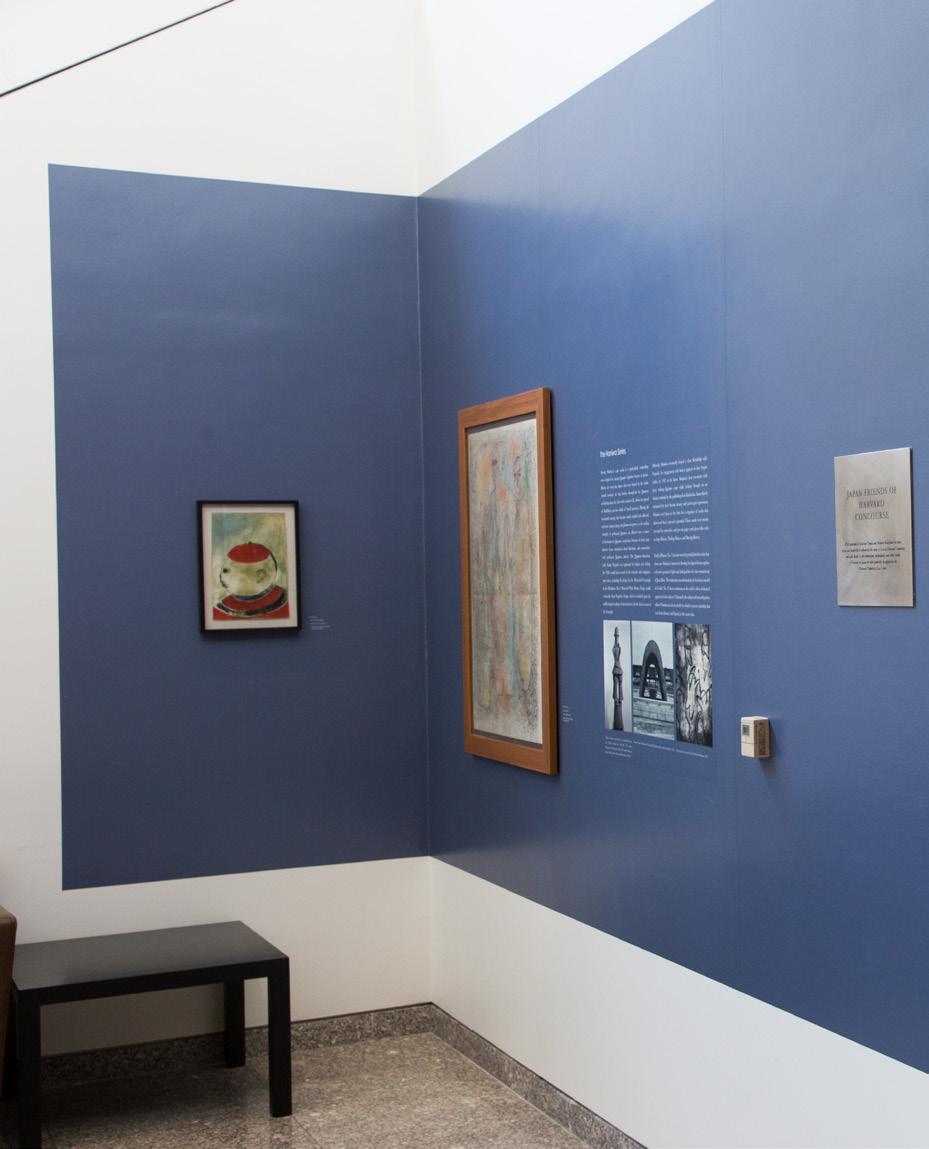
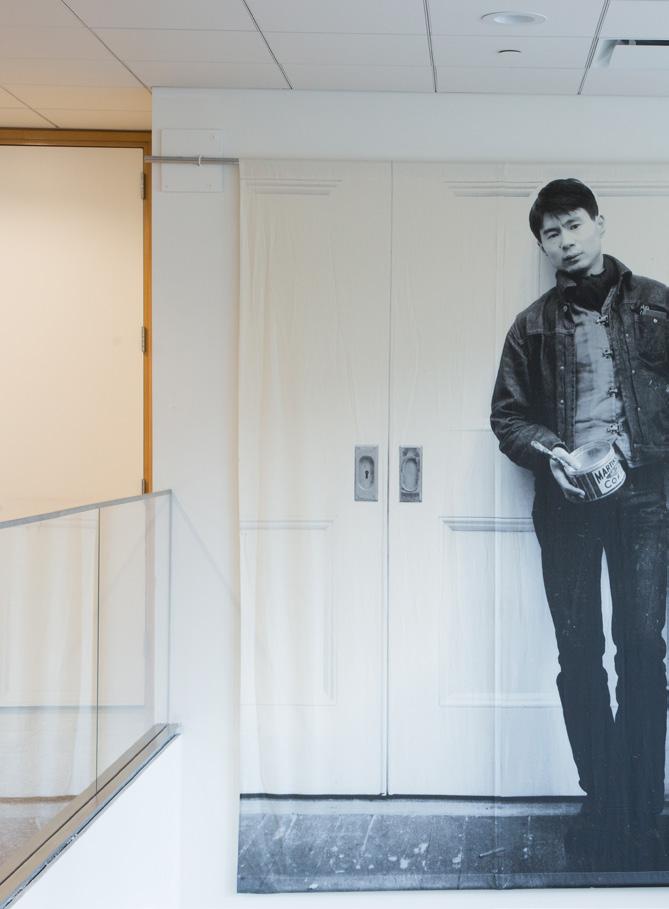

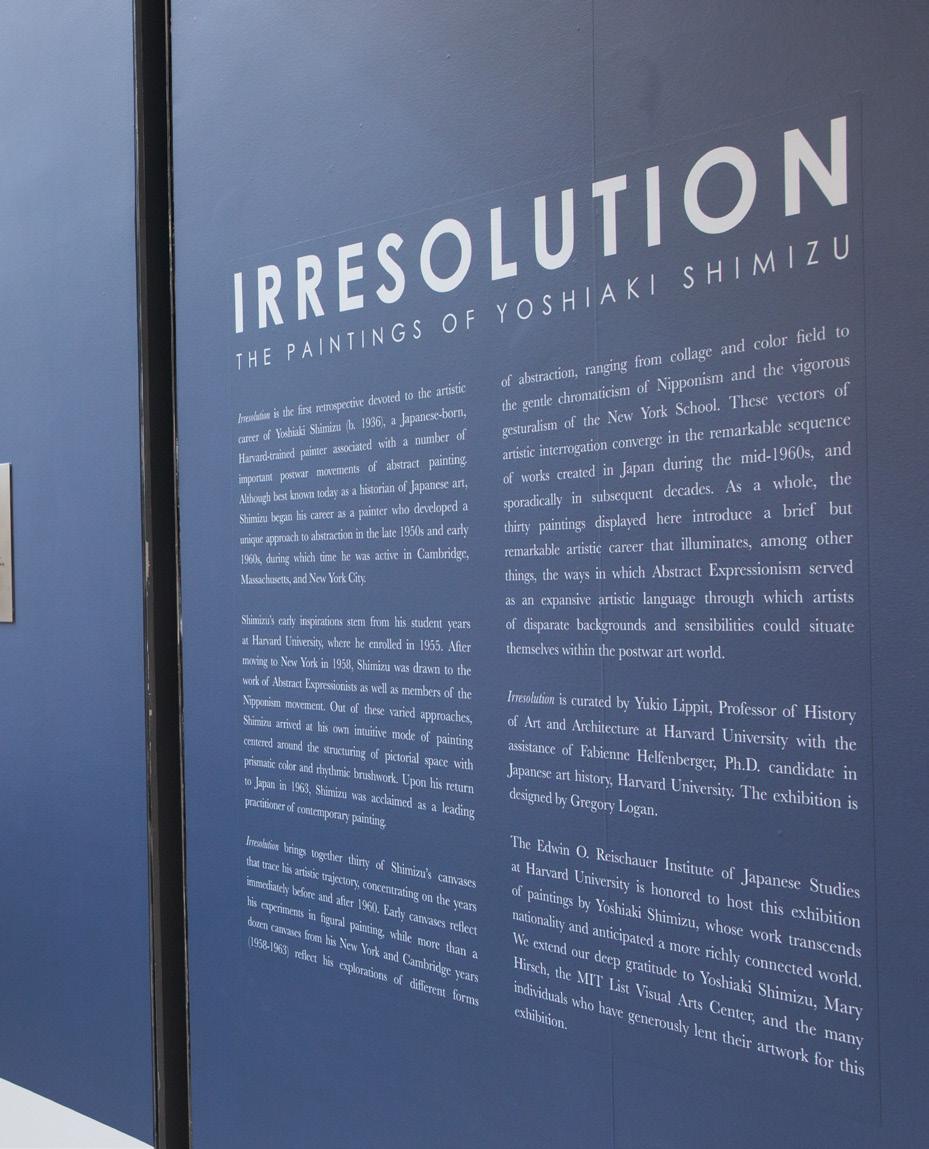
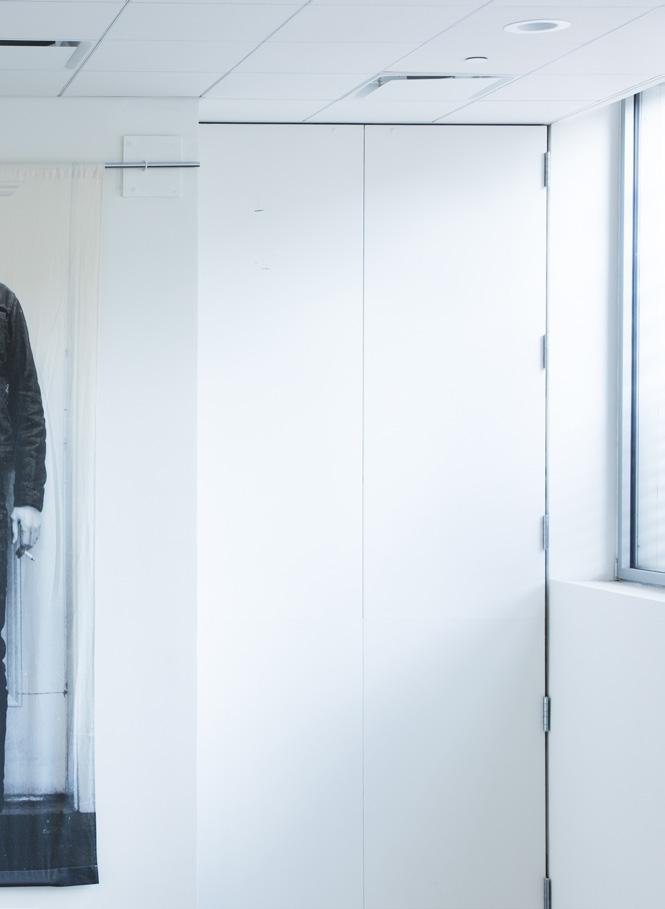

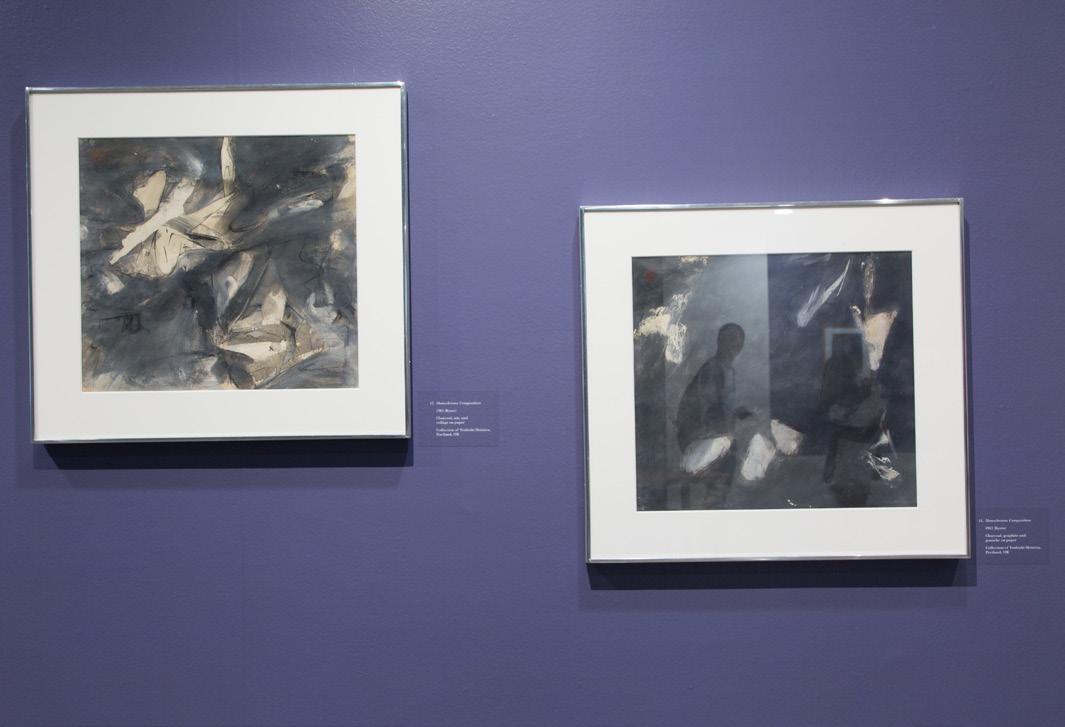
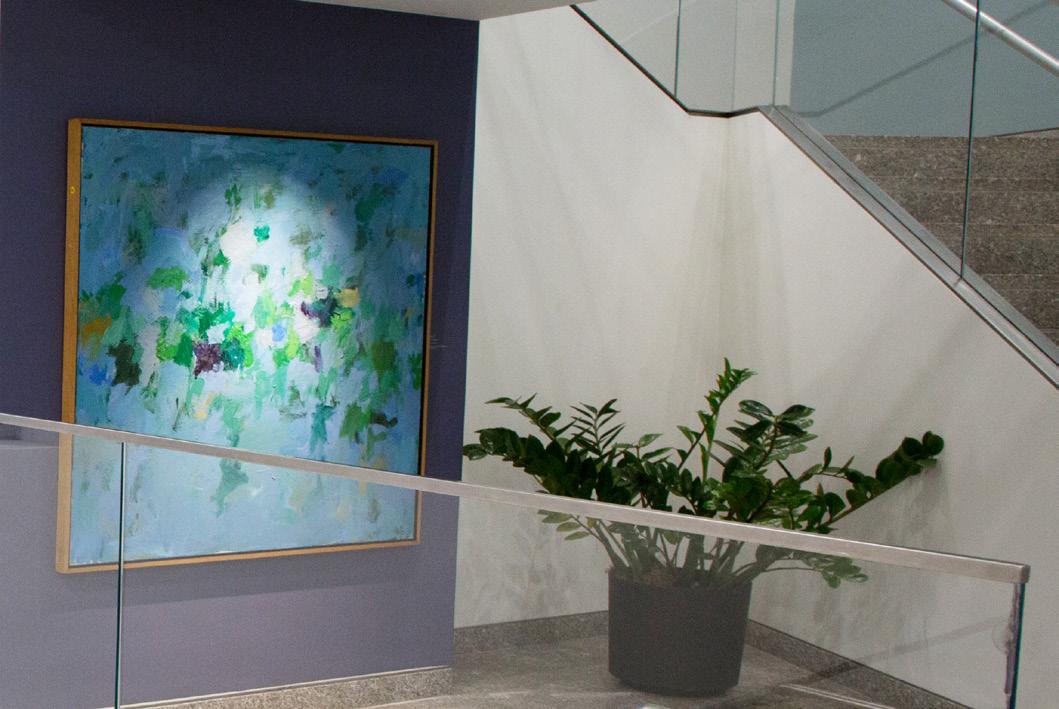
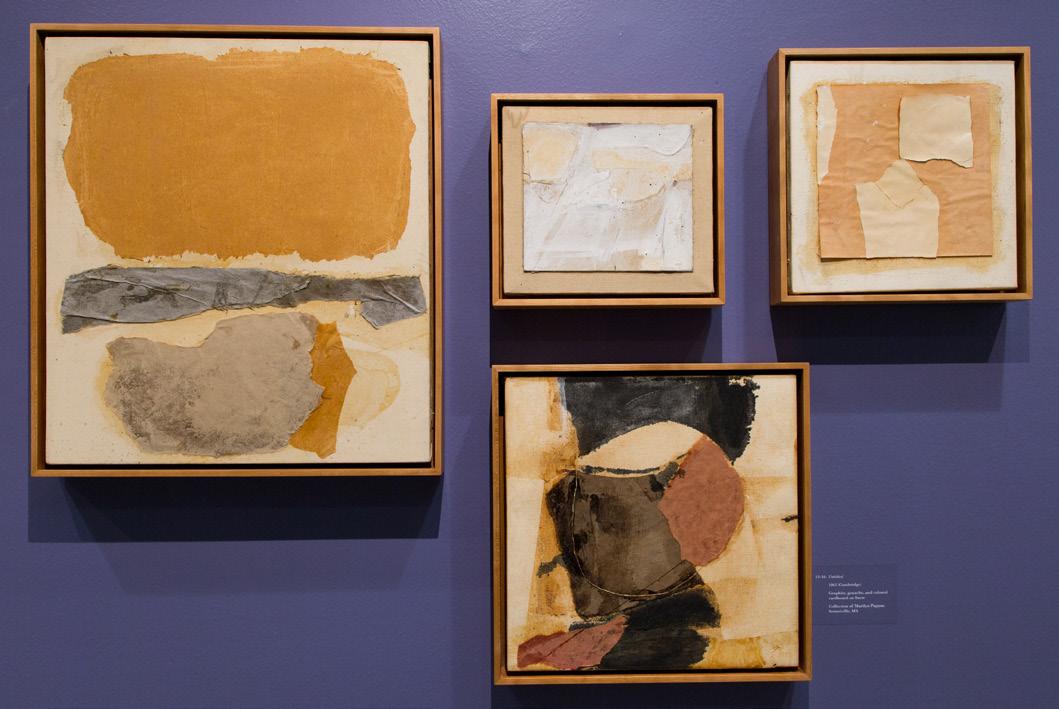
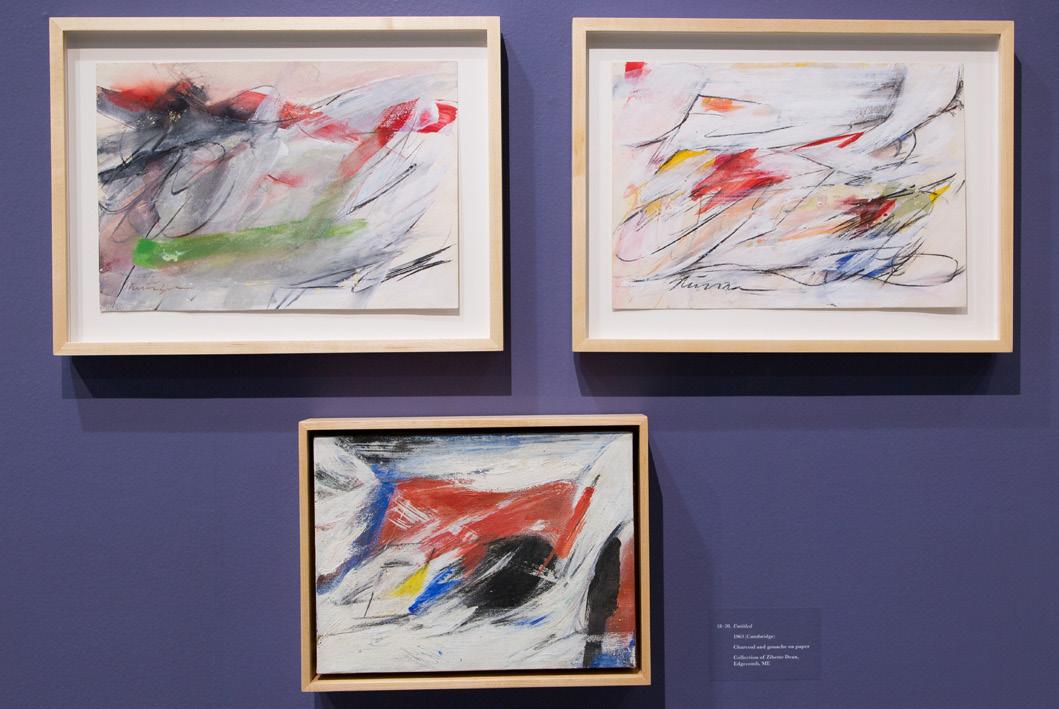
Supporting Harvard’s Educational Mission
No goal of the Reischauer Institute of Japanese Studies (RIJS) is more important than advancing the educational mission of the University. The Institute pursues this task in a number of ways: providing opportunities for undergraduates to study, conduct research, and hold internships abroad; funding grants to support the research and training of graduate students; and enriching the Harvard curriculum by promoting the development of courses on Japan.
Opportunities for Harvard Undergraduate Students
International Experience
Harvard is engaged in a concerted effort to give every undergraduate a significant international experience during his or her time in the College. Long a leader in this area, RIJS has increased its offerings over the past decade to allow more undergraduates to study, conduct research, hold internships, and pursue other related activities in Japan. From fall 2016 through summer 2018, RIJS funded or facilitated 110 such opportunities for Harvard College students and provided support for a wide range of Japan-related student activities.
In 2017-18, RIJS developed the Japan Summer Science Undergraduate Research Program (JSSURP), a new grant opportunity in response to the increasing interest in research experience abroad in the life, physical/ natural, engineering, and applied sciences. This opportunity provides support for non-credit, independent laboratory research at host institutions in Japan.
In cooperation with other Harvard international and regional centers, such as the Office of Career Services (OCS), the Office of International Education (OIE), and Harvard Summer School (HSS), RIJS offers informational events for undergraduate students designed to introduce grants, internships, and study abroad programs. These include the OCS Freshman Open House, OIE Open House, Study Abroad Programs & Perspectives Student Panel, International Education Week/Photo Contest, HSS Study Abroad Fair, and OCS Summer Funding & Programs Fair.
Each fall, RIJS organizes its own meetings for students to introduce programs and opportunities in Japan, and each spring holds a pre-departure meeting required for all summer and fall travelers, as well as orientations for participants of certain programs. In 2016-18, RIJS offered three information sessions for the Internship Program, Science Programs (including HSS RIKEN), and Summer Language Programs/ Study Abroad in Japan (including HSS Kyoto). These programs are made available to students through various funding sources at the University.
Academic Year Study in Japan
A number of well-established programs in Japan accept applications from Harvard students. All of them offer Japanese language instruction and courses in English. They include, in Tokyo: Keio University, International Christian University, Sophia University, University of Tokyo, and Waseda University; and in the Kansai region: Kobe University, Kyoto University, and Nanzan University.
36
In addition, some American colleges and universities run year-abroad programs in Japan that admit students from other institutions. RIJS and the Japanese Language Program (JLP) at Harvard assist students in identifying programs suitable to their interests and language preparation.
Kyoto Consortium for Japanese Studies
Harvard College students with two years of language study may spend an academic year or semester at the Kyoto Consortium for Japanese Studies (KCJS). KCJS, formerly the Kyoto Center for Japanese Studies, offers courses in the Japanese language, humanities, and social sciences. Initially based at Kyoto University from its inception in September 1989, the program moved to its current home at Doshisha University in 2009.
The Consortium is currently headquartered at Columbia University and is sponsored by the following universities: Boston University, Brown University, University of Chicago, Columbia University/Barnard College, Cornell University, Emory University, Harvard University, University of Pennsylvania, Princeton University, Stanford University, Washington University in St. Louis, and Yale University, in association with University of Virginia. RIJS contributed start-up funds and, along with other sponsoring institutions, has made annual financial contributions to the Consortium since it was established. In 2016-18, the Harvard faculty representative was Gavin Whitelaw.
The Inter-University Center for Japanese Language Studies in Yokohama
The Inter-University Center for Japanese Language Studies (IUC) is administered by Stanford University and the Freeman Spogli Institute for International Studies and is currently sponsored by a consortium of sixteen universities (previously fourteen), including Harvard. RIJS contributes annually toward its support.
Summer Grants and Programs
RIJS was among the first of Harvard’s international and regional centers to offer summer funding for undergraduate research abroad, beginning in 1980. In addition to travel grants for senior thesis research, RIJS now awards grants in support of Japanese language study and internships, as well as supplementary grants for Harvard College students attending the Harvard Summer School Kyoto and RIKEN programs or pursuing other science research opportunities in Japan.
See page 42 for a detailed list of grant recipients and program participants.
Henry Rosovsky Travel Grant
Since 1980, RIJS has awarded the Henry Rosovsky Summer Research Travel Grant to students conducting research and/or fieldwork in Japan directly related to a senior honors thesis in an area of Japanese Studies, primarily humanities or social sciences. This prestigious award is made with funds from an endowment established by an anonymous donor to commemorate the retirement of Henry Rosovsky, a distinguished economic historian of Japan, from the post of FAS Dean. Funds from this endowment are divided between the Center for Middle Eastern Studies and RIJS.
In 2013, RIJS expanded the range of support covered by this grant to include supplementary funding for students attending Harvard Summer School in Japan.
37
Harvard Summer Language Study Grant
Created in 2007, the Harvard Summer Language Study Grant is intended to provide students with the opportunity to study Japanese language in its home country and explore Japanese culture. This grant was initially available for students with two years of Japanese or equivalent and subsequently available for those with one year of study at Harvard. In addition to KCJS and IUC, mentioned above, students receive funding to study at other accredited programs such as Princeton in Ishikawa (PII) and Hokkaido International Foundation (HIF).
Harvard Summer Internship Program in Japan
For over twenty-five years, Japanese studies at Harvard has provided opportunities for undergraduates to hold internships in Japan, following the university-wide mission to give every College student a significant international experience. Through this program, eligible students are selected for placement in organizations in Japan, where they learn about local society and culture while gaining professional experience in the workplace. Each year, such opportunities for students continue to diversify with the growing ties of RIJS. The main objectives of the Japan summer internship program are as follows:
• Increase the total number of internship opportunities in Japan and the funding necessary to support them;
• Extend opportunities to students from various backgrounds and experience levels;
• Monitor and coordinate the numerous efforts of the College that offer research, study, and internship opportunities in Japan;
• Organize orientations to provide students with the necessary preparation to derive maximum benefit from their stay;
• Provide a Summer Student Program Coordinator in Tokyo to serve as a resource over the summer for students in Japan.
Established in 1988 by Tazuko Monane, then director of the Japanese Language Program (JLP), the internship program continued to grow with the vital support of JLP, under the guidance of Wesley Jacobsen, program director since 1993. Initially, the program was open only to undergraduates with two years of Japanese, but in 2005, RIJS began a major initiative to extend its internship opportunities to a wider circle of students, creating additional internships for students with little or no Japanese language. And, in 2017, RIJS extended eligibility to first-year students in the Regional Studies East Asia (RSEA) Master’s Program.
In cooperation with JLP, USJRP, OCS, Rotary Club of Okayama, Harvard Club of Japan, Harvard Business School Japan Research Center, several Harvard science departments, and other programs on campus, RIJS has significantly increased the number of internships, coordinating closely to maintain relationships with existing host organizations and identify new ones. Since its inception, Harvard has sent more than 500 undergraduates to intern in locations such as Tokyo, Kyoto, Osaka, Hiroshima, Hokkaido, Ibaraki, Iwate, Miyagi, Okayama, and Okinawa.
In summer 2017, RIJS sent 21 students on internships in Japan, and in summer 2018, RIJS sent 13 students. These included both students placed directly into organizations by RIJS and those who self-arranged internships through different channels, including, but not limited to, faculty, departments, and alumni networks. Working alongside Harvard’s student service and resources offices, RIJS also supports students by providing small supplementary grants and by including them in orientation activities. The Summer Student Program Coordinator was Subodhana Wijeyeratne in 2017 and 2018.
38
Harvard Summer School in Japan
In 2007, under the leadership of RIJS, Harvard Summer School developed a credit-based, 8-week summer program in Japan. Initially hosted by Waseda University in Tokyo, the program moved to Doshisha University in 2010. Students enroll in two courses, which are also open to Doshisha students. In 2016-18, the courses included: “Inequality and Society in Contemporary Japan” (Mary Brinton) and “East Asian Religions – Traditions and Transformations” (James Robson). Non-credit Japanese language instruction with Doshisha staff is also provided for students with no previous Japanese language training. Additionally, HSS offers two science-focused programs in Japan. Initiated as an internship opportunity in 2006 by Takao Hensch, the program at RIKEN Brain Science Institute (BSI) in Tokyo became a forcredit offering through HSS in 2008, while a similar program at RIKEN Research Center for Allergy and Immunology (RCAI) in Yokohama was established in 2008 and became an HSS course in 2009. Since then, RCAI became the Center for Integrative Medical Sciences (IMS) in 2013, and BSI was renamed the Center for Brain Science (CBS) in 2018. In 2016-18, the course offerings were “Laboratory Research in Neurobiology” and “Exploring and Emulating the Brain” (2016-17)/ “Untangling the Brain – Cognition, Memory, and Consciousness” (2017-18) at BSI/CBS and “Reading and Research in Integrative Medicine” and “State of the Art in Immunology” at IMS. All of these courses were overseen by Takao Hensch.
Japan Summer Science Undergraduate Research Program
Launched in 2018 in response to the increasing interest in research experience abroad in the sciences, the Japan Summer Science Undergraduate Research Program (JSSURP) provides support for non-credit, independent laboratory research at host institutions in Japan. This opportunity is designed to prepare Harvard College students in life, physical/natural, engineering, and applied sciences for post-baccalaureate research positions, graduate/doctoral study, and postgraduate fellowships. Successful applicants receive a grant package put together by RIJS and the host institution, which primarily supports travel and accommodation. In its inaugural year, RIJS supported science research opportunities for 19 students.
This new program also includes non-credit internships at various RIKEN centers, established through the efforts of Takao Hensch, and the Japan-US Undergraduate Research Exchange Program (JUREP), a physics research opportunity founded and directed by John Doyle. Participants of either program are eligible to apply for funding through RIJS.
Enrichment at Harvard
Noma-Reischuaer Undergraduate Prize in Japanese Studies
Each year, RIJS conducts a competition to award the Noma-Reischauer Prize of $1000 to the best Harvard College student essay on a Japan-related topic. The Prize was established and supported from 1996 through 2010 by Kodansha Publishers in honor of Sawako Noma, then President of Kodansha, and Professor Edwin O. Reischauer. Since 2011, the prize has been funded by RIJS and awarded in conjunction with the Tazuko Monane Prize for Language Study, given by the Japanese Language Program. In 2016-17, the Prize winners were Cansu Çolakoğlu ’16 (Social Studies), for “How Cultural Ideology Shapes Lawmaking: A Comparative Study of Gendered Lawmaking in Japan and Turkey,” and Kathy Lam Tran ’16 (Anthropology and Linguistics), for “Rising to One’s Potential: Joshi Ryoku and the ‘Power’ of Femininity in Japan.” In 201718, the Prize winner was Ashley Asencios ’17 (EAS), for “Kokusai Kekkon: International Romance in Japan.”
39
Reischauer Institute of Japanese Studies Prize, OIE International Photo Contest
In fall 2006, RIJS collaborated with OIE to inaugurate the sponsorship of a Japan category within Harvard College’s annual International Photo Contest. The students and their photos are listed below.
2016
RIJS Prize: Louiza Bovaeva ’19 “Architected Nature” (Shiga)
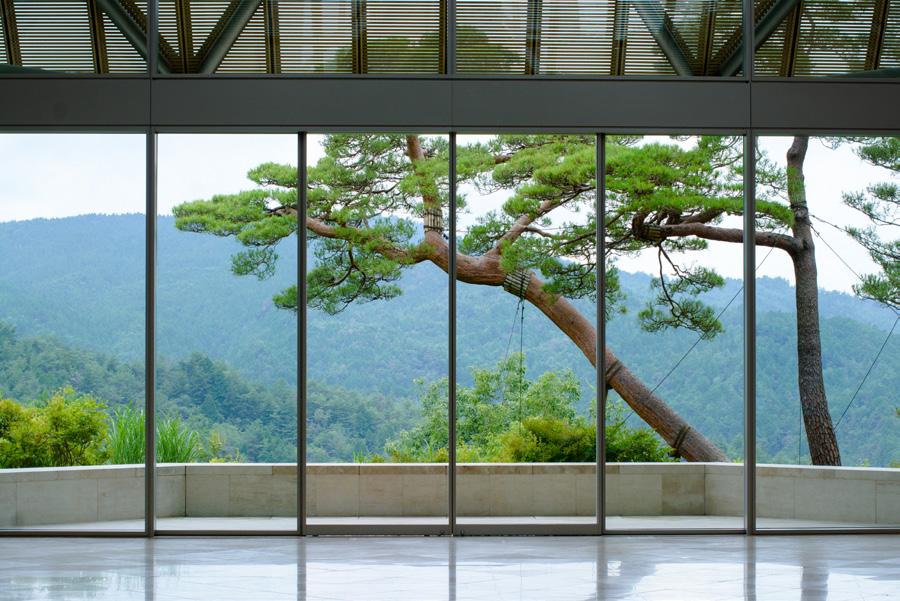
Honorable Mention: Hunter Simmons ’17 “Canal” (Osaka)

Honorable Mention: Ryosuke Takashima ’19 “From Top of the Top” (Shizuoka)
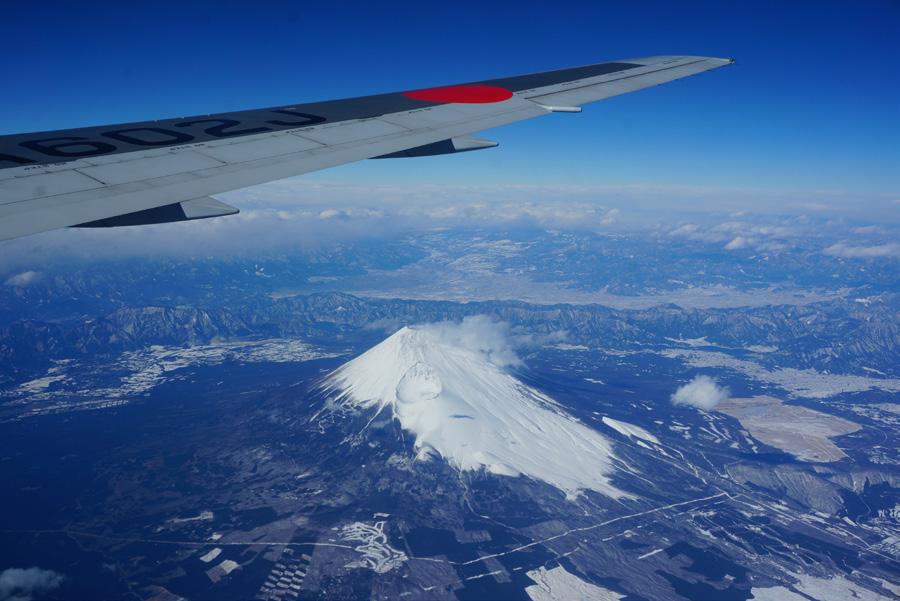
2017
RIJS Prize: Krystal Phu ’19 “Nagato-cho Embraces Hie-jina” (Tokyo)

Honorable Mention: Nicole Flett ’18 “Autumn Illumination” (Kyoto)
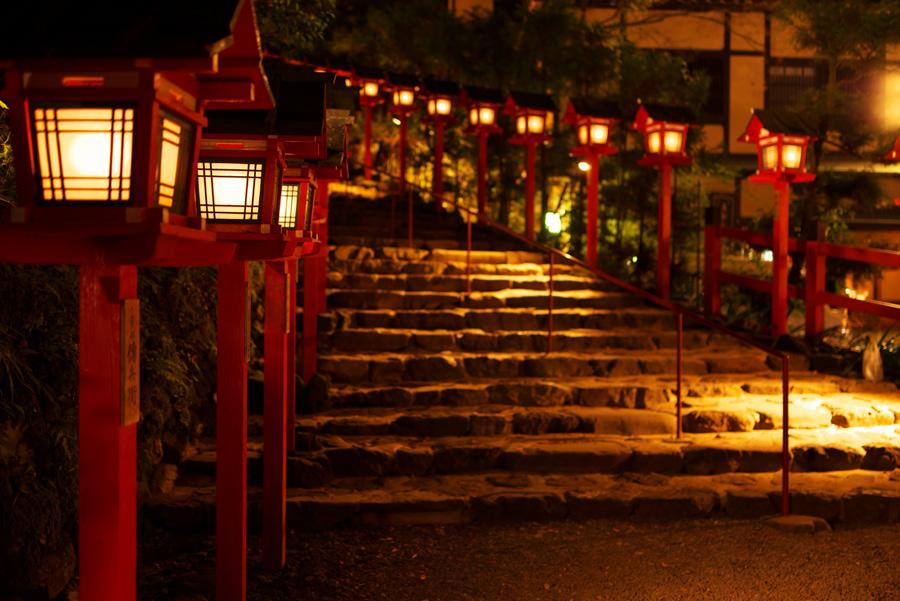
40
Japanese Language Table
Since fall 2008, RIJS has hosted a monthly Japanese language table at CGIS. Now co-hosted with USJRP, the language table provides a space for an enthusiastic group of undergraduate and graduate students, postdoctoral fellows, faculty, RIJS visiting scholars, and USJRP associates to converse in Japanese and discuss a wide range of topics over lunch.
Support for Undergraduate Activities
Harvard-Radcliffe Chado Society
A student group dedicated to learning chanoyu (“Japanese tea ceremony”), this organization strives to learn the traditional ways to prepare, serve, and drink tea. While officially an undergraduate organization, the chado society also welcomes graduate students, non-student Harvard affiliates, and non-Harvard students. Participants study the Way of Tea in the tradition of the Urasenke School, and the instructors are all members of Urasenke Boston, the local affiliate of the Kyoto-based Urasenke organization. The head of the international organization is Sen Soshitsu XVI, a direct descendant of one of the first Japanese tea masters, Sen no Rikyu. In 2016-18, RIJS supported weekly meetings as well as occasional tea ceremony events.
Harvard-Radcliffe Kendo Club
Founded in 1990 by four undergraduates, the Harvard-Radcliffe Kendo Club is one of the oldest collegiate kendo clubs in North America. Open to both undergraduate and graduate student members, the club maintains close ties with the Keio University Kendo Club, whose leader, Fumio Ueda, 7th dan kyoshi, is also the head coach of the Harvard team. Former RI Visiting Scholar Junji Himeno, 7th dan, coached this team during his time at Harvard, and in 1997 former Prime Minister Ryutaro Hashimoto, a leading kendo player, practiced with the club on a visit. Wesley Jacobsen serves as Harvard faculty advisor. In 2016-17, RIJS provided support to club activities and events.
Harvard Aikido Club
RIJS provides support to the Harvard Aikido Club (Aikikai), which brings together Harvard students to practice aikido and to study the principles and techniques behind the sport. Harvard’s oldest martial arts club, the group holds practices, classes, and seminars at the Malkin Athletic Center and the Quadrangle Recreation and Athletic Center. In 2016-18, RIJS provided support to club activities and events.
41
Undergraduate Japan Experience 2016-17
JUREP = Japan Undergraduate Research Exchange Program
KCJS = Kyoto Consortium for Japanese Studies, Kyoto
PII = Princeton in Ishikawa, Kanazawa
BSI = RIKEN Brain Science Institute
IMS = RIKEN Center for Integrated Medical Sciences
IRCN = University of Tokyo International Research Center for Neurointelligence
OIST = Okinawa Institute of Science and Technology
Study Abroad in Japan
Michaela Kane ’18
Statistics, Associated Kyoto Program (Fall 2017)
Henry Rosovsky Summer Research Travel Grant
Shane Campayne ’18
EAS, “LGBTQ+ Issues and Japanese Popular Culture”
Summer Language Study Grant
Frank Cahill ’20, Undeclared, PII
Jaden Freeze ’19, Chemistry & Physics, PII
Devon Gunter ’20, Undeclared, PII
Rebecca Hao ’20, Undeclared, PII
Walter Paiva ’20, Undeclared, PII
Jennifer Tu ’20, Undeclared, PII
Summer Intership Program in Japan
Westley Cook ’20
Undeclared, ISA, Inc. (various locations)
Alice Donnellan ’20
Undeclared, Showa Women’s University (Tokyo)
Koji Everard ’20
Undeclared, Wall Street Journal (Tokyo)
Jacob Gollub ’18
Computer Science/Statistics, Hikari Tsushin (Tokyo)
Michaela Kane ’18
Statistics, Hikari Tsushin (Tokyo)/
Hokkaido Japanese Language School (Sapporo)
Jieun Kang ’19
Government, Active Learning (Tokyo)
Anthony Kuno-Lewis ’19
ESPP, Kahoku Shimpo (Sendai)
Allison Lee ’20
Undeclared, Internet Business Japan (Tokyo)
Christina Li ’19
Neurobiology, Tokyo Institute of Technology (Tokyo)
Shenghan Lu ’17
Psychology, NEXT Legal Corporation (Tokyo)
Eagon Meng ’18
Neurobiology, teamLab (Tokyo)
Grace Pan ’20
Undeclared, Active Learning (Tokyo)
Russell Reed ’20
Undeclared, Asian Development Bank Institute (Tokyo)
Kayla Roche ’19
Psychology, RIKEN BSI (Tokyo)
CPB = Chemical & Physical Biology
CNEP = Cognitive Neuroscience & Evolutionary Psychology
ESE = Environmental Science & Engineering
ESPP = Environmental Science & Public Policy
HDRB = Human Developmental & Regenerative Biology
MCB = Molecular & Cellular Biology
Olga Romanova ’19
Bioengineering, HBS Japan Research Center (Tokyo)
Alex Simon ’18
Government, Jenerate Partners, Inc. (Tokyo)
Ryosuke Takashima ’19
ESE, Euglena Co., Ltd. (Tokyo)
Raymond Tang ’19
Neurobiology, Tokyo Institute of Technology (Tokyo)
Anthony Volk ’18
EAS/Government, Office of Representative Taro Kono (Tokyo)
Lily Xu ’19
CPB, RIKEN IMS (Yokohama)
Amanda Yang ’19
EAS, Showa Women’s University (Tokyo)
HSS at Doshisha University, Kyoto
Dragos Bugai ’20, Undeclared
Abigail Burke ’19, Social Sciences
Keiran Carpen ’19, Chemistry & Physics
Jacqueline Chea ’19, Integrative Biology
Esteban Flores ’20, Undeclared
Haozhou Gu ’20, Undeclared
James Jacoby ’19, Psychology
Byung Ju Min ’19, Columbia University, French Language and Literature
Joseph Pitaluga ’18, University of St Andrews, Geography
Yong Han Poh ’20, Undeclared
Sabrina Richert ’20, Undeclared
Roy Segal ’19, Columbia University, EAS
Sabrina Wong ’20, Undeclared
Isabel Wu ’20, Undeclared
HSS at RIKEN BSI, Tokyo
Daniel Chafmo ’19, Computer Science
Michael Liu ’19, HDRB
Seiya Lu ’19, Neurobiology
Deepika Kurup ’19, Neurobiology
Anna Vaynrub ’20, Undeclared
HSS at RIKEN IMS, Yokohama
Gui Zhen Chen ’19, MCB
Krystal Phu ’19, HDRB
Okinawa Institute of Science and Technology
Kristen Fang ’19, HDRB
Ellie Underwood ’19, Neurobiology
42
Undergraduate Japan Experience 2017-18
Study Abroad in Japan
Marcia Lagesse ’19
Economics, KCJS (Spring 2018)
Henry Rosovsky Summer Research Travel Grant
Anthony Kuno-Lewis ’19
ESPP, “An Environmental History of the Miyagi Oyster”
Summer Language Study Grant
Esteban Flores ’20, EAS/Philosophy, KCJS
Raymond Hunt ’21, Undeclared, KCJS
Yong Han Poh ’20, EAS/Anthropology, KCJS
Summer Intership Program in Japan
Ikeoluwa Adeyemi-Idowu ’19
Undeclared, Showa Women’s University (Tokyo)
Dragos Bugai ’20
Applied Mathematics, Jenerate Partners, Inc. (Tokyo)
Sabrina Chok ’20
EAS, P&E Directions (Tokyo)
James Clay ’21
Undeclared, Active Learning (Tokyo)
Westley Cook ’20
EAS/Social Studies, Rikuzentakata/Iwate University (Rikuzentakata)
Natalie Dabkowski ’21
Undeclared, International Christian University (Tokyo)
Koji Everard ’20
History, HBS Japan Research Center (Tokyo)
Kenneth Kim ’21
Undeclared, Internet Business Japan (Tokyo)
Dianne Lee ’20
Computer Science, Internet Business Japan (Tokyo)
Sophia Li ’21
Undeclared, Active Learning (Tokyo)
Sky Russell ’20
HAA, MORIUMIUS (Ishinomaki)
Gabin Ryu ’20
Statistics, Internet Business Japan (Tokyo)
Grace Pan ’20
Undeclared, Active Learning (Tokyo)
Jennifer Tu ’20
EAS, Showa Women’s University (Tokyo)
Japan Summer Science Undergraduate Research Program
Mohammad Abdulghani ’19
HDRB, University of Tokyo IRCN
Simon Arango Baquero ’21
Undeclared, Hiroshima University
Daniel Chang ’20
Engineering Sciences, Tokyo Institute of Technology (Tokyo)
Christopher Chen ’21
Undeclared, Hiroshima University
Kevin Dai ’20
Computer Science, University of Tokyo IRCN
Jaden Freeze ’19
Chemistry & Physics, Kyoto University JUREP
Vismaya Kharkar ’21
Undeclared, Hiroshima University
Min Kyo Kim ’19
Applied Mathematics, RIKEN BSI
Luke Kramer ’19
Chemistry, OIST
Dogus Mordeniz ’20
Computer Science/Engineering Sciences, RIKEN Center for Advanced Intelligence Project
Jungyeon Park ’20
CPB, Hiroshima University
Matthias Pergams ’19
Integrative Biology, OIST
Claire Pinson ’19
CNEP, Kyoto University
Brittan Smith ’20
HDRB, Hiroshima University
Matthew Spence ’20
Neurobiology, Hiroshima University
Justin Sydloski ’20
Neurobiology, University of Tokyo IRCN
Ellie Underwood ’19
Neurobiology, University of Tokyo IRCN
Diana Wang ’20
Neurobiology, University of Tokyo IRCN
Phelan Yu ’19
Physics/Math, Kyoto University JUREP
HSS at Doshisha University, Kyoto
Jordan Aguiar-Lucander ’21, Undeclared
Gaoyoung Choi ’21, Undeclared
Jonathan Eddy ’19, CPB
Cesar Haig ’21, Undeclared
Sarah Hong ’21, Undeclared
Connor Jacobson ’18, Psychology
Katherine Jefferson ’20, Columbia University, Computer Science
Mingsi Ma ’20, New York University, Music Business
Allie Quan ’21, Undeclared
Bailee Sharpe ’21, Undeclared
Xinyue Xu ’21, Undeclared
Yujie Zhang ’21, Sarah Lawrence College, Undeclared
HSS at RIKEN BSI, Tokyo
Channing Cimarusti ’20, Neurobiology
Chloe Li ’20, Neurobiology
HSS at RIKEN IMS, Yokohama
Shivani Aggarwal ’21, Undeclared
Terza Hill ’20, Neurobiology
Eugene Oh ’20, Neurobiology
Gabriela Pelayo ’21, Undeclared
43
Support for Graduate Student Training
RIJS supports GSAS and the future development of Japanese Studies by providing a range of fellowships and grants to Harvard graduate students.
Research and Training Support
Dissertation Completion/Supplementary Dissertation Research Grants
RIJS awards Dissertation Completion Grants to support advanced graduate students in the full-time write-up of their dissertations and Supplementary Dissertation Research Grants to provide graduate students whose fieldwork was initially supported through external funding sources (such as Fulbright and Japan Foundation) with the opportunity to continue their research in Japan or other parts of the world. In the case of nonUS citizens, thus ineligible for many of the major fellowships that support fieldwork in Japan, these grants provide the core funding for their fieldwork.
For 2016-18, RIJS awarded Dissertation Completion or Supplementary Dissertation Research Grants to 12 doctoral students, 5 in 2016-17 and 7 in 2017-18, representing a cross-section of academic departments: EALC, EALC/HEAL, History, History of Art and Architecture, Music, and Religion.
Summer Research Travel Grants for Graduate Students
RIJS awards Summer Research Travel Grants to allow graduate students to deepen their knowledge of Japan, maintain and improve their Japanese language skills, and develop ideas, investigate sources, and build contacts in Japan for future dissertation research. In the case of comparative projects that include Japan, graduate students also may apply for funding to conduct research in another country.
In 2016-18, RIJS gave 22 Summer Research Travel Grants to Japanese Studies graduate students in the humanities and social sciences, 13 for summer 2017 and 9 for summer 2018.
Summer Language Study Grants for Graduate Students
RIJS also provides grants to graduate students (both PhD and MA) to support summer language study in programs in Japan and elsewhere. Especially in the social sciences, some students develop their interest in Japan only after entering graduate school and need additional time to build their language skills to researchlevel competence. Normally the language is Japanese, though applications for other languages are encouraged from students whose research would be furthered by another language or students who are engaged in comparative research that involves Japan.
In 2016-18, RIJS gave 26 Summer Language Study Grants to graduate students, 14 for summer 2017 and 12 for summer 2018.
The Inter-University Center for Japanese Language Studies in Yokohama
Graduate students with at least two years of Japanese language training who want to devote an academic year to full-time advanced Japanese language study may apply to the Inter-University Center for Japanese Language Studies Program (IUC), located in Yokohama. On behalf of Harvard, RIJS supports the IUC by providing a yearly membership fee of $10,000.
44
Noma-Reischauer Graduate Student Essay Prize
Each year, RIJS conducts a competition to award the Noma-Reischauer Essay Prize of $1500 for the best Harvard graduate student essay on a Japan-related topic. The Prize was established and supported from 1996 through 2010 by Kodansha Publishers in honor of Sawako Noma, then President of Kodansha, and Professor Edwin O. Reischauer. Since 2011, the prize has been funded by RIJS and awarded in conjunction with the Tazuko Monane Prize for Language Study, given by the Japanese Language Program.
The 2016 Prize winner was Daniel Joseph, RSEA ’16, for his essay “A Monk of Good and Evil: The Benkei Otogizōshi, Including Translations of Musahibō e-engi, Hashi Benkei, and Jizori Benkei.” The 2017 Prize winner was Subodhana Wijeyeratne, History, for his essay, “Death Rays to Diesel Engines: Technology Seizure and Collaboration in Occupied Japan, 1945-1952.”
Professional and Write-up Support
Professional Development
RIJS seeks to contribute to the professional development of graduate students in a variety of ways. Beginning in 2005 with the construction of the CGIS buildings, RIJS made space available for doctoral students engaged in dissertation write-up (see Advancing Research). RIJS provides funds for graduate students to meet and discuss their research in progress, and graduate students are also encouraged to interact with RIJS visiting scholars, either informally or through the Student Host Program (see Advancing Research). In addition, RIJS provides small grants to graduate students for paper presentations at conferences or professional meetings, for the purposes of professional development and dissemination of dissertation research. Students in relevant fields may also apply for small grants that cover travel costs for job interviews held at professional meetings. RIJS awarded 25 conference attendance grants in 2016-18.
Support for Dissertation Writers Groups
RIJS recognizes that dissertation writing can be a lonely pursuit and that many students benefit from support and comments from their peers. In 2016-18, the Institute continued to make funding available to groups of graduate students in Japanese Studies looking to meet on a regular basis to discuss their dissertations.
Support for Student Groups
Harvard Buddhist Studies Forum
The Harvard Buddhist Studies Forum (HBSF) is a long-standing lecture series that invites scholars to present on a topic related to the field of Buddhist Studies, while promoting a wide range of disciplines, geographical areas, and methodologies. As Buddhist Studies is a highly interdisciplinary and cross-regional field, RIJS joins with other programs at Harvard in supporting scholarly activities in this area of research. In 2016-18, the Institute contributed support to the following lectures:
45
5 December 2016
Ryūichi Abé, Harvard University
The Buddha and the Dragon Princess in the Lotus Sutra — for deciphering the Devadatta frontispiece in the Heike Nokyo set
1 May 2017
Michaela Mross, Stanford University
“Just Singing”: Kōshiki in Contemporary Sōtō Zen
25 September 2017
Caleb Carter, Johns Hopkins University
Inventing a History for a Young Tradition: Early Modern Shugendō at Mount Togakushi
12 February 2018
Bryan Lowe, Vanderbilt University
Preaching to the Periphery: Buddhism in Provincial Villages in Ninth -Century Japan
Harvard East Asia Society
The Harvard East Asia Society (HEAS) is organized by students in the RSEA program and is open to all those with an interest in East Asian cultures, history, and society. Students organize individual talks and an annual spring conference designed to provide an interdisciplinary forum for graduate students from the US and elsewhere to exchange ideas and discuss current research on East Asia with peers, professors, and professionals. In 2016-18, the conference was co-sponsored by the Asia Center, Fairbank Center, Korea Institute, Weatherhead Center, and RIJS.
The 20th annual HEAS graduate student conference was held 25 February 2017 on the theme “Roads Through Asia.” Michael Puett and Theodore Bestor gave the keynote addresses. The 21st annual conference was held 9-10 February 2018 on the theme “(De)constructing Boundaries.” Karen Thornber and John Park gave the keynote addresses.
Harvard Graduate Conference on International History
The Harvard Graduate Student Conference on International and Global History (Con-IH) is organized by Harvard graduate students who are immersed in the field of international history. The conference selects 12 graduate students from around the world to participate in a two-day conference to present and discuss cutting-edge scholarship in various themes of international and global history.
RIJS provided support to the 17th annual Con-IH, held 9-10 March 2017 on the theme “Migration, Immigration and Diaspora.”
Curriculum and Teaching
Curriculum Enrichment Grants
In the educational experience of Harvard College students, General Education (Gen Ed) courses, formerly Core courses, play a crucial and central role. As such, RIJS mounted a major initiative to increase the number of these courses dealing with Japan. The Institute also supported non-Japan specialists to add material on Japan to Harvard College courses they already offered or were developing. Cumulatively these courses have played an important role in bringing Japan more fully into the undergraduate educational experience.
48
46
Harvard College Core/Gen Ed Courses Developed under the Curriculum Enrichment Grant Program
Ryūichi Abé, EALC
Core: Foreign Cultures, Buddhism and Japanese Culture
Gen Ed: Aesthetic and Interpretive Understanding, Buddhism and Japanese Culture
Theodore C. Bestor, Anthropology
Core: Foreign Cultures, Tokyo
Gen Ed: Societies of the World, Tokyo
Ian J. Miller, History
Core: Historical Study, Japan’s Modern Revolution
Gen Ed: Societies of the World, Japan’s Samurai Revolution
Support for Departmental Teaching
Mary C. Brinton, Sociology
Gen Ed: Societies of the World, Inequality and Society in 21st-Century East Asia
Andrew Gordon, History
Core: Historical Study, Tradition and Transformation in East Asian Civilization: Japan
Gen Ed: Societies of the World, Japan in Asia and the World
Shigehisa Kuriyama, EALC
Gen Ed: Culture and Belief, Medicine and the Body in East Asia and Europe
RIJS encourages faculty and departments to invite outstanding scholars or other specialists of Japan to Harvard in order to enhance the educational experience in their particular field. Typically, visitors appear in classes and meet with faculty and students. RIJS also supports course excursions, travel, and other related activities. The Institute provides funding to these visits and activities, as well as funding for Harvard faculty to travel to Japan for purposes that will ultimately contribute to the educational experience of students.
The interest in Japan is broad among Harvard faculty and students and among the general public, extending to numerous art forms associated with Japanese culture, including film, kabuki, Noh drama, martial arts, tea ceremony, ikebana, and many others. RIJS plays an active role in sponsoring activities in which these cultural forms are linked to the educational mission of the University.
Graduate School of Design
From 10-18 September 2016, Toshiko Mori led a group of GSD students on a trip, part of their fall architecture studio course, titled “Fukuoka Project: Strategies for Urban Extroverts.” At the invitation of the mayor of Fukuoka City in Kyushu, Japan, the group was tasked with developing a contemporary vision for a new urban center, following the move of University of Kyushu’s Hakozaki Campus. Kicking off the semester, the trip included a tour of the city and its immediate surroundings, in order to fully understand Fukuoka’s history and contemporary context.
The studio focused on historic preservation of modernist buildings, ecology and conservation of historic landscapes, contemporary principles of urban innovation, and the integration of these principles into an educational mission for future programs. The studio also studied their designated site in its relationship to the city’s geography, history, and culture. Based on these themes, students proposed planning strategies and architectural prototypes. On 11 November, findings and insights were presented at an international symposium on urban innovation hosted by the City of Fukuoka.
Academic Exchange Agreements
RIJS has established a number of academic exchange agreements with universities in Japan. The initial agreement was made with Kokugakuin University, beginning in July 2000 and renewed every five years. RIJS has hosted a number of visiting scholars from Kokugakuin, and Harvard graduate students in Japanese Studies have received accommodations and extensive assistance in their research at Kokugakuin.
In fall 2011, RIJS concluded exchange arrangements with Taishō University and Rissho University for the purpose of promoting academic research. Both agreements include the exchange of faculty members, the exchange of advanced graduate students engaged in dissertation research, and other items deemed mutually beneficial.
49 47
Graduate Research and Training 2016-17
Supplementary Dissertation Research Grants
Peter Bernard, EALC
Rural Japanese Gothic: The Topography of Terror in Modern Japanese Literature
Michael Kushell, Music
The Poetics of Place, Self, and Performance in Japan’s Regional Kabuki Theater
Maria Joelle Tapas, EALC
Modelling Modernity in Japanese Children’s Media
Floris van Swet, EALC
Reconfiguring Ronin: Identity, Unemployment nd Social Dislocation in the Wake of Japan’s 16th Century Unification
Subodhana Wijeyeratne, History
Red Sun Rising: Rocketry, Space Exploration, and the Construction of Japan, 1930-2003
Summer Research Grants
Becky Keungyoon Bae, EALC
A Hall of Mirrors: Negotiating Filmmaking Across the Japanese Empire
Zoe Eddy, Anthropology
Archaeology and Ethnography in Hokkaido, Japan
John Hayashi, History
Archival Research on Water Management in Colonial Taiwan
Sara Kang, RSEA
Daughters of Aggressors, Sisters of Victims of Transnational Feminism and the American Occupation of Japan and Korea
Yusung Kim, EALC
Visual and Textual Representations in Japan’s Techno-Fantasy During the Cold War
Janet Louie, RSEA
Parodies of Western Media in Japanese and Taiwanese Homoerotic Manga Narrative Form
Naohito Miura, HDS (MDiv)
Shinto-derived Japanese NRMs in Africa and Their Sacred Spaces in Japan
Jonas Ruegg, EALC/HEAL
Maritime Peripheries and Transnational Contracts in Early Modern East Asia
Eric Swanson, EALC
Buddhist Subjugation Rituals in Premodern and Modern Japan
Susan Taylor, Anthropology
Translation into and out of Japan: Nationalism, Public Sphere, and the Commodification of Experience in Two Tokyo Book Cafes
Botagoz Ussen, Comp Lit
The Reception of Russian Literature in Japan
Rebecca Voelcker, VES
Weathering Contemporary Documentary from Japan
Daniel Walden, Music
An Ideal Music: Tanaka Shohei’s Enharmonic Technologies and the Cultural Politics of Tuning and Temperament in Germany and Meiji
Summer Language Study Grants
Daniel Borengasser, EALC, IUC
Adam Frost, EALC/HEAL, PII
Carrie Zhe Geng, Comp Lit, IUC
Nicole Inostroza, Romance Lang & Lit, KCJS
Leah Justin-Jinich, EALC
Graduate Summer School in Japanese EarlyModern Paleography, Emmanuel College at the University of Cambridge (Cambridge, England)
Sara Klingenstein, Religion, IUC
Jesse LeFebvre, EALC
International Chinese Language Program National Taiwan University (Taipei, Taiwan)
Canaan Morse, EALC, IUC
Hubert Remillard, RSEA, IUC
Helen Swift, HAA, KCJS
Dominic Toscano, EALC, IUC
Catherine Tsai, EALC, IUC
Huanruo Wang, EALC, KCJS
Wenchu Zhu, RSEA, KCJS
Conference Attendance Grants
Julia Alekseyeva, Comp Lit
Modern Language Association Annual Convention, Philadelphia, PA
Daniel Borengasser, EALC
Annual Arts and Medias Symposium, Montreal, Canada
Mycah Brazelton-Braxton, EALC Writing and Picturing in Post-1945 Asian Art, Chicago, IL
Andrew Campana, EALC European Association for Japanese Studies Conference, Kobe, Japan
Sara Klingenstein, Religion
Ocha Zanmai: 2017 International Conference on Chanoyu and Tea Cultures, San Francisco, CA
Lina Nie, RSEA
Annual Japan Studies Association Conference, Honolulu, HI
Chiaki Nishijima, Anthropology
American Anthropological Association Annual Meeting, Minneapolis, MN
Jonas Ruegg, EALC/HEAL
Association for Asian Studies Conference, Toronto, Canada
Graduate History Association Conference, St. Louis, MI
Kimberlee Sanders, EALC
Participation in Hatsune Miku Expo, Toronto, Canada
Maria Joelle Tapas, EALC
Association of Japanese Literary Studies, University Park, PA
Michael Thornton, History
European Association of Urban History Conference, Helsinki, Finland
Association for Asian Studies Conference, Toronto, Canada
Subodhana Wijeyeratne, History
History of Science Society Annual Conference, Atlanta, GA
Miya Qiong Xie, Comp Lit
Re-Envisioning Society: Texts from the Japanese Occupied China, 1932-1945, Vancouver, Canada
Hirokazu Yoshie, EALC/HEAL
Association for Asian Studies Conference, Toronto, Canada
2016 Noma-Reischauer Graduate Prize in Japanese Studies
Daniel Joseph, RSEA
“A Monk of Good and Evil: The Benkei otogi zōshi, Including Translations of Musahibō e-engi, Hashi Beneki, and Jizori Benkei”
48
Dissertation Completion Grants (via GSAS)
Peter Bernard, EALC
Rural Japanese Gothic: The Topography of Horror in Modern Japanese Literature
Ryan Glasnovich, EALC/HEAL
Return to the Sword: Martial Identity and the Modern Transformation of the Japanese Police
Eric Swanson, EALC
The Restoration of Peace through the Subjugation of Vengeful Spirits: Jien (1155-1225) and the Construction of Orthodoxy in Japan at the Turn of the 13th Century
Supplementary Dissertation Research Grants
Mycah Brazelton-Braxton, EALC
The Imaginative Power of the Photograph: Ei-Q and the New Photography Movement
Fabienne Helfenberger, HAA
Nikko and Beyond: A Study of Early Tokugawa Mausolea Architecture
Ziliang Liu, HAA
Shaping the Everlasting Brightness: Ancient Chinese Mirrors in Japanese Collections
Xingyi Wang, Religion
Living the Vinaya and Rebirth in the Pure Land: Buddhist Monasticism in Medieval China and Japan in the 10th-13th Centuries
Summer Research Grants
Daniel Borengasser, EALC
The Hall of the Lotus King: Image Production and Assemblage in the 12th-13th Century, Kyoto
John Hayashi, History
Channeling Global Engineering Networks in Colonial Taiwan
Rui Hua, EALC/HEAL
Sino-Russo-Japanese Collaboration and the (Un-)Making of the Frontier Cultures of Legality in Manchuria, 1900-1957
Yusung Kim, EALC
Cold War Techno-Fantasy: Displays on Future from the Late 1950s to the Early 1970s Japan
Jesse LeFebvre, EALC
Hasedera: Faith, Multiplicity, and Kannon’s Mountain
Graeme Reynolds, EALC/HEAL
Compiling Consciousness: The Production and Circulation of Court Histories in Early Chosŏn Korea
Jonas Ruegg, EALC/HEAL
The Island Colonies of Hachijo and the Maritime Zomia of Yonagumi
Graduate Research and Training 2017-18
Jonathan Thumas, EALC
Buddhist Monastic Retreats in Premodern Japan
Terasa Younker, RSEA Fashions of Precarity
Summer Language Study Grants
Fangdai Chen, Comp Lit, KCJS
Leah Justin-Jinich, EALC
Graduate Summer School in Japanese EarlyModern Paleography, Emmanuel College at the University of Cambridge (Cambridge, England)
Sara Klingenstein, Religion, IUC Kanbun Program
Lingling Ma, EALC, KCJS
James Moallem, EALC, KCJS
Yuxin Qin, Religion, IUC
Jonas Ruegg, EALC/HEAL, Komonjo Training, Tokyo
Jesus Solis, History, International Chinese Language Program National Taiwan University (Taipei, Taiwan)
Helen Swift, HAA, IUC Kanbun Program
Erin Trumble, RSEA, IUC
Yinxue Wang, RSEA, KCJS Classical Program
Yi Yang, EALC, KCJS
Conference Attendance Grants
Manuel Azuaje-Alamo, Comp Lit Networks of Japanese Literature: Overlapping Discourses, Images, and Voice, Tokyo, Japan
Yuting Dong, EALC/HEAL
Spatial and Environmental History of the Japanese Empire, University of British Columbia, Vancouver, Canada
Amin Ghadimi, EALC/HEAL
Japan History Group Seminar, University of Tokyo, Tokyo, Japan
John Hayashi, History
Yale Meiji Conference, New Haven, CT
Rui Hua, EALC/HEAL
Asia Studies Japan Conference, Tokyo, Japan
Sara Kang, RSEA
Yale Meiji Conference, New Haven, CT
Jesse LeFebvre, EALC
The Pure Land in the Nara Schools Conference, Montreal, Canada
Janet Louie, RSEA
Midwest Popular Culture Association Conference, St. Louis, MO
Jonas Ruegg, EALC/HEAL
Yale Meiji Conference, New Haven, CT
Maria Joelle Tapas, EALC
American Comparative Literature Association, Utrecht, Netherlands
Michael Thornton, History
American Historical Association Conference, Washington, D.C.
2017 Noma-Reischauer Graduate Prize in Japanese Studies
Subodhana Wijeyeratne, History
“Death Rays to Diesel Engines: Technology Seizure and Collaboration in Occupied Japan, 1945-1952”
49
Courses on Japan at Harvard 2016-18
Faculty of Arts and Sciences
General Education (Gen Ed)
Aesthetic and Interpretive Understanding:
Buddhism and Japanese Culture
Ryūichi Abé
Aesthetic and Interpretive Understanding: East Asian Cinema
Jie Li
Aesthetic and Interpretive Understanding:
Anime as Global Culture
(Cross-listed with East Asian Film and Media Studies)
Tomiko Yoda
Aesthetic and Interpretive Understanding:
Global Japanese Cinema
(Cross-listed with East Asian Film and Media Studies)
Alexander Zahlten
Culture and Belief: Animated Spirituality: Japanese Religion in Anime, Manga, and Film
Helen Hardacre
Culture and Belief: East Asian Religions:
Traditions and Transformations
James Robson
Culture and Belief: Studying Buddhism, Across Place and Time
Janet Gyatso
Societies of the World:
Inequality and Society in Contemporary Japan
(Cross-listed with EALC and Sociology)
Mary Brinton
Societies of the World:
Japan in Asia and the World
Andrew Gordon and David Howell
Societies of the World:
Japan’s Samurai Revolution
Ian Miller and David Howell
Graduate Seminars in General Education
Asian Environments
(Cross-listed with History)
Sunil Amrith, Arunabh Ghosh, and Ian Miller
Understanding Religion in Today’s World
(Cross-listed with Religion)
Helen Hardacre and Anne Monius
Freshman Seminars
Ancient East Asia: Contested Archaeologies of China, Korea, and Japan
Rowan Flad
Asian America
Diana Eck
Discovering Cultures and the Sea: Navigation, Exploration, Conquest, and Trade
Theodore Bestor
Global Crime Fiction: Tackling Crime, Corruption, and Social Disintegration
Karen Thornber
Life Lessons from Profesional Killers: What We Can Learn from the Samurai
David Atherton
Money and Other Virtual Realities
Shigehisa Kuriyama
North Korea as History and Crisis
Carter Eckert
Zen and the Art of Living: Making the Ordinary Extraordinary
James Robson
Anthropology
Ethnographic Methods for Anthropological Research
Theodore Bestor
Food Culture and Society
Theodore Bestor
Japan’s 2011 Disasters and Their Aftermath: A Workshop on Digital Research (Cross-listed with History)
Theodore Bestor, Andrew Gordon, and Ryo Morimoto
Comparative Literature
Catastrophe – Narratives of Extinction
Cecile Guedon
Literature, Diaspora, and Global Trauma
Karen Thornber
East Asian Languages and Civilizations
East Asian Studies
Global Cities in East Asia
Nara Dillon
Historical Theory and Methods
Shigehisa Kuriyama
50
Courses on Japan at Harvard 2016-18
Introduction to the Study of East Asia: Issues and Methods
David Howell
Japan and the World
Susan Pharr
The Lotus Sutra
(Cross-listed with HAA)
Ryūichi Abé and Melissa McCormick
Major Religious Texts of East Asia
Ryūichi Abé
Medicine and the Body in East Asia and in Europe
Shigehisa Kuriyama
Understanding Religion in Today’s World
Helen Hardacre and Anne Monius
East Asian Buddhist Studies
Major Issues in the Study of East Asian Buddhism
Ryūichi Abé and James Robson
Ritual and Text in Japanese Buddhist Literature
Ryūichi Abé
East Asian Film and Media Studies
America in Japan
Shunya Yoshimi
Film and Popular Culture Flows Across East Asia
Alexander Zahlten
Global Japanese Cinema
(Cross-listed with Gen Ed, Aesthetic and Interpretive Understanding)
Alexander Zahlten
Introduction to Digital Humanities
Shigehisa Kuriyama and Alexander Zahlten
Japanese Media Studies: Seminar
Shunya Yoshimi
Rip and Tear – The Body as Moving and Moved
Image in Japanese Film
Alexander Zahlten
Japanese Language
Elementary Japanese (2 courses each year)
Ikue Shingu
Intermediate Japanese I (2 courses each year)
Yasuko Matsumoto 2016-17 / Takuro Hashimoto 2017-18
Intermediate Japanese II (2 courses each year)
Wakana Maekawa 2016-17 / Yasuko Matsumoto 2017-18
Advanced Modern Japanese (2 courses each year)
Yuko Kageyama-Hunt
Readings and Discussion in Japanese Social Sciences (2 courses each year)
Yuko Kageyama-Hunt
Reading Scholarly Japanese for Students of Chinese and Korean (2 courses each year)
Wesley Jacobsen
Classical Japanese
Edwin Cranston
Later Classical Japanese
Edwin Cranston
Japanese History
Early Modern Japanese History
David Howell
Major Issues in the Study of Japanese Religions
(Cross-listed with HDS)
Helen Hardacre
Medieval Japan
Thomas Keirstead
Museum Research in Japanese Art
Ryūichi Abé, Melissa McCormick, Rachel Saunders
Religion and Society in Edo and Meiji Japan
(Cross-listed with HDS)
Helen Hardacre
Samurai Culture
Thomas Keirstead
Shinto
(Cross-listed with HDS)
Helen Hardacre
Topics in Japanese Cultural History
Shigehisa Kuriyama
Japanese Literature
Early Modern Japanese Literature and Culture
David Atherton
Gender and Japanese Art
Melissa McCormick
Girl Culture, Media, and Japan
Tomiko Yoda
The Tale of Genji in Word and Image
Melissa McCormick
Topics in Modern and Contemporary Japanese Fiction
Tomiko Yoda
Traditional Japanese Literature: From the Dawn of Writing to the Dawn of Modernity
David Atherton
51
Courses on Japan at Harvard 2016-18
Government
Civil Society, West and East
Susan Pharr and Grzegorz Ekiert
Comparative Electoral Systems
Daniel Smith
Democracy and Constitution-Making:
Postwar Japan and South Korea
Sung Ho Kimand Karen Kaletka
Globalization and Civil Society
Susan Pharr
Government and Politics of Modern Japan
Daniel Smith
Political Economy of East and Southeast Asia
Yuhua Wang
History
Environment: China, Japan, Korea
Ian Miller
Japan in the Modern World
Andrew Gordon
Japanese History
Andrew Gordon
Historiography of Modern Japan
Andrew Gordon
The History of Energy
Ian Miller
Topics in Japanese History
Andrew Gordon
History of Art and Architecture
Buddhist Monuments of the World
Yukio Lippit
Introduction to Japanese Art
Melissa McCormick
Japanese Woodblock Prints
Yukio Lippit
Medieval Japanese Ink Painting
Yukio Lippit
Tectonics Lab
Mark Mulligan
History of Science
Science, Technology, and Society in Modern East
Asia
Dong-Won Kim
Linguistics
History and Prehistory of the Japanese Language
Wesley Jacobsen
Social Studies
Global East Asia
Nicole Newendorp
Sociology
Contemporary Theory and Research
Mary Brinton
Democracy and Social Movements in East Asia
Paul Chang
Gender Inequality Workshop
Mary Brinton
Inequality and Social Change in Japan
Mary Brinton
Men, Women, and Work
Mary Brinton
Special Demography Workshop
Mary Brinton
Sociology
Art Cinema/Counter Cinema: The Rebirth and Revolution of Post WWII Japanese Cinema, 1950-1979
Haden Guest
Harvard Business School
Japan: Innovation through the Fusion of Digital and Analog
Ethan Bernstein and Hirotaka Takeuchi
Japan; Tohoku: The World’s Test Market for Authentic Entrepreneurship
Hirotaka Takeuchi
Harvard Graduate School of Design
Cases in Contemporary Construction
Mark Mulligan
Competing Visions of Modernity in Japan
Seng Kuan
Fukuoka Project: Strategies for Urban Extroverts
Toshiko Mori
Tokyo Study Abroad: Excavating Space and Nature in Tokyo
Toshiko Mori
52
Courses on Japan at Harvard 2016-18
Tokyo Study Abroad: Tectonic Tradition –Structure and Material in Japan
Mits Kanada
Tokyo Study Abroad: Tokyo – Catalysts for Change
Mits Kanada
Tokyo Study Abroad: Transforming Omishima into a Beautiful Japanese Garden
Toyo Ito
Urbanization in the East Asian Region
Peter Rowe
Harvard Law School
Corporations
J. Mark Ramseyer
Introduction to Japanese Law
J. Mark Ramseyer
Regulation and Litigation in Japan: Advanced Readings
J. Mark Ramseyer
Harvard Extension School
The Body in the Art Museum
David Odo
Buddhism and Japanese Artistic Traditions
Ryūichi Abé
Elementary Japanese
Masaru Mito
Medicine and the Body in East Asia and in Europe
Shigehisa Kuriyama
Japan in Asia and the World
Andrew Gordon and David Howell
Harvard Summer School 2017
The Body in Art and Material Culture
David Odo
Basic Japanese
Masaru Mito
Elementary Japanese I
Ikue Shingu
Elementary Japanese II
Ikue Shingu
Intermediate Japanese
Yasuko Matsumoto
Study Abroad in Kyoto: Tradition and Transformation
James Robson
Study Abroad in Kyoto: Inequality and Society in Contemporary Japan
Mary Brinton
Study Abroad in Tokyo (RIKEN BSI/CBS): Laboratory Research in Neurobiology
Takao Hensch
Study Abroad in Tokyo (RIKEN BSI/CBS): Exploring and Emulating the Brain
Takao Hensch
Study Abroad in Yokohama (RIKEN IMS): Reading and Research in Integrative Medicine
Takao Hensch
Study Abroad in Yokohama (RIKEN IMS): State of the Art in Immunology
Takao Hensch
Harvard Summer School 2018
The Body in Art and Material Culture
David Odo
Basic Japanese
Masaru Mito
Elementary Japanese I
Ikue Shingu
Elementary Japanese II
Ikue Shingu
Intermediate Japanese
Yasuko Matsumoto
Study Abroad in Kyoto: Tradition and Transformation
James Robson
Study Abroad in Kyoto: Inequality and Society in Contemporary Japan
Mary Brinton
Study Abroad in Tokyo (RIKEN BSI/CBS): Untangling the Brain – Cognition, Memory, and Consciousness
Takao Hensch
Study Abroad in Yokohama (RIKEN IMS): Reading and Research in Integrative Medicine
Takao Hensch
Study Abroad in Yokohama (RIKEN IMS): State of the Art in Immunology
Takao Hensch
53
Ties to the Community
Building Social and Intellectual Networks on Campus
Like all of Harvard’s regional and international centers, the Reischauer Institute of Japanese Studies has a university-wide mandate—to build ties with the broader Harvard community through collaboration with other Harvard centers and departments to sponsor programs and activities relating to Japan. RIJS serves as a clearinghouse for Japan-related endeavors; collaborates in the planning and organization of events and/ or research programs; funds the Japan component of activities organized by other units or other costsharing; and advertises events and/or suggests participants. Such collaborations create and sustain social and intellectual networks across the University among people with intersecting interests.
RIJS/USJRP Annual Fall Reception
To create contexts within which people with common interests can meet and share ideas, the Institute holds a series of annual activities. Every year, RIJS holds a Fall Reception together with the Program on US-Japan Relations to introduce new faculty and affiliates, visiting scholars, postdoctoral fellows, graduate students, staff, and members of the wider community whose research relates to Japan. On 22 September 2016, around 200 guests filled the Japan Friends of Harvard Concourse in CGIS South to welcome the new academic year. On 27 September 2017, the Fall Reception coincided with the opening of the art exhibition Irresolution: The Paintings of Yoshiaki Shimizu. Nearly 200 people enjoyed this event, including numerous donors, invited guests, as well as the artist himself.
Annual New Year’s Gathering
The early days of the New Year are a time of major celebration in Japan. In keeping with its cultural tradition, RIJS holds an annual shinnenkai for Harvard faculty, students, affiliates, staff, and their families and guests, including those affiliated with the other Asia-related centers. The party features Japanese food, including the traditional pounded rice balls (mochi) and garnishes prepared by RIJS visiting scholars and their families. The Institute’s electric mochi-making machine featured during this event is also, on occasion, called into service by Japanese language instructors seeking to give Harvard students a unique cultural and culinary experience.
54
Fostering Networks in the Boston-Cambridge Community and Beyond
One of the greatest resources for Harvard’s faculty and students is the sheer concentration of knowledge and human resources relating to Japan in the greater Boston-Cambridge area. Because RIJS has long included area institutions’ scholars in its research activities, the networks linking Harvard faculty and students to scholars at nearby institutions are exceptionally vast. Harvard graduate students seek out faculty at local institutions for advice on their work and benefit from these scholars’ inclusion in RIJS activities. These networks lead to new ideas, academic jobs for Harvard graduate students, new faculty for Harvard, advice for Harvard College thesis writers, and access to data or archival resources elsewhere.
Associates in Research
Because of the mutual benefits for the research community at Harvard and the local Japanese Studies world, RIJS offers informal Associate-in-Research status to scholars and experts in various disciplines and fields relating to Japan. These scholars are based at MIT, Tufts University, Boston University, the MFA, and many other institutions, mainly in the Northeast region. Informal appointees receive library privileges and may attend Institute activities. These informal appointments are approved by the Executive Director after submission of a written application and curriculum vitae. Further, the appointments must be renewed annually. For a complete list of RIJS Associates in Research in 2016-18, see below.
At the annual Associates Dinner, Associates in Research are able to come together for a meal and conversation with RIJS faculty, visiting scholars, postdocs, and staff. Each dinner features a presentation by a noted scholar. On 21 October 2016, this event coincided with a special weekend-long screening of the documentary Tsukiji Wonderland at the Harvard Film Archive. The presentation “Tsukiji: The End of an Era?” was delivered by Theodore Bestor, Harvard University, who contributed narration to the documentary and moderated the film screening. On 17 November 2017, Anne Allison, Duke University, spoke on “Relations with Dead / Remains in an Era of Solitary Living and Dying in Japan.”
There were 213 Associates in Research during 2016-18. They are indicated at the end of this section, along with their affiliations and research topics.
Japan Society of Boston
RIJS maintains close relations with the Japan Society of Boston (JSB), the oldest Japan Society in the United States. JSB events are often of interest to Harvard faculty and graduate students and, in some cases, contribute directly to their research.
JSB holds an annual fundraising dinner, attended by many RIJS-affiliated Harvard faculty and other members of the RIJS community. The 2016 Annual Dinner was held on 18 October 2016, with special guest speaker Shigeaki Mori, Japanese historian and subject of the documentary “Paper Lanterns.” The 2017 Annual Dinner was postponed to the following spring on 17 April 2018.
55
Maintaining Ties with Organizations Abroad
RIJS maintains an extensive network of relationships with organizations in Japan and elsewhere abroad. The RIJS director and staff regularly meet with representatives of these organizations and, where appropriate, arrange sessions for interested Harvard faculty and students to meet visitors as well. These visitors represent the broad range of activities involving Japanese Studies, faculty research and curricular interests, and student opportunities, as well as serve as part of the Institute’s larger mission of promoting cultural and intellectual ties between the US and Japan.
Community Outreach
RIJS often meets with local organizations from the Boston area, including the Consulate General of Japan in Boston, Japan Society of Boston, and Showa Boston Institute for Language and Culture, to collaborate on upcoming events and receive guests affiliated with these organizations. In both 2017 and 2018, RIJS was also pleased to welcome representatives from Nara Prefecture together with Consul-General Rokuichirō Michii to discuss RIJS activities in the Kansai area and current US-Japan relations.
Digital Initiatives
As part of JDA project activities, RIJS welcomed administrators, faculty, and students from Morioka Daiichi High School, Fukushima Kosen College, Iwate University, and IRIDeS/Tohoku University in 2016-18 to exchange presentations on current research, share responses to the 2011 disasters in Japanese secondary and higher education, and discuss collaborative opportunities. Representatives from InfoCom Corporation and Japan Red Cross also visited RIJS to explore partnerships with JDA.
In 2017, librarians from Hokkaido University, Hitotsubashi University, and Kobe University visited the newly established Japan Digital Research Center and met with Japan Digital Scholarship Librarian Katherine Matsuura.
Student Opportunities
Representatives from Harvard Club of Japan, Harvard Alumni Association Japan, and Harvard Asian American Alumni Alliance visited RIJS to establish student mentoring programs and other initiatives to deepen collaboration with RIJS.
In 2016-17, delegations from Hikari Tsushin, Kyoto University, NEXT Corporation, and Tokyo Institute of Technology visited RIJS to discuss summer internships and other exchange opportunities. In 2017-18, RIJS welcomed visitors from the Kyoto Consortium for Japanese Studies, Kyoto Gakuen University, Middlebury College, Nankai University, Okayama-South Rotary, Okinawa Institute of Science and Technology, and Venture Republic.
Faculty Research and Teaching
In 2016-17, Chef Takagi Kazuo of Kyoto Cuisine Takagi gave a presentation to Yuko Kageyama-Hunt’s Japanese language class. In addition, staff from Ajinomoto Corporation’s Umami Information Center visited Theodore Bestor’s “Food Culture and Society” class (Anthropology 1995) to lead a hands-on demonstration and discussion of umami.
The same year, a delegation from Kamakura Tsurugaoka Hachimangu met with Helen Hardacre regarding her ongoing research on shrine festivals and related fieldwork by graduate students, and individuals from National Art Center of Tokyo and Kawasaki City Museum met with Theodore Bestor and Rachel Saunders.
Representatives from NHK visited RIJS in 2017 and 2018 to explore ways to deepen and improve collaboration related to NHK’s e-bangumi initiative, a pilot program initiated with the help of the North American Coordinating Council on Japanese Library Resources to promote the use of video material in classrooms.
56
57
Associates in Research 2016-18
Scott W. Aalgard
Wesleyan, Asst. Prof. of East Asian Studies
Critical practice and visions of community in modern and contemporary Japanese cultural production
Marié Abe
BU, Asst. Prof. of Music
Intersection of sound, public space, and social difference in contemporary Japanese urban life through ethnographic analysis of chindon-ya
Barbara R. Ambros
UNC Chapel Hill, Prof. of East Asian Religions
Animals and religion in contemporary Japan; the life and teachings of a contemporary Shinshu healer
Galen D. Amstutz
Independent Scholar; Adj. Faculty, Inst. of Buddhist Studies
New historical overview of Shin Buddhism
Marnie S. Anderson
Smith, Assoc. Prof. of History
Social, political, and legal history of Meiji Japan with focus on gender
Anna V. Andreeva
Heidelberg Univ., Karl Jaspers Centre, Res. Assoc. in Japanese History
Japanese Buddhism, history of medicine, and gender in medieval Japan
Yuko Aoyama
Clark, Prof. of Geography; Assoc. Provost and Dean of Res., Office of Academic Affairs
Globalization, social innovation, and transnational social entrepreneurship
Bruce P. Baird
UMass Amherst, Assoc. Prof. of Japanese Butō, Japanese theater, intellectual history, and new media
Mikael Bauer
McGill, Asst. Prof. of Japanese Religions Japanese premodern Buddhism and history
Jeffrey P. Bayliss
Trinity, Assoc. Prof. of History; Chair, Dept. of History
History and perception of Korean athletes who participated in Japanese sports during the colonial period
Thomas U. Berger
BU, Assoc. Prof. of Int’l Relations
The US alliance system in Europe and East Asia in comparison
Rosemarie Bernard
Waseda, Asst. Prof. of Anthropology and Japanese Studies
Anthropology, art, emperorship, law, religion, ritual and politics, and Shinto
Joanne R. Bernardi
Rochester, Prof. of Japanese and Film and Media Studies
Re-Envisioning Japan (digital humanities project); Routledge Handbook of Japanese Cinema (co-editor); Juzō Itami (monograph)
Victoria Lyon Bestor
North American Coordinating Council on Japanese Library Resources, Exec. Director Library resources; development of new internetbased Open Source materials on Japan in support of undergraduate education
Phyllis Birnbaum
Independent Scholar; Writer
Biography of Okakura Tenshin
Herbert P. Bix
SUNY Binghamton, Prof. Emeritus of History and Sociology
America’s path to perpetual war, 1820s-present
Thomas S. Blackwood
Tokyo Int’l Univ., Inst. for Int’l Strategy, Prof. of Sociology
Japanese language schools as a “side-door” for labor immigration
Verena K. Blechinger-Talcott
Free Univ. of Berlin, Prof. of Japanese Politics and Political Economy
Patterns of modernity in East Asia; collaborative project on the emergence of global governance due to epidemics
Mark L. Blum
UC Berkeley, Prof. of Buddhist Studies and Shinjo Ito Distinguished Chair in Japanese Studies History of nenbutsu thought, practice, and performance
Robert Borgen
UC Davis, Prof. Emeritus of East Asian Languages and Culture
Early Japanese cultural relations with China
Daniel Botsman
Yale, Prof. of History
Emancipation in 19th-century Japan; translations of recent work on Tokugawa social history
Ethan D. Bushelle
Yale, Prof. of History Emancipation in 19th-century Japan; translations of recent work on Tokugawa social history
Patrick Caddeau
Princeton, Dean, Forbes College
Tale of Genji reception, ecocriticism
Gavin J. Campbell
Doshisha, Prof. of American Studies
US-Japan cultural encounters, 1830s-1890s
Matthew M. Carlson
Univ. of Vermont, Assoc. Prof. of Political Science
Political corruption and scandals, campaign finance
Haeng-ja Sachiko Chung
Okayama Univ., Discovery Prgm. for Global Learners, Assoc. Prof.
Program building and contents education in English and Japanese at Japanese universities
Ellen P. Conant
Independent Scholar
Article reappraising lives and careers of Ernest and Mary Fenollosa titled, “Unraveling the Fenellosa Narrative”
Ian Condry
MIT, Prof. of Japanese Cultural and Media Studies
A comparative ethnographic study of diverse music scenes (Tokyo, Boston, Berlin) as emergent social economies
Thomas D. Conlan
Princeton, Prof. of East Asian Studies and History Court, ritual, and politics in sixteenth-century Japan
Theodore F. Cook
William Patterson, Prof. of History; Director, Asian Studies Program
War and memory in shaping Japanese culture, especially the Asia-Pacific War
Teruko Craig
Tufts, Senior Lecturer Emerita in Japanese
Translating essays by Fukuzawa Yukichi
Michael P. Cronin
William and Mary, Assoc. Prof. of Japanese Studies
Historical link between Osaka and the Korean island Jeju, figure of posthuman in cultural production, alternate histories
Jennifer Cullen
Northeastern, Lecturer, Dept. of Cultures, Societies, and Global Studies
Shojo manga and incest films of Shinoda Masahiro
Michael A. Cusumano
MIT Sloan, Sloan Management Review, Distinguished Prof. of Management
Entrepreneurship in Japan
Brett de Bary
Cornell, Prof. of Asian Studies and Comparative Literature
Practice and theory of translation for contemporary Japanese intellectuals
58
Jennifer F. deWinter
WPI, Assoc. Prof. of Rhetoric; Director, Interactive Media and Game Development Program
Japanese video game industry, Japanese robotics and HCI, and Japanese media studies (anime, manga, games)
Wiebke Denecke
BU, Assoc. Prof. of East Asian Literatures
Role of Sino-Japanese literature/kanshinbun in early Japanese literary culture
Frederick R. Dickinson
UPenn, Prof. of History
Global history of modern Japan
Rachel DiNitto
Univ. of Oregon, Assoc. Prof. of Japanese Literature
Cultural production after the 2011 disaster in Japan
Eric G. Dinmore
Hampden-Sydney, Elliot Assoc. Prof. of History
Monograph on resource anxieties in 20th-century Japan, “Legacies of the Co-Prosperity Sphere in Japan’s Aid to Indonesia’s Oil Industry”; monograph on Kurobe Dam
Sharon H. Domier
UMass Amherst, East Asian Studies Librarian
Compilation of materials to support Japanese language learner in academic libraries
James Dorsey
Dartmouth, Assoc. Prof. of Japanese
The culture of the student movement of Japan’s 1960s; translation theory and practice
John W. Dower
MIT, Prof. Emeritus of History
US-Japan relations; recent publication The Violent American Century: War and Terror Since World War II
Fabian Drixler
Yale, Prof. of History
Demographic history and history of mentalities, especially with regard to social change in the 17th century
Edward R. Drott
Sophia, Assoc. Prof. of Japanese Religions
The connections between religion, medicine, and the body, particularly with regard to aging in medieval Japan
Alexis Dudden
UConn, Prof. of History
The current trend toward territorialization of sovereignty through Japan’s island disputes
Steven J. Ericson
Dartmouth, Assoc. Prof. of History
Zaibatsu dissolution and business deconcentration during the US occupation of Japan
Associates in Research 2016-18
Margarita Estévez-Abe
Syracuse, Assoc. Prof. of Political Science
Japanese politics, comparative social policy, gender in advanced industrial societies, and political institutions
William R. Farrell
U.S. Naval War College, Adj. Prof. Japan’s political and international environment, with emphasis on SDF and defense policy
William D. Fleming
UC Santa Barbara, Asst. Prof. of Japanese Literature Early modern Japanese literature and reception of Chinese fiction in Japan
Lawrence A. Fouraker
St. John Fisher College, Assoc. Prof. of History Political economy of interwar Japan
Matthew P. Fraleigh
Brandeis, Asst. Prof. of East Asian Literature and Culture
Sinitic literature (kanshibun) in early modern and modern Japan
Sarah A. Frederick
BU, Assoc. Prof. of Japanese and Comparative Literature
Book manuscript about author Yoshiya Nobuko (1896-1973); digital humanities mapping project focusing on Kyoto and Natsume Soseki
Nicole Freiner
Bryant, Assoc. Prof. of Political Science
Documenting and analyzing rice growing in Japan, utilizing fieldwork and qualitative interviews across Japan
Naomi Fukumori
Ohio State, Assoc. Prof. of Japanese Ritual and ceremony in Heian period women’s court literature; Tanabe Seiko and Heian Literature
Terence Gallagher
Independent Scholar Ghost stories of 3/11 earthquake
Timothy S. George
Univ. of Rhode Island, Prof. of History Toroku arsenic poisoning
William L. Givens
The Japan Fund, Former Chairman U.S.- Japan trade competition
Carol Gluck
Columbia, George Sansom Prof. of History
The work of history in modern Japan
Janet E. Goff
Independent Scholar
Foxes and the art of transformation in classical Japanese theatre (noh, kyōgen, jōruri, kabuki)
Yoshie Gordon
Boston Higashi School, Director of Development and Corporate Relations
Autism education in Japan and in the US
Robert D. Goree
Wellesley, Asst. Prof. of Japanese Tokugawa Period book history, geography, and literature
Peter Grilli
Japan Society of Boston, President Intercultural exchange
William W. Grimes
BU, Prof. of Int’l Relations; Assoc. Dean for Academic Affairs
Political economy of financial cooperation and financial regulation in East Asia
Elizabeth ten Grotenhuis
BU, Prof. Emerita for Japanese Art; Head, Birches School
Asia-based curriculum at Birches School; “Dig into History” advisory board
Tristan R. Grunow
Univ. of British Columbia, Asst. Prof. of Japanese History
Mapping the spatial redevelopment of Tokyo into the Imperial Capital during the Meiji Period
Christine M. E. Guth
Independent Scholar
Craft in early modern Japan
Mary Alice Haddad
Wesleyan, Prof. of Government; Chair, College of East Asian Studies
Environmental politics in East Asia
Kenneth Haig
Hokkaido Univ., Research Associate; Director of Regulatory Affairs, Oracle Japan Energy and environmental policy
William M. Hammell
Independent Scholar
Scholarly publishing, voiceover narration, international school culture
Jeffrey E. Hanes
Univ. of Oregon, Assoc. Prof. of History; Director, Ctr. for Asian and Pacific Studies Design of postwar base housing in Japan, urban space and culture in modern Osaka
Walter F. Hatch
Colby, Assoc. Prof. of Government; Director, Oak Inst. for the Study of Int’l Human Rights Reconciliation between Japan and its neighbors, politics of US military bases in Asia
59
Associates in Research 2016-18
Tom Havens
Northeastern, Prof. of History
History of Japanese botany
Kenji Hayao
BC, Assoc. Prof. of Political Science
Changing impact of Japanese prime ministership on the policy process
Robert I. Hellyer
Wake Forest, Assoc. Prof. of History
An American Cup of Green Tea: Made in Japan
Mariko Itoh Henstock
BU, Senior Lecturer; Director of Outreach and Co-Curricular Activities
Analyzing motivations of East Asian international students to study Japanese language in the US
Money L. Hickman
Independent Scholar
Early maitreya imagery in gandhara, the paintings of Meiyo Kokah, priest-painter (1653-1717)
Junji Himeno
Keio Medical Univ., Assoc. Coach of Kendo Club
The concept of kendo, the purpose of practicing kendo, and the mindset of kendo instruction
Hosea Hirata
Tufts, Prof. of Japanese Literature
A study of Kobayashi Hideo
Allen F. Hockley
Dartmouth, Assoc. Prof. of Art History
“Visualizing History in Meiji Japan,” a book manuscript on illustrated histories of the Meiji Period
Todd J. M. Holden
Independent Scholar
Fictionalized account of Japan’s 3/11 tragedy
Saburo Horikawa
Hosei, Prof. of Sociology
Research for book manuscript “Place, Preservation, and Politics: A US-Japan Comparison”
Yusaku Horiuchi
Dartmouth, Prof. of Government and Mitsui
Prof. of Japanese Studies
Japanese public opinion (e.g. attitudes toward refugees), electoral politics
Christopher W. Hughes
Warwick, Prof. of Japanese Studies and Int’l Politics
Japan’s international relations and security policy
Takaharu Ichimura
Harvard Medical School, Instructor of Medicine
Study of Japanese biology in Meiji Period
Kimberly H. Icreverzi
Independent Scholar
Gender and labor in postwar Japanese cinema
Evan S. Ingram
Chinese Univ. of Hong Kong, Asst. Prof. of Japanese Studies
12th-century Japanese religious exchange with China
Charles Shirō Inouye
Tufts, Prof. of Japanese Finishing “Archipelago: Figurality and the Development of Modern Consciousness”, beginning new translation of Izumi Kyōka
Rei Okamoto Inouye
Northeastern, World Languages Ctr., Assoc. Teaching Prof. of Japanese
Using popular cultural texts/images as tools to teach cultural perspectives in elementary Japanese classrooms
James P. Ito-Adler
Association for Central Asian Civilization and Silk Road Studies, Exec. Officer Adoption in Japan and England; Japanese diaspora in Brazil
Christopher A. Ives
Stonehill, Prof. of Religious Studies
Zen Buddhist views of nature in relation to environmental ethics
D. Colin Jaundrill
Providence, Asst. Prof. of East Asian History Book manuscript research on the 1868 battles at Toba and Fushimi
William D. Johnston
Central Connecticut State, Assoc. Prof. of History History of cholera and public health in Japan
Mark A. Jones
Central Connecticut State, Assoc. Prof. of History History of romantic love and marriage in 1920s Japan
Jason A. Josephson Storm
Williams, Assoc. Prof. of Religion; Chair, Dept. of Religion
Japanese religions, East Asian philosophy, history of science, philosophy of social science
Naoki Kamimura
Nanzan, Prof. of British and American Studies Japan-US security relations and US policy toward the 1952 Bolivian Revolution
Ikumi Kaminishi
Tufts, Assoc. Prof. of Asian Art History
Book manuscript on medieval politics of picture handscroll production
Miki Kaneda
BU, Asst. Prof. of Music
Japanese avant-garde and experimental music in transnational context, race and gender in music
Nikhil Kapur
Rutgers-Camden, Asst. Prof. of History
Finishing book manuscript on 1960 US-Japan Security Treaty protests and their aftermath
Taizo Kato
Waseda, Prof. Emeritus of Psychology
Unhealthy nature of Japanese addictive relationships
Sachiko Kawai
USC, Res. Assoc., Dept. of History
Medieval Japanese women’s inheritance, land management, and their strategies to wield power
Sari Kawana
UMass Boston, Assoc. Prof. of Japanese
History of literary publishing in Japan; genre fiction, particularly detective fiction and educational manga
Terry Kawashima
UMass Boston, Prof. of Asian Studies; Chair, Dept. of Asian Studies
Rebirth, recognition, and visuality in premodern Japan
Adam L. Kern
Univ. of Wisconsin, Prof. of Japanese Literature and Visual Culture; Director, Ctr. for Visual Cultures
Book manuscripts in progress: “The Penguin Book of Haiku” and “A Kamigata Anthology: Literature from Japan’s Metropolitan Centers, 1600-1750”
Masato Kimura
Shibusawa Ei’ichi Memorial Foundation, Senior Director
Entrepreneurs and philanthropy from the late 19th century until the early 20th century
Takako Kishima
Waseda, Assoc. Prof. of Political Science
Status of sexual minorities in the media-/marketmediated consumer culture of neoliberal era
Aleksandra Kobiljski
National Ctr. for Scientific Research, Assoc. Prof. of Modern and Contemporary History
Engineering the Restoration: Envirotech History of Steel in Japan
Gabriele Koch
Yale-NUS, Asst. Prof. of Anthropology
Gender and sexuality, care, labor, and rights
T. James Kodera
Wellesley, Prof. of Religion
Takashi Paul Nagai (1908-1951): radiologist, convert, atomic bomb victim, and pacifist
Takeshi Kokubo
UMass Boston, Lecturer Emeritus on Japanese
A history of the Musashi Koku with emphasis on the influence of the Uesugi Clan
60
Keigo Komamura
Keio, Vice President; Prof. of Law
Constitutional law, constitutional history of Japan, and constitutionalism in the US and Asian countries
Yukinori Komine
Fitchburg State Univ., Visiting Asst. Prof. of Political Science
Alliance Restraint in International Politics: The US-Japan Alliance and the Senkaku Islands
Kimberly T. Kono
Smith, Assoc. Prof. of Japanese Literary representations of Japanese women and colonial Manchuria
Thomas LaMarre
McGill, James McGill Prof. of Japanese Studies and Media Studies
Regional Television: Geographies of Japanese Media
Gary P. Leupp
Tufts, Prof. of History
Silk workers in Kyoto during the Edo Period
Adam P. Liff
Indiana Univ., Asst. Prof. of East Asian Int’l Relations Japanese and Chinese foreign policy, Asia-Pacific security affairs
Mark E. Lincicome
Kyoto Consortium for Japanese Studies, Director UNESCO World Heritage Convention and Japan’s pursuit of international cultural legitimacy
Jennifer M. Lind
Dartmouth, Assoc. Prof. of Government How countries rise economically and militarily to become great powers
Terry E. MacDougall
Stanford Japan Ctr., Bing Overseas Program, Director Emeritus
Immigration, ethnicity, and citizenship in contemporary Japan; Nagasaki in the making of modern Japan
Edward T. Mack
Univ. of Washington, Assoc. Prof. of Japanese Japanese-language literary activities in Brazil, prior to the Second World War
Tamaki Maeda
Independent Scholar
Sino-Japanese artistic exchanges in the later nineteenth and early twentieth century
Ayu Majima
Meiji, Senior Asst. Prof.
Socio-cultural history of modern Japan; family and gender, mindsets, and lifestyle
Associates in Research 2016-18
Federico Marcon
Princeton, Asst. Prof. of East Asian Studies and History
The introduction of Western philosophy in nineteenth-century Japan
Andrew L. Maske
Univ. of Kentucky, Assoc. Prof. of Art History Book manuscript on the tea bowl in Japan
Thomas Mason
ALLEX Foundation, Exec. Director Chinese and Japanese pedagogy, study abroad
Jennifer M. J. Milioto Matsue
Union, Assoc. Prof. of Music, East Asian Studies, and Anthropology
Cross-cultural comparison of religious dance in Bali and Japan; research on iconic Icelandic avant-garde artist Bjork
Yoshihisa Tak Matsusaka
Wellesley, Prof. of History
Imperialism and the Nationalist Opposition in Late Meiji Japan: A Study of the Seikyōsha, 1888-1918
Reo Matsuzaki
Trinity, Asst. Prof. of Political Science
Variation in institution-building outcomes within foreign occupations especially in police and education
Trent E. Maxey
Amherst, Assoc. Prof. of Japanese History
The social and political history of automobility in 20th-century Japan
James McLendon
Independent Scholar
The role of MOF in Japan’s political economy
Sean H. McPherson
Bridgewater State, Asst. Prof. of Art History
Development of Buddhist architecture by Japanese immigrant communities in the US and the Americas
Richard H. Minear
UMass Amherst, Prof. of History Tokyo University in the 1930s
Shigeru Miyagawa
MIT, Prof. of Linguistics and Philosophy Linguistics, digital humanities, and Japanese culture and history
Kuniko Miyanaga
Independent Scholar
Factuality (observed by anthropologists) among ordinary people as basis of science, justice, and democracy
Jiro Mizuno
Ritsumeikan Asia Pacific, Visiting Prof. of Japanese Diplomacy and Int’l Law
Japan’s contribution to Iran-US relationship restoration
Robert H. Morehouse
Independent Scholar
Manila war crimes trials, IMTFE, SCAP, legacy of the occupation, and Tsuji Masanobu
Kiyoko Morita
Tufts, Lecturer Emerita in Japanese Pedagogy: analyzing problems and helping students’ reading comprehension and translation skills
Carolyn A. Morley
Wellesley, Prof. of Japanese Literature and Theatre Buddhist nun plays in Kyōgen comedies
James W. Morley
Columbia, Ruggles Prof. Emeritus of Political Science
Current affairs and U.S. policy
Anne Nishimura Morse
Museum of Fine Arts, Boston, William and Helen Pounds Senior Curator of Japanese Art
Japanese Buddhist painting and ritual practice; contemporary Japanese photography
Samuel C. Morse
Amherst, Howard M. and Martha P. Mitchell
Prof. of Art and History of Art
The Hasedera Kannon and the Seiryōji Shaka in the Kamakura Period
Andrea Murray
Independent Scholar
Book manuscript on tourism and environmental problems in Okinawa
Hiromu Nagahara
MIT, Assoc. Prof. of History
Politics of art and culture in Japan since the nineteenth century
Susan J. Napier
Tufts, Goldthwaite Prof. of Rhetoric
Finishing book on Japanese animation director
Hayao Miyazaki
Emer O’Dwyer
Oberlin, Assoc. Prof. of History and East Asian Studies
Japan’s Postwar Democracy: The First Decade
John C. Perry
Tufts, Fletcher School, Henry Willard Denison
Prof. of History
An imperial history of the China Seas
61
Associates in Research 2016-18
Samuel E. Perry
Brown, Assoc. Prof. of East Asian Studies
Japanese literature and the Korean War
Lizbeth H. Piel
Lasell, Asst. Prof. of History
Childhood, education, and youth in modern Japan, focusing on the Second World War
Joan R. Piggott
USC, Gordon L. Macdonald Prof. of History and East Asian Languages and Cultures
Book manuscript “Visions of Heian Kyoto” and collection of annotated translations “Obe Estate and its Residents—the World of a Medieval Estate”
Tamae K. Prindle
Colby, Oak Prof. of East Asian Languages and Literature
Article on anime and review of Donald Keene’s book on Ishikawa Takuboku (2016)
Ronald Richardson
BU, Assoc. Prof. of History
“Opening Japan”: Popular Movements and the Transition to Modernity
Paul Roquet
MIT, Asst. Prof. of Japanese Studies
Emotional space in twenty-first century Japanese audiovisual media
Brian D. Ruppert
Bates, Hirasawa Prof. of Japanese Studies; Chair, Asian Studies Prgm.
“Opening Japan”: Popular Movements and the Transition to Modernity
Atsuko Sakaki
Univ. of Toronto, Prof. of East Asian Studies
Sporting narratology, deterritorialization in Japanese literature, and photography as site of translation
Richard J. Samuels
MIT, Ford Int’l. Prof. of Political Science; Director, Ctr. for Int’l. Studies
Research for a book manuscript “The Rhetoric of Crisis: Japan’s Choices after 3.11,” examining the policy impact of the March 2011 catastrophe on Japanese security policy, energy policy, and local governance
Ernesto F. Sanz
UMass Lowell, Prof. Emeritus of Economics Development and change of Japanese trade policies in Europe
Minae Savas
Bridgewater State, Assoc. Prof. of Japanese Studies; Chair, Dept. of Global Languages and Literatures
Gaining new insights into the significance of Noh performance traditions transmitted between generations for centuries
Janine T. A. Sawada
Brown, Prof. of History of Japanese Religions
A study of the origins and early development of Mt. Fuji religious practices and ideas in late medieval Tokugawa Japan
Ellen Schattschneider
Brandeis, Assoc. Prof. of Anthropology and Women’s, Gender and Sexuality Studies
Japanese and Okinawan pilgrimages to Micronesia, especially Saipan and Tinian, to memorialize civilian war-time casualties; the aftermath of the 3/11 “triple disaster” (earthquake, tsunami, radiation) in Northern Japan
Frank J. Schwartz
Showa Boston Inst., President International education in Japan
Amanda C. Seaman
UMass Amherst, Prof. of Japanese Literature Representations of medicine and illness in literature and popular culture in contemporary Japan
Vyjayanthi R. Selinger
Bowdoin, Assoc. Prof. of Asian Studies
Book projects “The Law in Letters: The Legal Imagination of Medieval Japanese Literature” and “Transforming the Ramayana: The Chaste Sita in Hobutsushū and Beyond”
Franziska Seraphim
BC, Assoc. Prof. of Modern Japanese History Social history of the Allied war crimes trials in Japan and Germany focusing on the post-trial phased clemency and reintegration
James M. Shields
Bucknell, Assoc. Prof. of Comparative Humanities and Asian Thought
Progressive and radical Buddhist thought and practice in East Asia, especially Japan
Yumiko Shimabukuro
Columbia, Lecturer of Int’l and Public Affairs Redistributive politics in affluent democracies
Toru Shinoda
Waseda, Prof. of Social Sciences
Comparative labor politics
Eiko M. Siniawer
Williams, Prof. of History
History of the idea of waste in postwar Japan
Kerry Smith
Brown, Assoc. Prof. of History
Disasters, disaster science, and earthquake prediction in 20th-century Japan
John P. Solt
Independent Scholar
Co-editing volume on Kenneth Rexroth’s poetry translated into Japanese for Shichōsha
Amanda M. Stinchecum
Hosei, Ctr. for Okinawan Studies, Special Research Associate
The future of “handicraft” and the sustainability of handloom weaving in Okinawa
Sarah M. Strong
Bates, Prof. Emerita of Japanese Language and Literature
Ainu oral traditions, animism in the works of Miyazawa Kenji, haikai traditions
Shizuko Suenaga
Univ. of Seattle, Senior Instructor of Japanese Japanese war brides
Noriko Sugimori
Kalamazoo, Asst. Prof. of Japanese Language ideology, oral history, modern history, sociolinguistics, linguistic anthropology
Ronald Suleski
Suffolk, Prof. of History
Aspects of Manchukuo, including Japanese colonizers and lives of Chinese officials
Rebecca M. Suter
Univ. of Sydney, Assoc. Prof. of Japanese Studies
Comparison of Japanese and Western cultures of soft drink consumption
Paul L. Swanson
Nanzan, Inst. for Religion and Culture, Permanent Research Fellow
Translation and commentary on Chih-i’s Mo-ho chih-kuan
Paul D. Talcott
Berlin Free Univ., Postdoctoral Res. Assoc., Japan Seminar
For a second dissertation (the German habilitation) working on an interdisciplinary project on vaccines in Japan, including economic, political, scientific and cultural dimensions, both current and historical Wako Tawa
Amherst, Prof. of Asian Languages and Civilizations Synonyms in Japanese
62
R. Kenji Tierney
Skidmore, Asst. Prof. of Anthropology
Examining the socio-economic roles of sumo in Japanese society and culture; looking at historical processes and contemporary situations, analyzing the place of sumo and its wrestlers in contemporary Japan and the world
Alice Y. Tseng
BU, Assoc. Prof. of Art History
Modern art and architecture of Kyoto
Yolanda Alfaro Tsuda
Kobe Univ., Prof. of Global Studies
Diaspora of early women migrants in Japan; biography of Cara Whitney
Mary Evelyn Tucker
Yale, Senior Lecturer and Senior Scholar in Forestry and Environmental Studies, Divinity School, and Religious Studies
Confucianism, world religions, and ecology
Timothy J. Van Compernolle
Amherst, Assoc. Prof. of Japanese
“Struggling Upward: Worldly Success and the Japanese Novel”: the role played by modern discourses on social mobility in the formation of the spatial imagination of the modern Japanese novel during the Meiji era
Elena Varshavskaya
Rhode Island School of Design, Senior Lecturer in History of Art and Visual Culture
Working on description of a Russian private collection of ukiyo-e prints focusing on actor prints by the Utagawa School print designers
Alexander M. Vesey
Meiji Gakuin, Assoc. Prof. of Japanese Religion and Comparative Cultural Studies
Cultural and social history of early modern Japanese Buddhism, especially Kyoto’s cultural history and visual representations of that city
James Keith Vincent
BU, Assoc. Prof. of Japanese and Comparative Literature
Modern Japanese literature, novel theory, psychoanalytic theory, queer theory, and translation
Louise E. Virgin
Worcester Art Museum, Curator of Asian Art Japanese haiga, surimono and scroll and screen paintings; cataloguing ukiyo-e collection and contemporary prints; researching art objects for future exhibitions of Japanese, Chinese, Korean, and other Asian art
Associates in Research 2016-18
Mitsuyo Wada-Marciano
Carleton (Ottawa), Assoc. Prof. of Film Studies
Digital technology’s impact on contemporary Japanese cinema, the 1990s and 2000s; postwar Japanese cinema in the 1950s
Mariko Namba Walter
Independent Scholar
Working on multi-author publications, The Silk Road: Interwoven History, 3 volumes
Kay B. Warren
Brown, Tillinghast Prof. of Int’l Studies and Prof. of Anthropology
Working on “Human Trafficking and Transnationalism: Global Solutions, Local Realities”
Takeshi Watanabe
Univ. of Connecticut, Asst. Prof. of Japanese Sixth-century Shuhanron scroll, twelfth-century scrolls associated with Go-Shirakawa, and Heian culinary practices
Neil L. Waters
Middlebury, Prof. of History
A history of Japan’s Young Men’s Associations from the Edo Period to the Pacific War
Robert Weiner
Naval Postgraduate School, Asst. Prof. of National Security Affairs
Japanese politics, democratic political institutions, and political parties and elections
Cherie Wendelken
Independent Scholar
History of Japanese architecture
Melissa L. Wender
Independent Scholar
Imperialism and war in post-war fiction of Japanese women
Victoria Weston
UMass Boston, Assoc. Prof. of Art
Okakura Kakuzo and the Nihon Bijutsuin; transfer of garden ideas and plants between Japan and the American Northeast
Merry White
BU, Prof. of Sociology and Anthropology
Ethnographic research on “work” in Japan in food from domestic to artisanal to industrial work
Ellen B. Widmer
Wellesley, Mayling Soong Prof. of Chinese Studies
Brother novelists: Zhan Kai, Zhan Xi, and the shape of late-Qing fiction
Kristin Williams
Wellesley, Mellon Postdoctoral Fellow
Japanese book history in the Edo period with focus on illustrated popular literature for children
Leslie I. Winston
Independent Scholar
Interrogating subjectivity in literature from the late 19th century through the early 20th century through the trope of intersexuality
Michael A. Witt
INSEAD, Affiliate Prof. of Asian Business and Comparative Management
Researching institutional change in different varieties of capitalism, especially the role of beliefs held by business leaders in shaping these processes
David Wittner
Utica, Prof. of Asian History
Meiji Era industrial technologies and industrial modernization, choice of technique, specifically in the iron and silk reeling industries; material and visual culture and their relationship to nationalism/cultural pride
Aida Yuen Wong
Brandeis, Assoc. Prof. of Asian Art; Chair, East Asian Studies
China-Japan relations and transnationalism; Nakamura Fusetsu and his circle of Japanese calligraphers who popularized Metal-and-Stone Aesthetic in the late 19th and early 20th centuries
Laura E. Wong
UNESCO, Scientific Advisor; Research Associate, Heidelberg Ctr. for American Studies
Writing about intergovernmental organizations’ place in transnational history, focusing on UNESCO; Japan-Germany-US protest movements in the 1960s; the Cold War and textbook revision
Genzo Yamamoto
Wheaton (IL), Asst. Prof. of History
Locating pre-WWII Japanese criticisms of Enlightenment thought in the broader contexts of global discontent with Europe
Tadashi Yamamoto
Tokyo Inst. of Technology, Senior Research Fellow; Research Associate, National Museum of Ethnology, Osaka Japanese organizations; Japanese cities and urban culture; Japanese future policies; Japanese philosophy and arts; applied mathematics and information science
63
Associates in Research 2016-18
Nobuko Yamasaki
Independent Scholar
Makino Tomitaro (1862-1957), a botanist in modern Japan
Kikuko Yamashita
Brown, Assoc. Prof. of Japanese Language and Linguistics
Compiling a reference grammar and a reader of pre-modern Japanese
Midori Yoshii
Albion, Assoc. Prof. of Int’l Studies
US foreign policy toward northeast Asian countries during the 1960s
Anna M. Zielinska-Elliott
BU, Lecturer in Japanese
Finishing translation of Murakami Haruki’s 1Q84 into Polish
Eve Zimmerman
Wellesley, Assoc. Prof. of Japanese
The role of the girl in modern Japanese literary texts and manga
64
Administration
Responsibility for administering the Institute on a day-to-day basis was assumed during 2016-18 by the individuals listed below.
The Reischauer Institute extends its gratitude and deep appreciation to Theodore J. Gilman and Kazuko Sakaguchi for their long-time contributions and dedication. Dr. Gilman became the Executive Director of WCFIA in June 2015 after a decade of service to the Institute. Ms. Sakaguchi retired in June 2016 after sixteen years of dedicated service.
Reischauer Institute Staff
›› Theodore C. Bestor, Director
›› Gavin H. Whitelaw, Executive Director
›› Stacie Matsumoto, Associate Director
›› Catherine Glover, Graduate Program Coordinator
›› Jiyoun Kim, Undergraduate Program Coordinator
›› Fun Lau, Financial Assistant
›› Hannah Perry, Project Coordinator
›› Yukari Swanson, Assistant to Director / Event Coordinator
Summer Student Programs, Japan
›› Subodhana Wijeyeratne
Summer Student Programs Coordinator
›› Mary C. Brinton
Harvard Summer School/Japan Director
›› James C. Robson
Harvard Summer School/Japan Director
Student Assistants
›› Sara Kang, RSEA ‘18
67 65
68

 Edwin O. Reischauer, pictured here with his wife, Haru.
Edwin O. Reischauer, pictured here with his wife, Haru.










































































